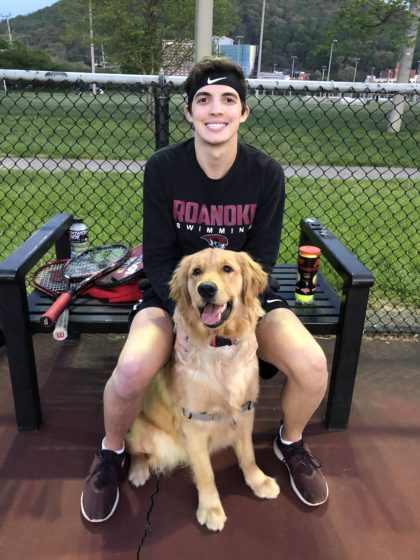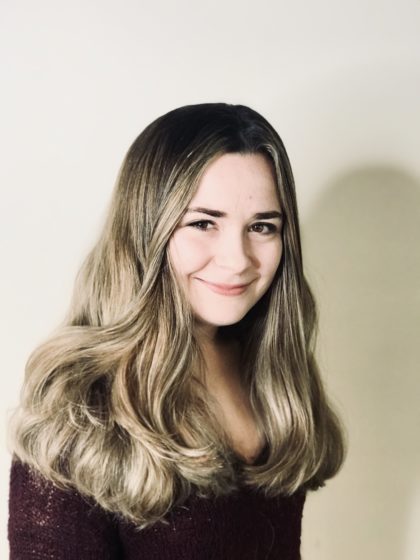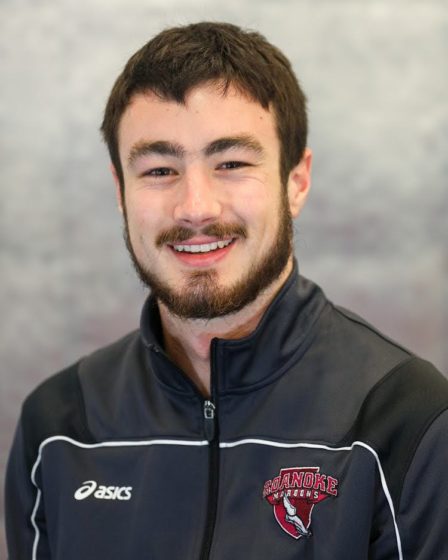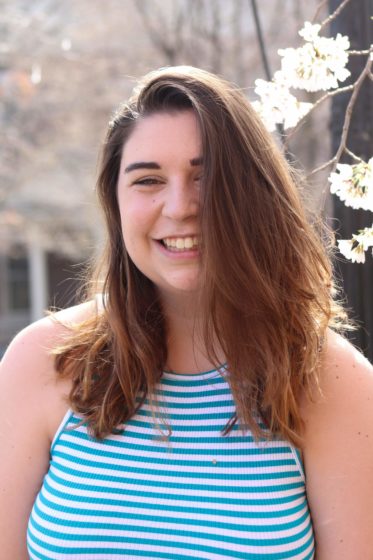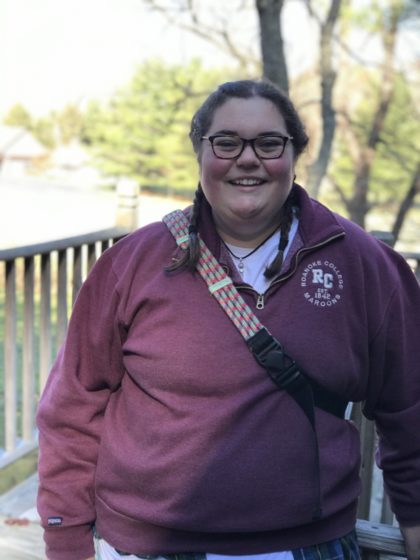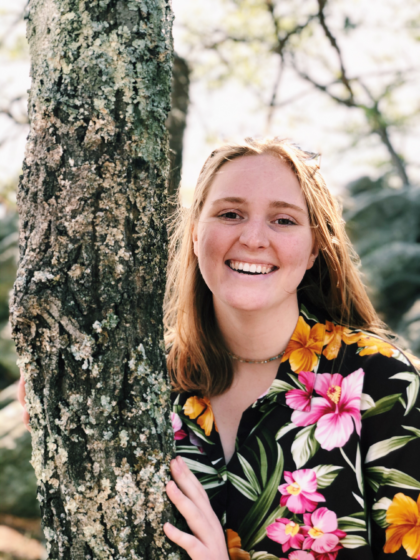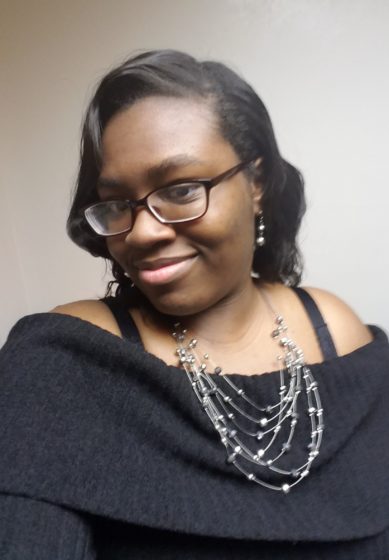Curtis Kingery, Lauren Powell, and Alex Upright (Advisor: Dr. Buchholz)
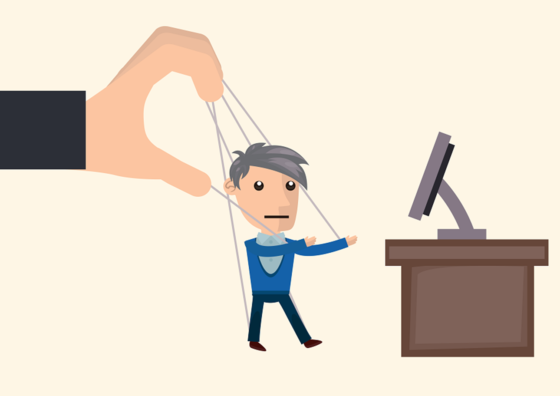
Background Information
“Genius Grant” award winner Angela Duckworth recently asked, “What is the single most significant choice a human being can make in their life?” Distinguished Psychology researcher David Buss responded, “The selection of a long-term mate.” Since he is esteemed for research in human mating, he might be biased to answer that way. However, it is undeniable that mating is a critical part of human existence. In mate selection, most traits and qualities are considered essential by both sexes (e.g., kind, trustworthy, intelligent), yet some traits are prioritized more by one sex than the other. These differences in preferences on traits most valued in an opposite-sex partner are well documented, along with an evolutionary rationale for their existence. On average, men disproportionately favor youthfulness and physical attractiveness in female mates. Women’s preferences show an asymmetry, on average, towards a man’s ability to acquire resources (Buss, 1989; Li et al., 2002; Walter et al., 2020). These traits may vary in one’s ability to control them. That is, there may be a significant difference between the ability to control one’s level of attractiveness versus the amount of control one has over their earning potential. Prior research on this topic found just that. Traits highly associated with female mate value are perceived as less controllable, by females, relative to traits highly associated with male mate value—and their perceived controllability by men (Ben Hamida et al., 1998). However, there is individual variation within the sexes on how they perceive their control over these traits. That is, males will vary in the extent to which they perceive control over characteristics suggestive of resource acquisition ability. We sought to account for these individual differences, generally, in perceived controllability of traits and, specifically, on critical mating dimensions. (Mis)perceptions of control could inform our understanding of documented differences in human behavior between males and females.
Methods
Participants were recruited from a pool of current students attending Roanoke College through the College’s Psychology department SONA system, primarily students enrolled in PSYC 101 or INQ260-PY who were eligible for extra credit received a half-credit as compensation for the participation. There were 26 male participants and 69 female participants, for a total of 95 participants who completed the study.
Our survey was administered using Qualtrics where participants were asked to respond to a variety of different scales, including the Locus of Control, the Scale for Intrasexual Competition (specified for either male or female, depending on the participant’s indicated gender) and a controllability questionnaire. Participants in the manipulation group were shown eight images, one of a person’s body ‘before’ working out and getting fit, and the second of the same person’s body ‘after’ working out. This particular manipulation was used in order to explore the possibility of intervention where countermessaging could increase people’s perceptions of control of traits that they wish to improve. Participants were also asked demographic questions such as gender identity and sexual orientation.
Results and Discussion
We expected to find a relationship between one’s level of intrasexual competitiveness and their perceived controllability of myriad traits. Although the relationship wasn’t strong enough to make any reliable conclusions, we did see a reduction in perceived controllability as participants, on average, increased in intrasexual competitiveness. See figure 1.
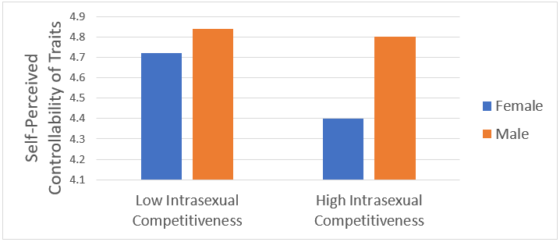
Figure 1: The effect of intrasexual competitiveness and sex on self-perceived controllability
Figure 1 implies that as one focuses more on competing with same-sex peers for mates, their perceptions of control over their traits could be influenced by that preoccupation.
Similarly, we expected our experimental manipulation, where half of the participants saw body transformation images, to increase that group’s average perception of controllability. We did not find evidence for this relationship. This could mean that our manipulation wasn’t strong enough or it could imply that perceptions of controllability may be stable traits within individuals that are unlikely to be influenced in this manner.
As predicted, we did find that males and females, on average, showed substantial differences in their general perceptions of controllability of traits. See figure 2.
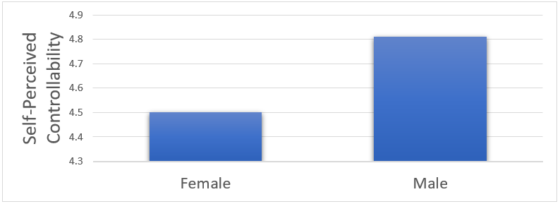
Figure 2: Self-perceived controllability of traits by sex
Moreover, we found a statistically significant result for differences in males’ and females’ perceptions of controllability, specifically on the dimensions regarded as critical to men when choosing a female mate. That is, traits related to youthfulness and attractiveness were considered more controllable by men than women. There was no evidence for these sex differences on perceptions of controllability for resource acquisition traits. These sex differences in perceptions of controllability could inform our understanding of behaviors that show increased or decreased occurrence in one sex versus the other (e.g., mate preferences, risk-taking, aggression, jealousy, and several psychological disorders such as depression and eating disorders).
Reflection
Unfortunately, while we were unable to find a strong enough relationship between competitiveness and controllability to make any conclusions, we were still able to determine a statistically significant difference in males’ and females’ perception of how well they can control their youthfulness and attractiveness.
Conclusion
We are all different people with different experiences and lives. There is no need to stress unnecessarily about being as attractive or successful as possible for fear of missing out on the perfect spouse. There is no need to compare yourself to others or feel that you must complete with them to find “the perfect mate.” Be patient, focus on the things that will not be changed by time, such as humor or personality, and make sure that you can be the best you can be, and the right person will be there at the right time.
References
Ben Hamida, S., Mineka, S., & Bailey, J. M. (1998). Sex differences in perceived controllability of mate value: An evolutionary perspective. Journal of Personality and Social Psychology, 75(4), 953–966. https://doi.org/10.1037/0022-3514.75.4.953
Buss, D. M. (1989). Sex differences in human mate preferences: Evolutionary hypotheses tested in 37 cultures. Behavioral and Brain Sciences, 12, 1–14. doi:10.1017/ S0140525X00023992
Li, N. P., Bailey, J. M., Kenrick, D. T., & Linsenmeier, J. A. W. (2002). The necessities and luxuries of mate preferences: Testing the tradeoffs. Journal of Personality and Social Psychology, 82(6), 947–955. https://doi.org/10.1037/0022-3514.82.6.947
Walter, K. V., Conroy-Beam, D., Buss, D. M., Asao, K., Sorokowska, A., Sorokowski, P., Aavik, T., Akello, G., Alhabahba, M. M., Alm, C., Amjad, N., Anjum, A., Atama, C. S., Atamtürk Duyar, D., Ayebare, R., Batres, C., Bendixen, M., Bensafia, A., Bizumic, B., … Zupančič, M. (2020). Sex differences in mate preferences across 45 countries: A large-scale replication. Psychological Science, 31(4), 408–423. https://doi.org/10.1177/0956797620904154
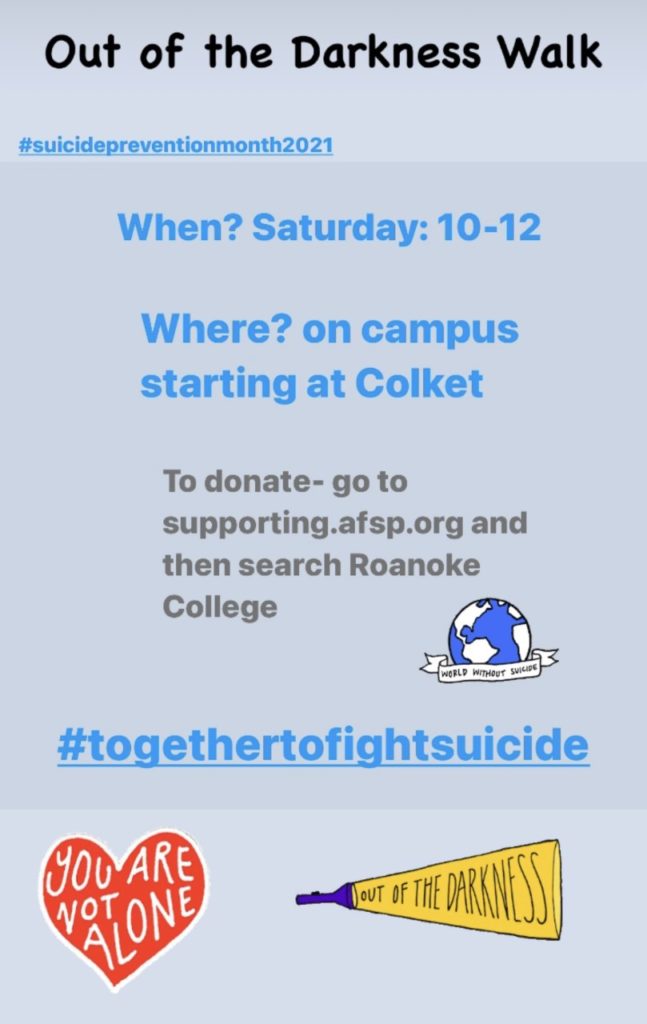
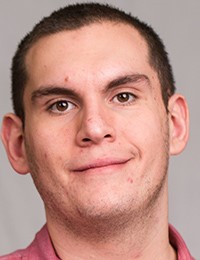
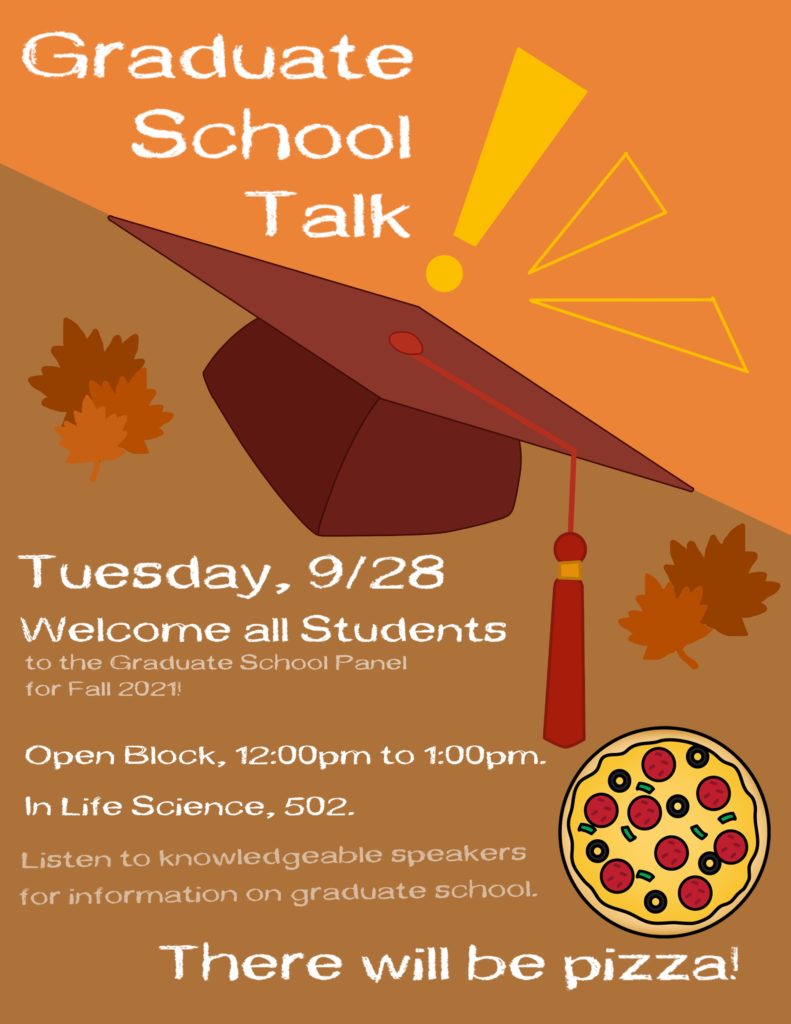
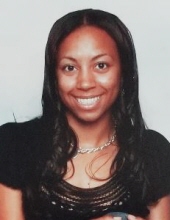
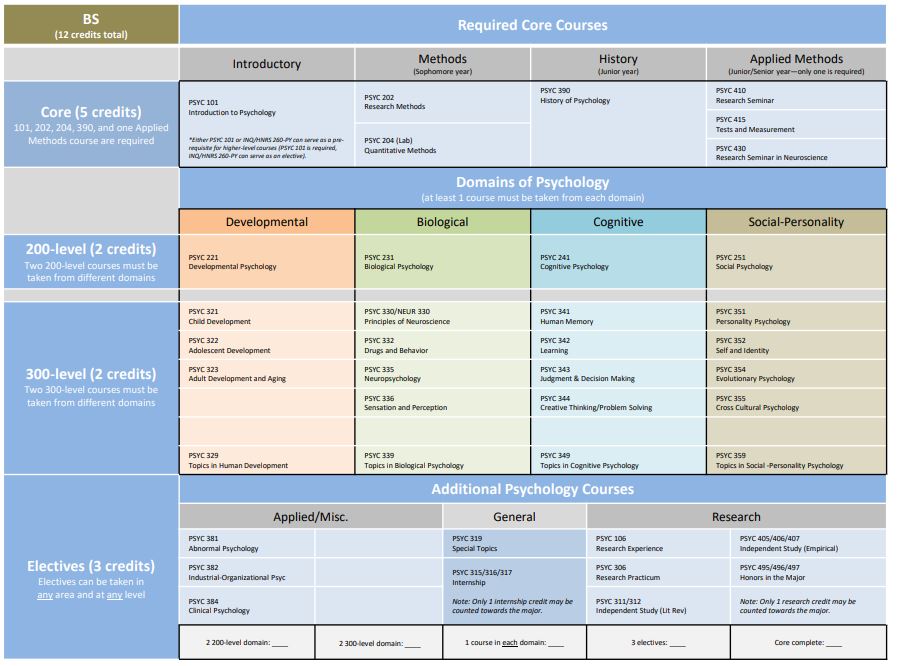
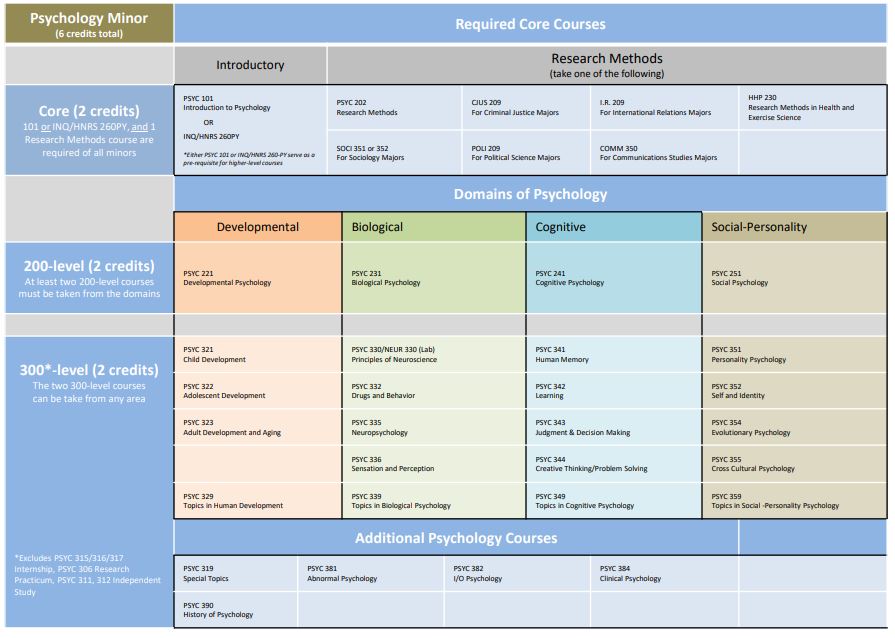
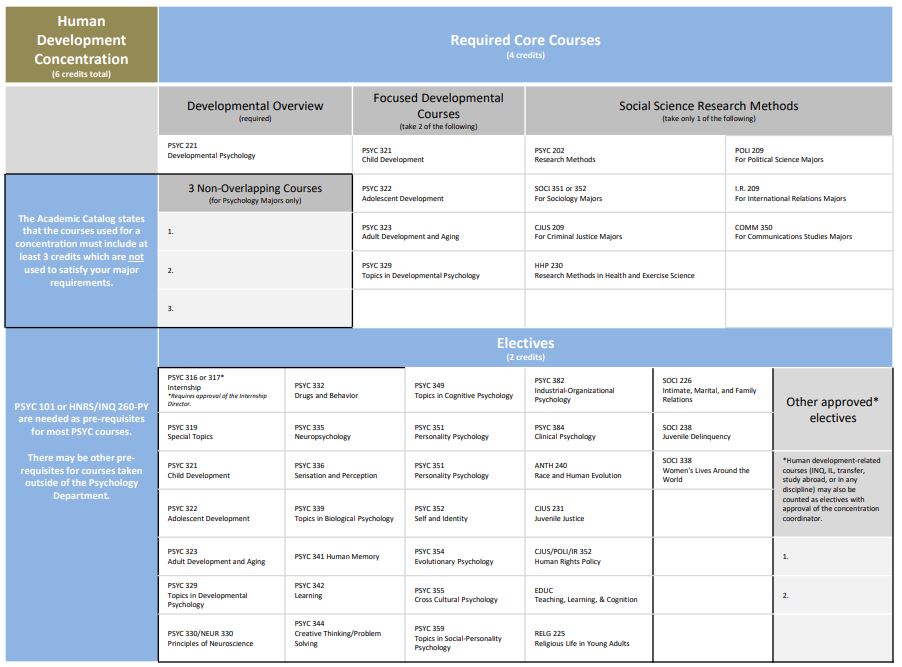
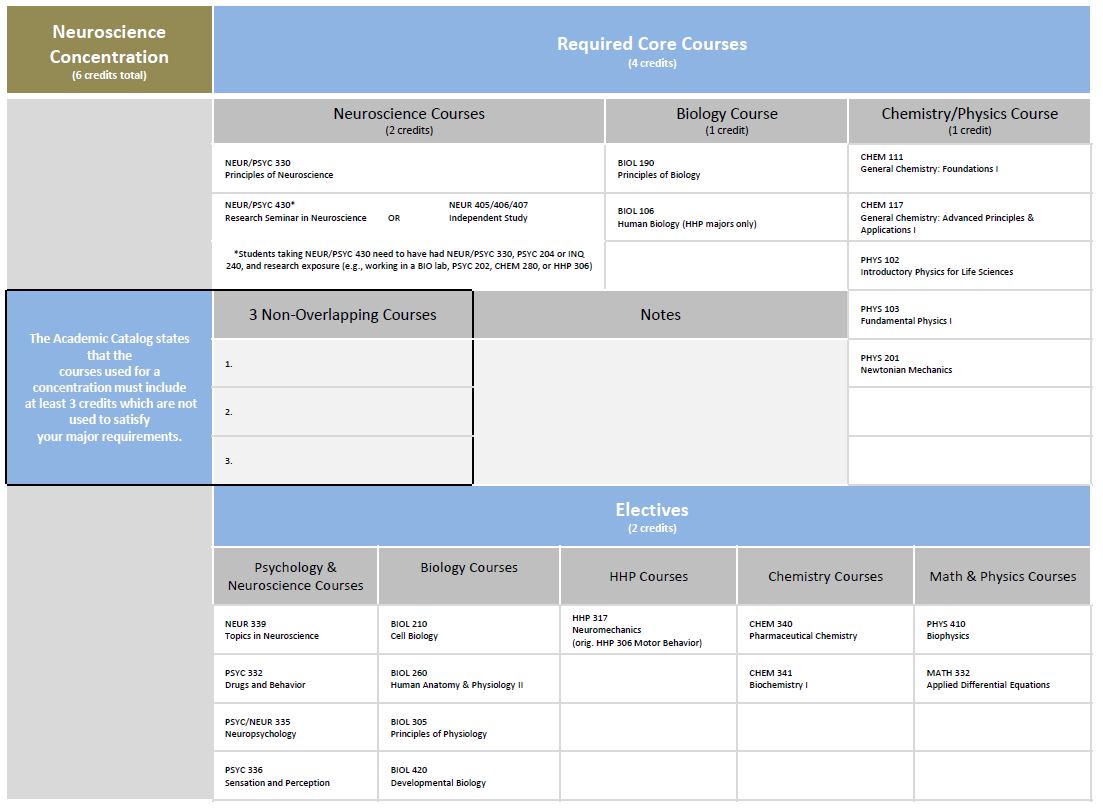
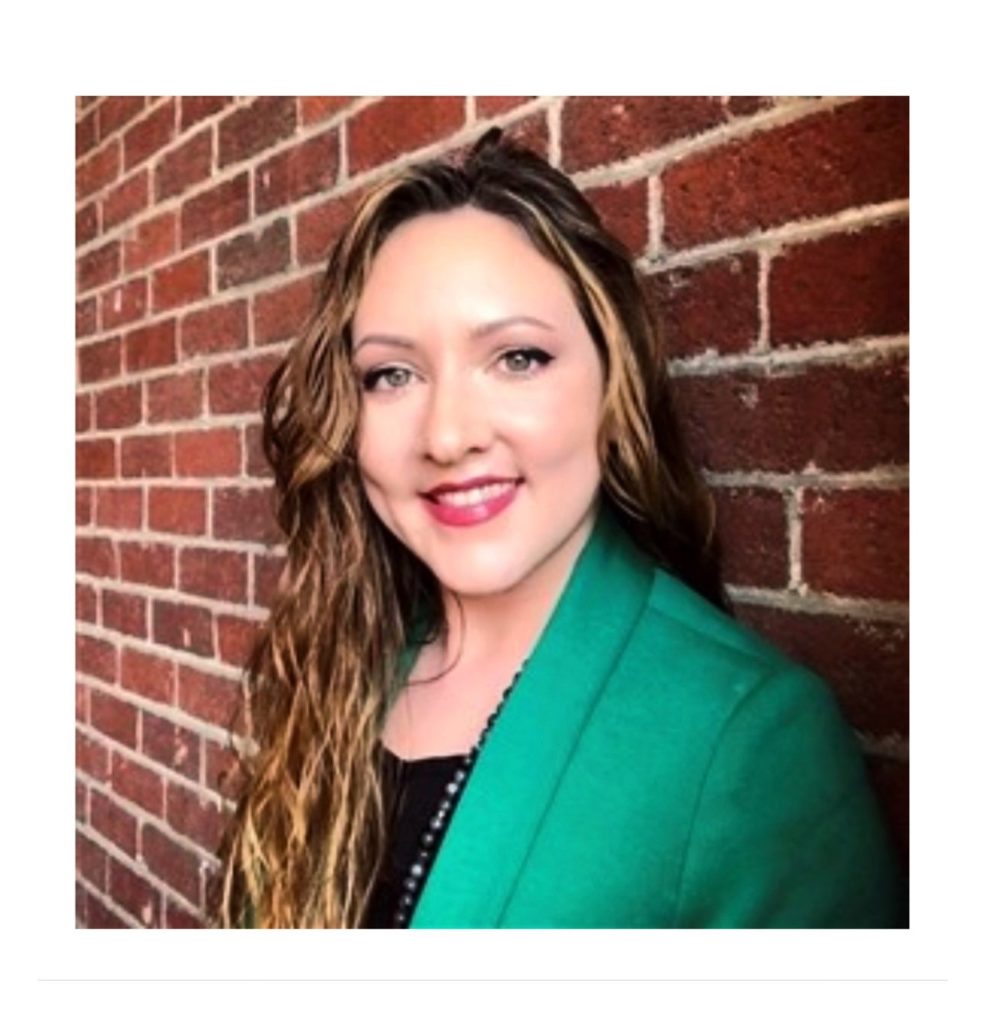
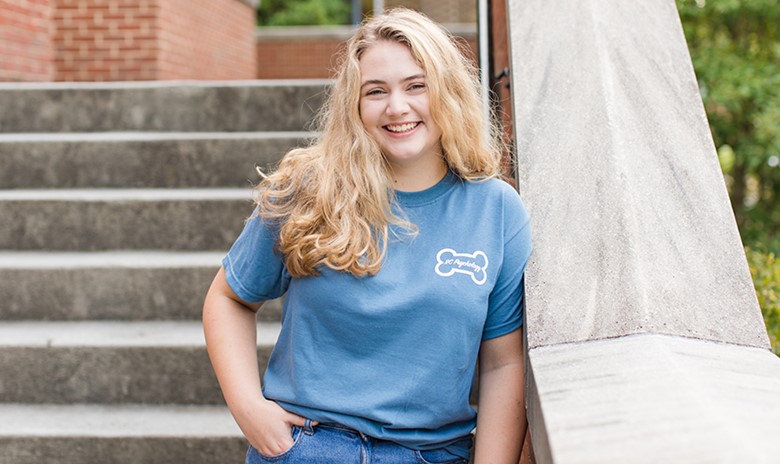
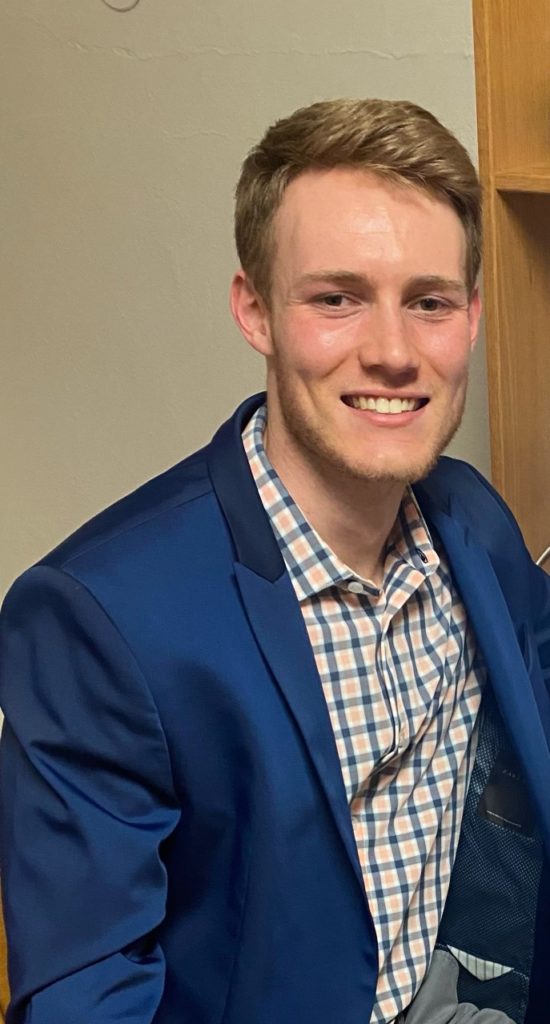
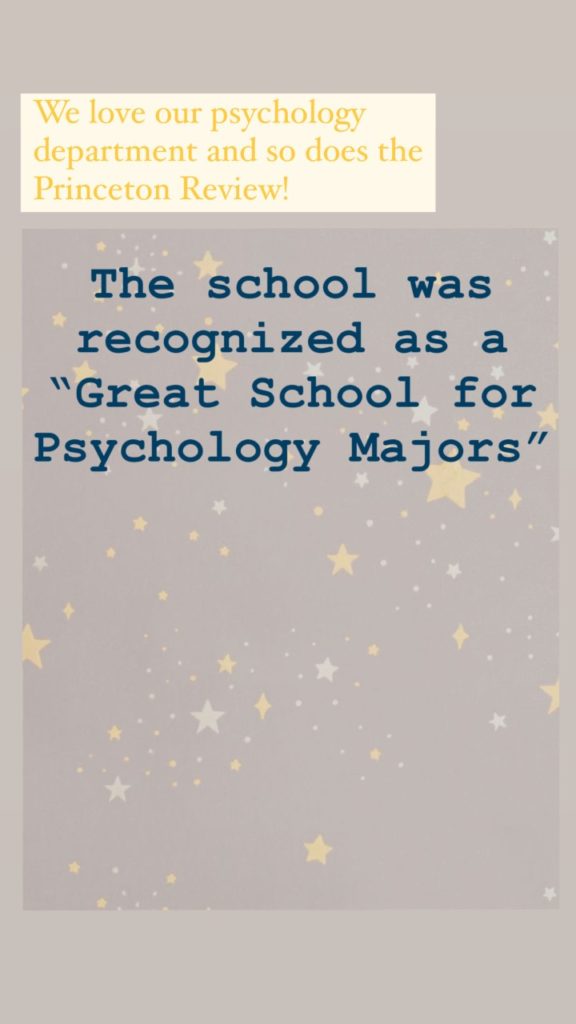
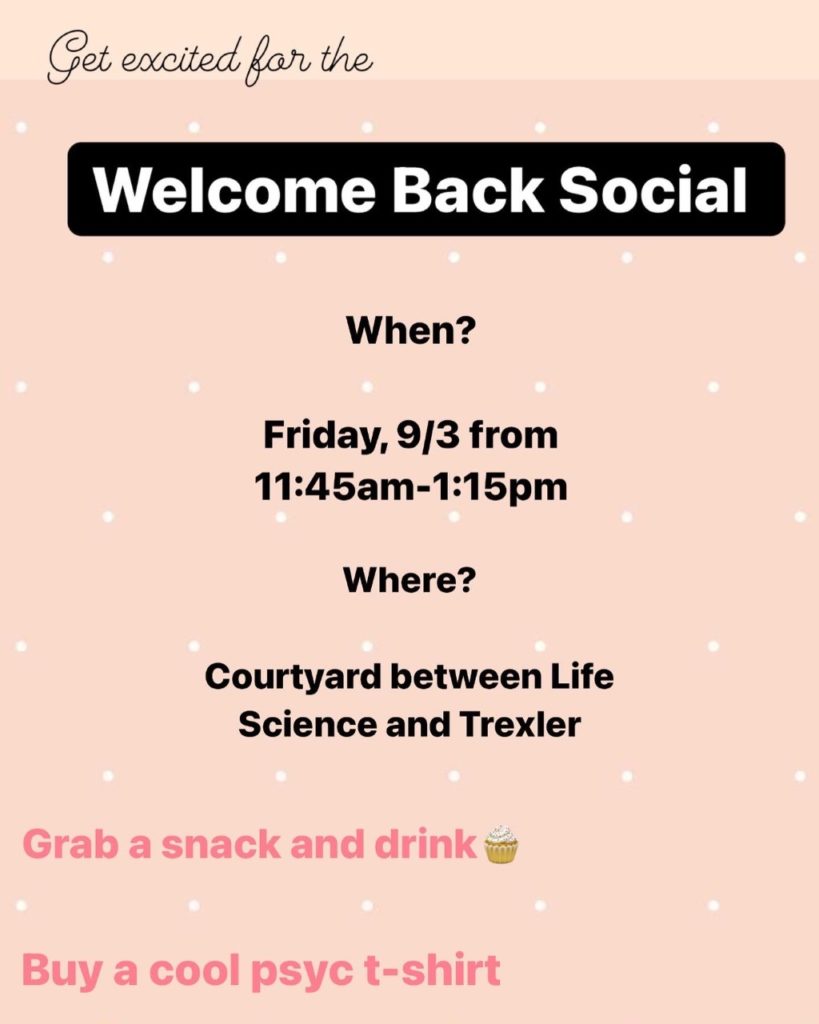
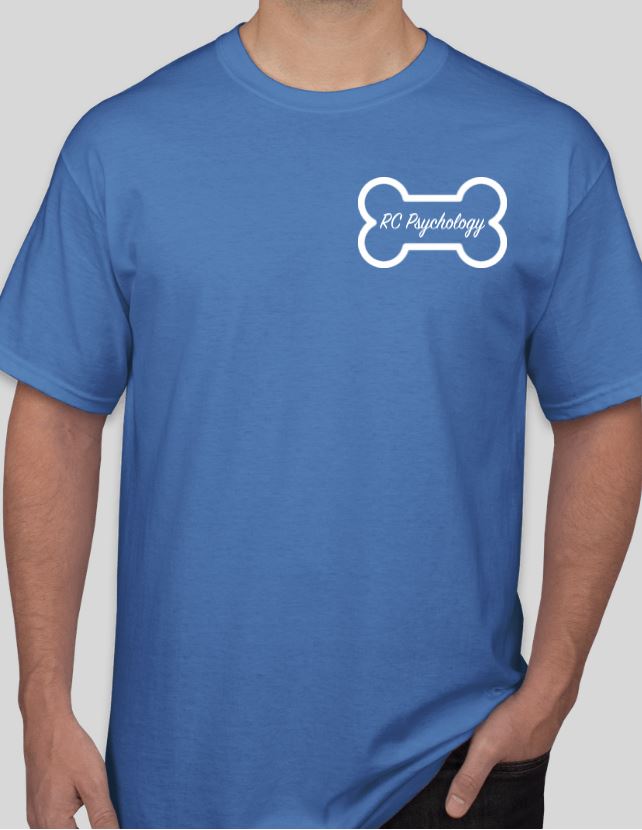
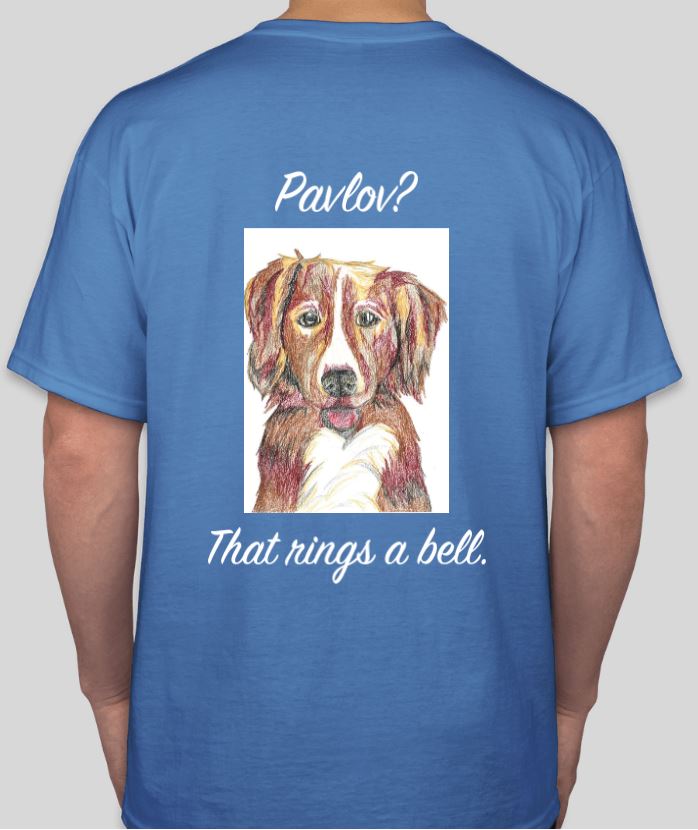
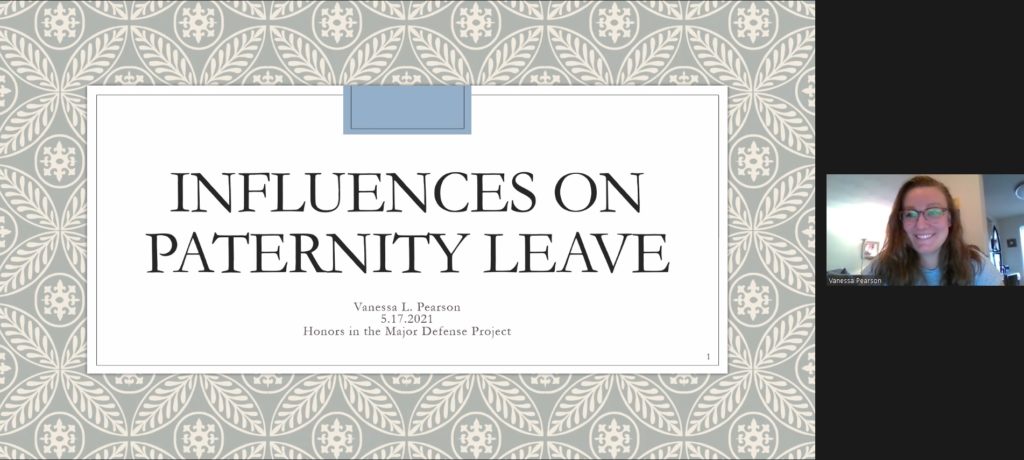
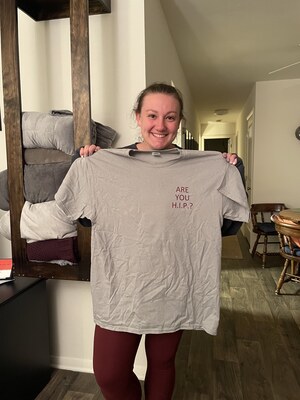
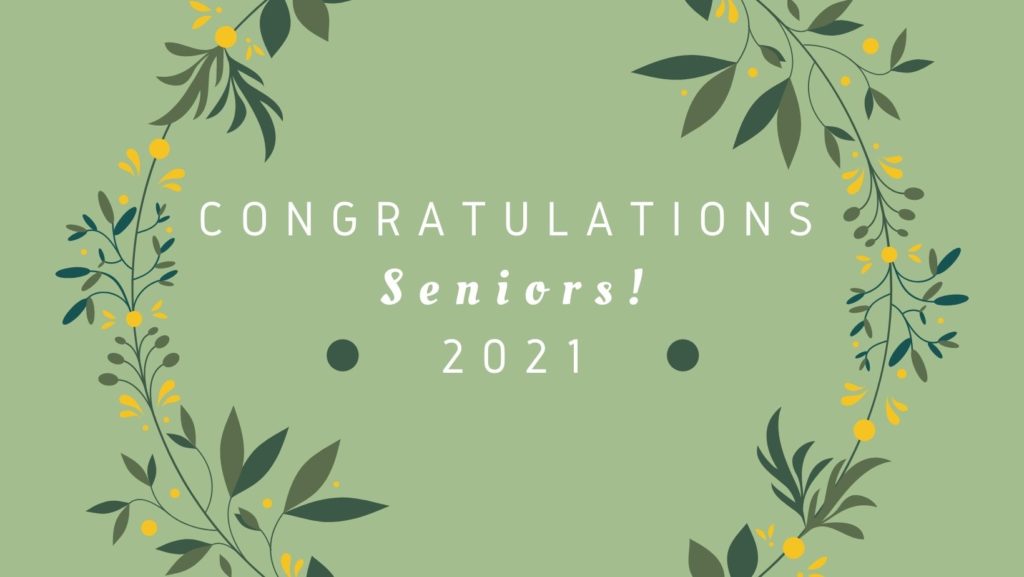
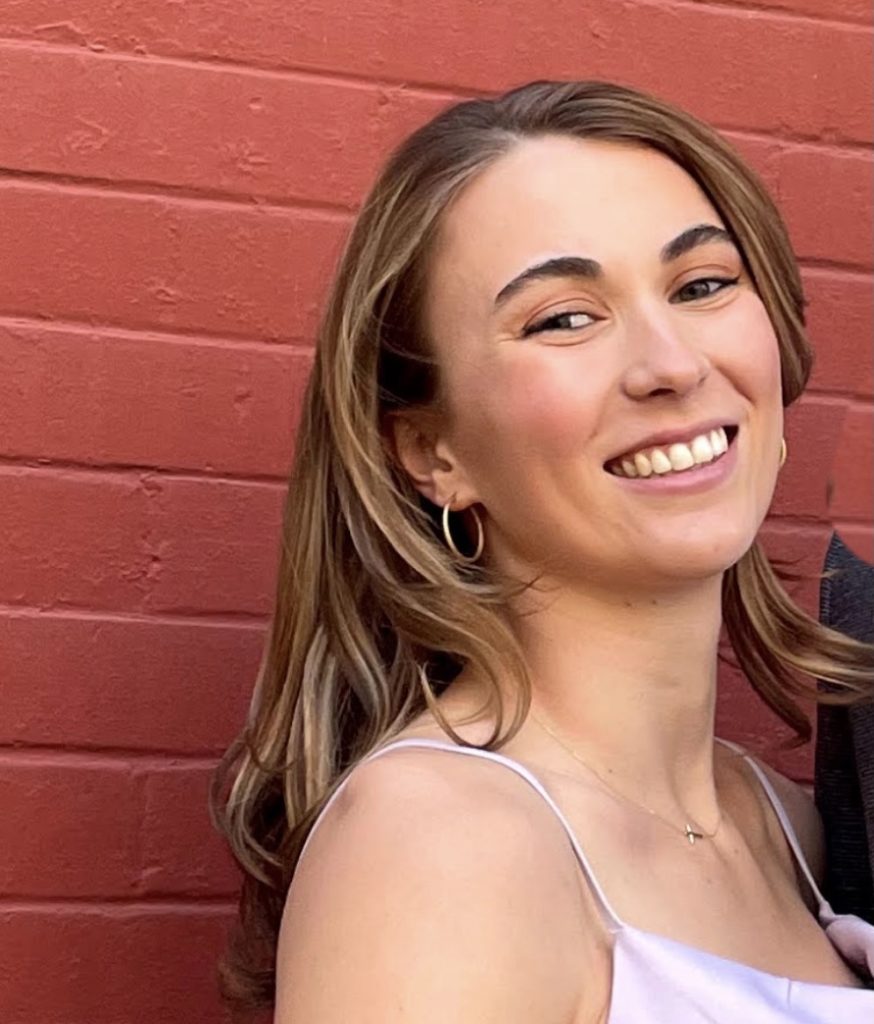
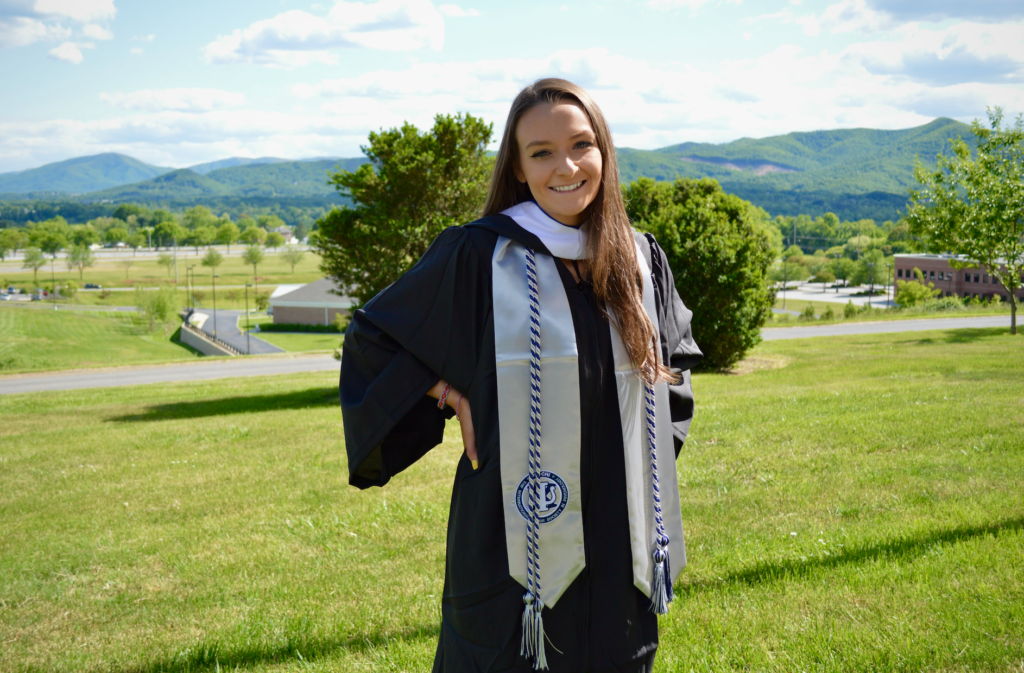
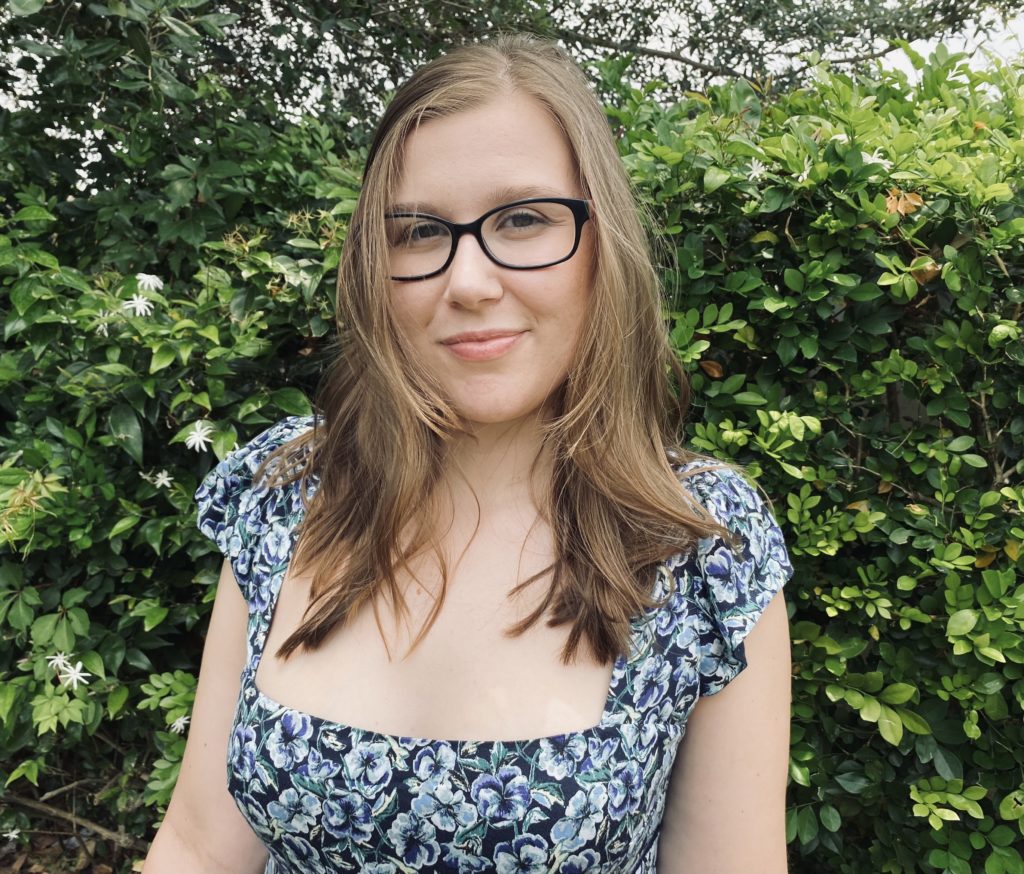
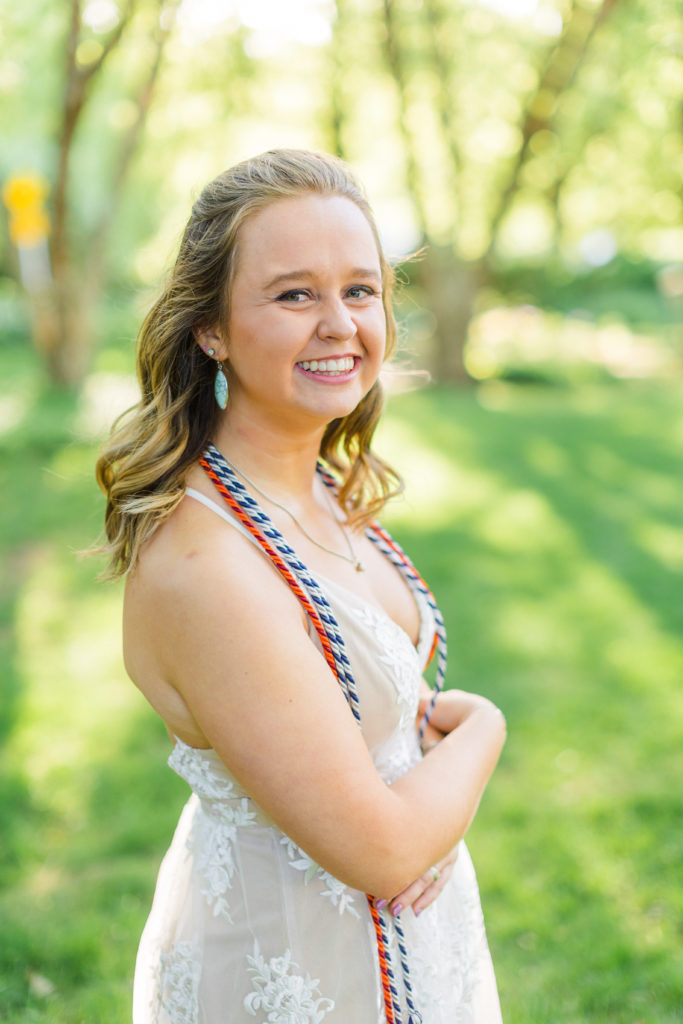
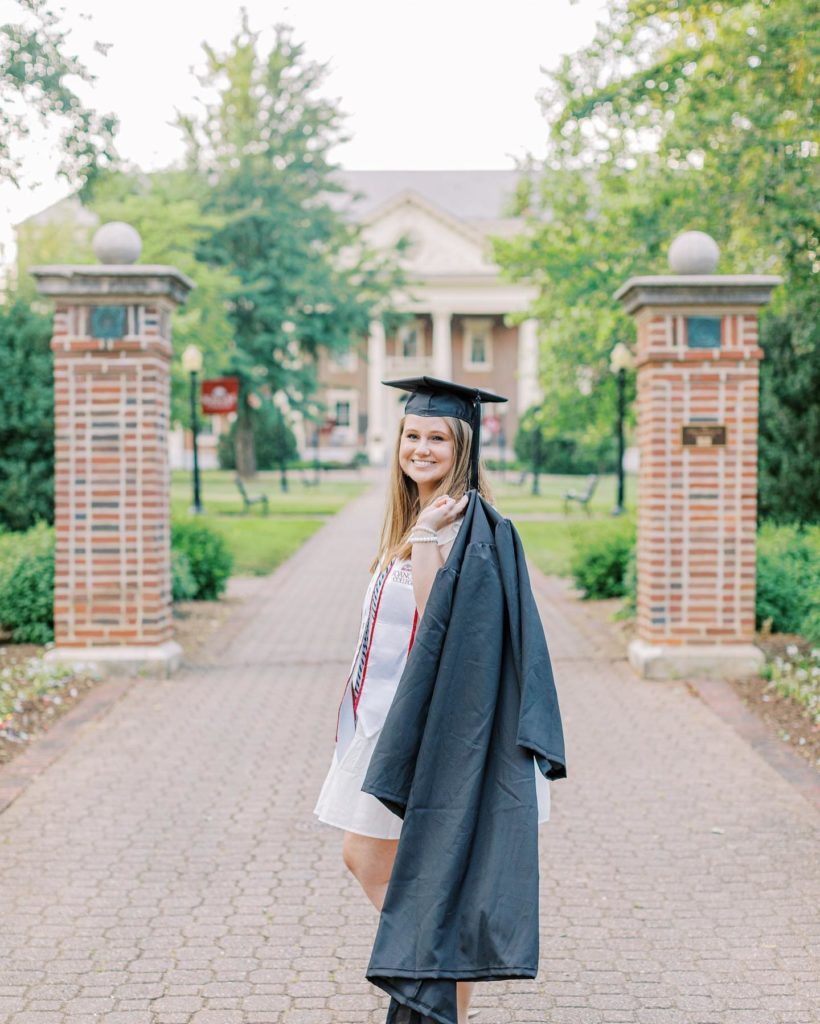
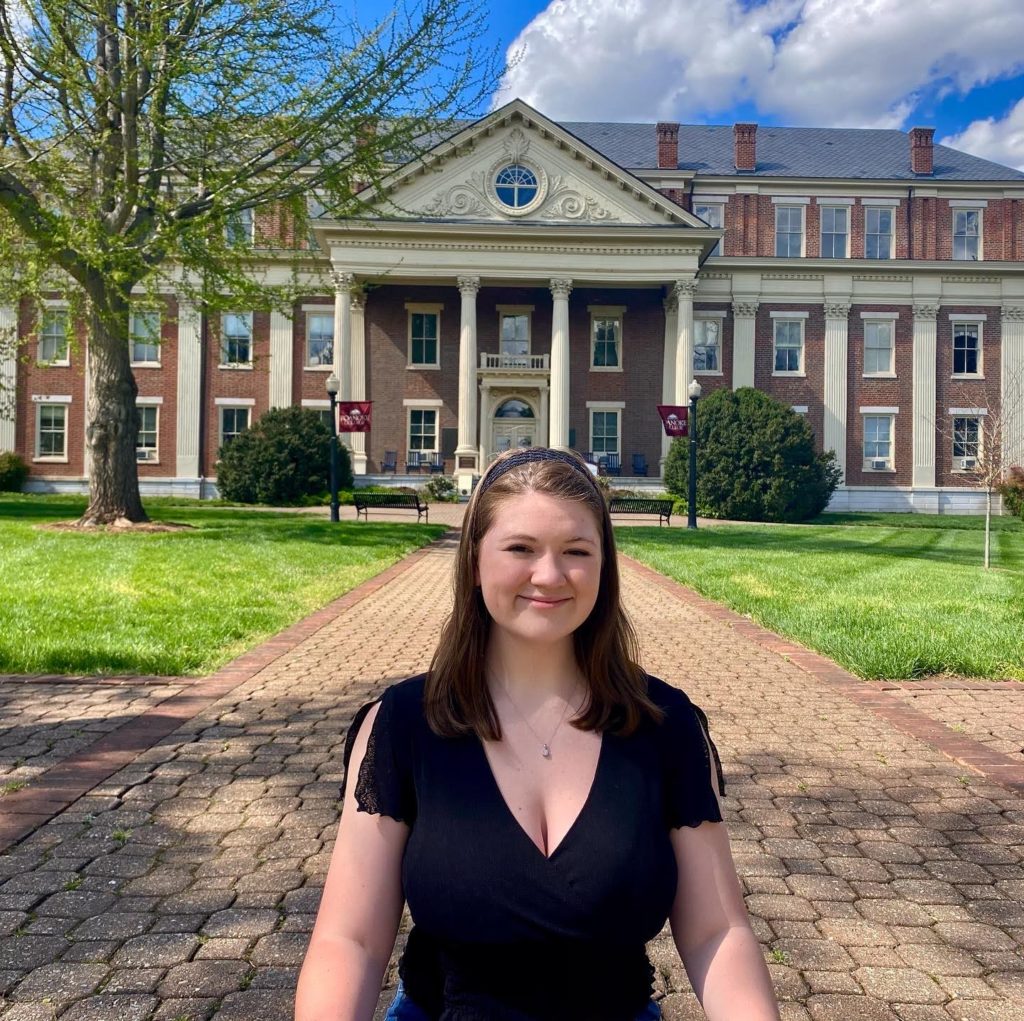
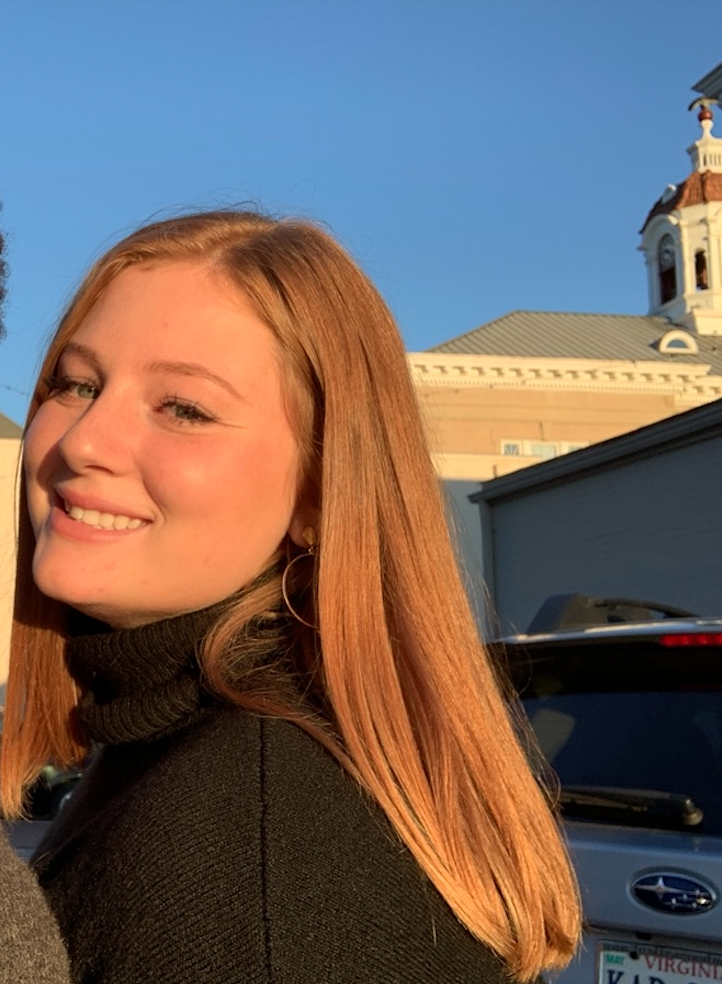
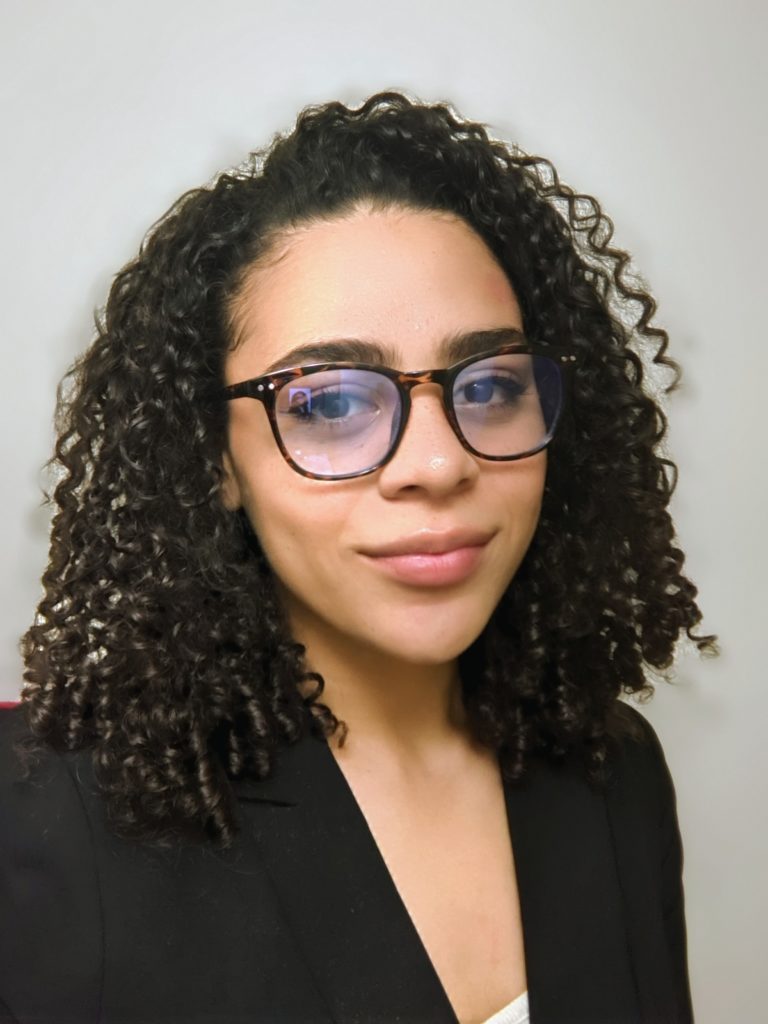
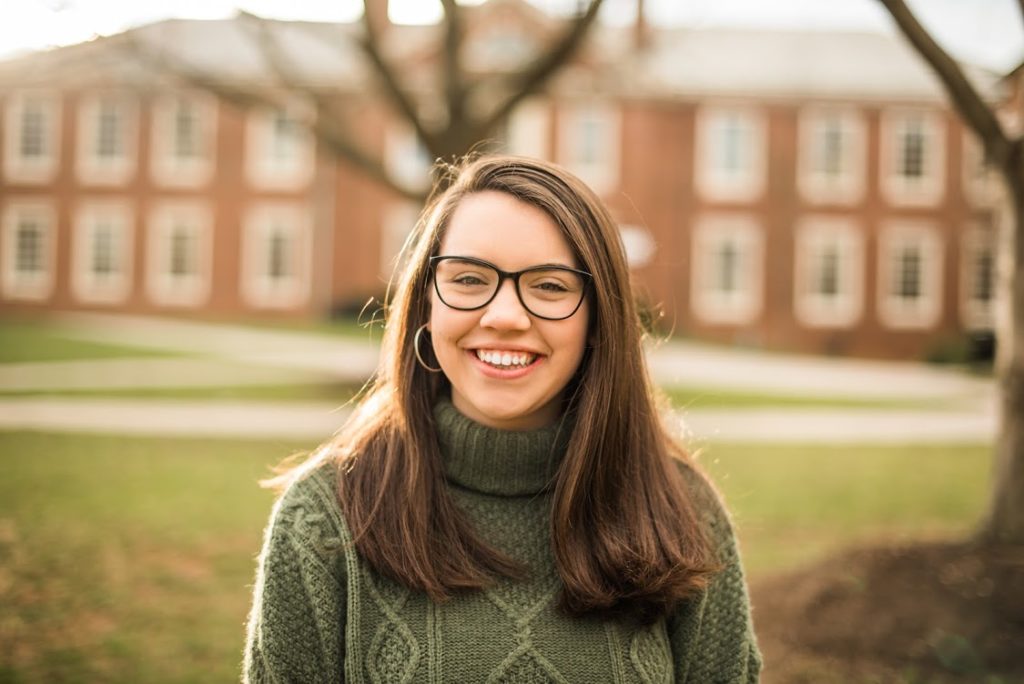
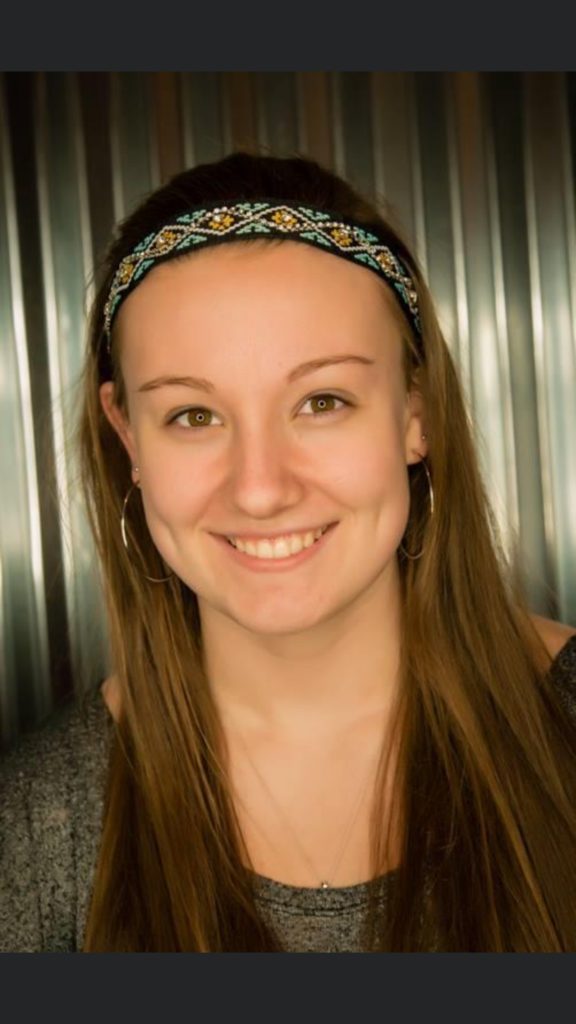
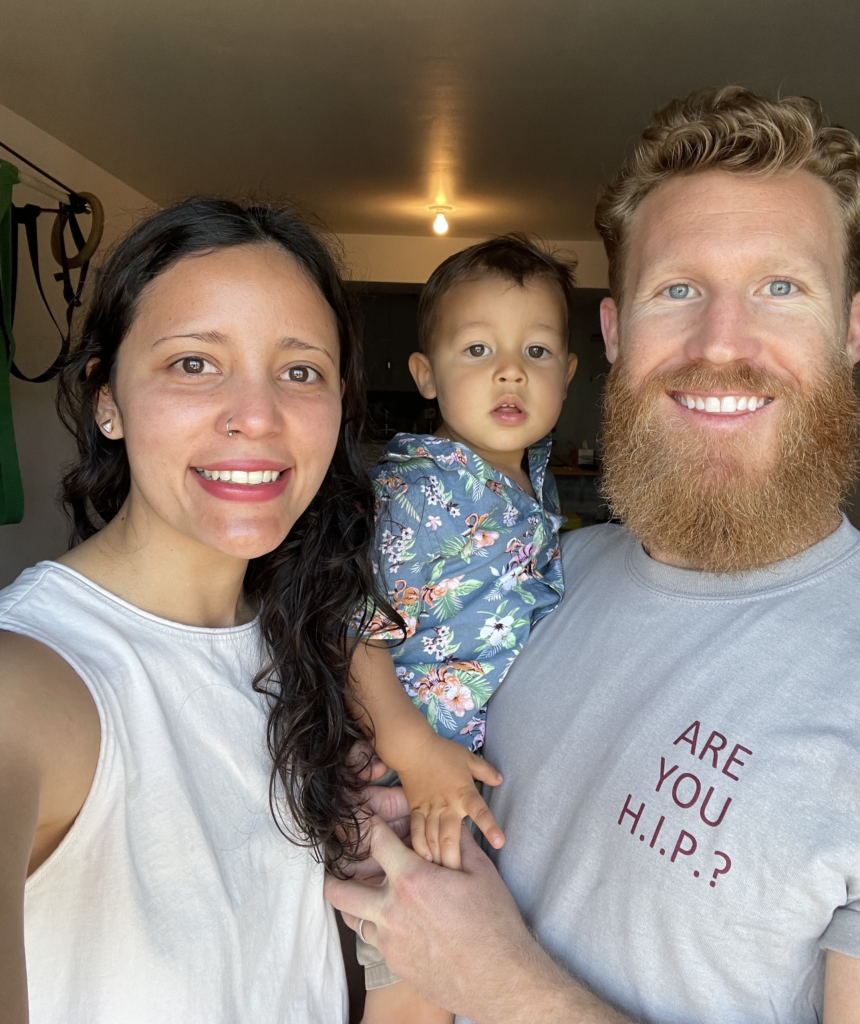
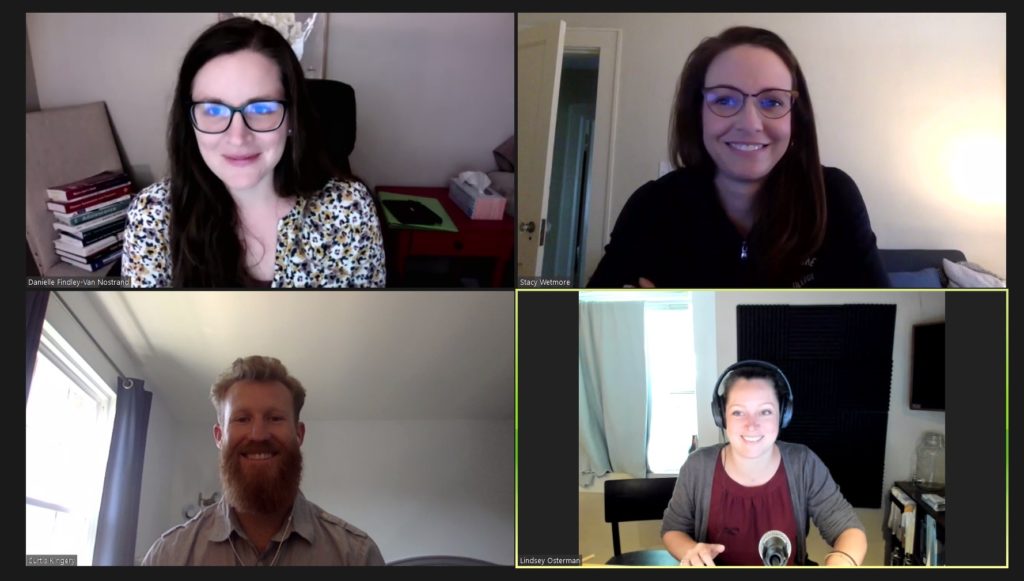
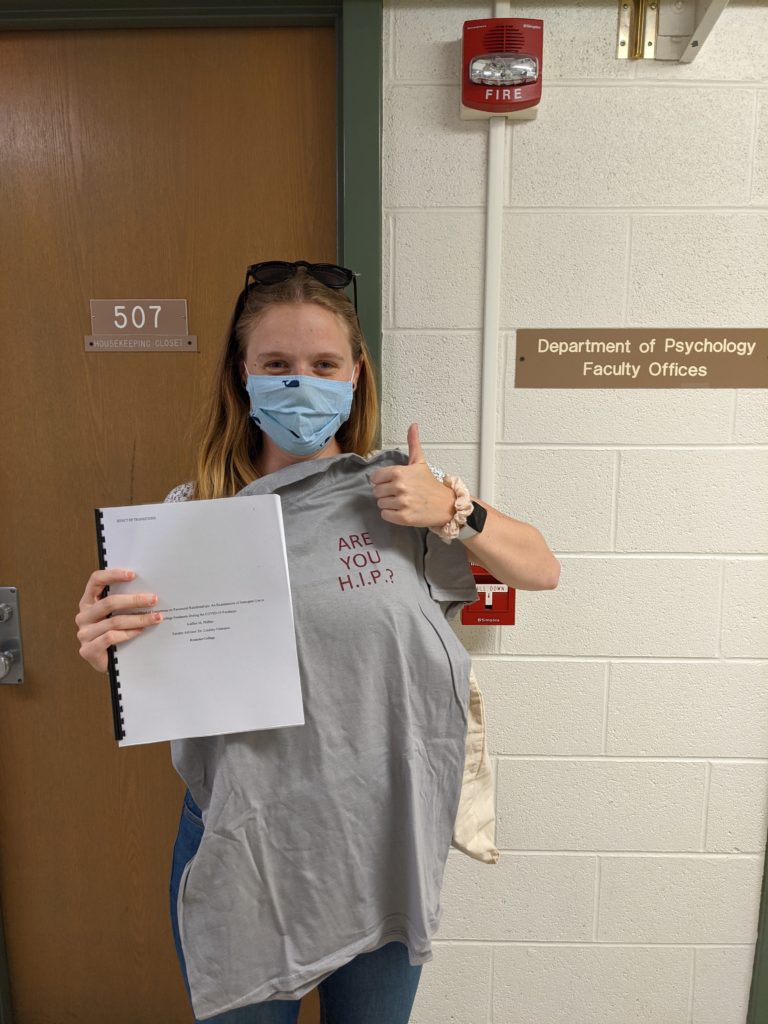
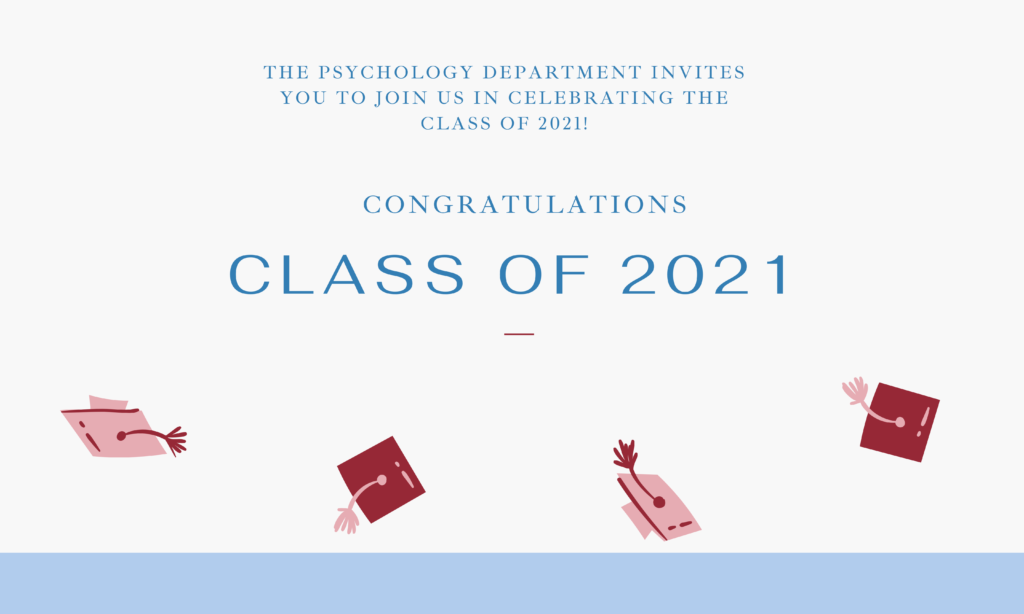
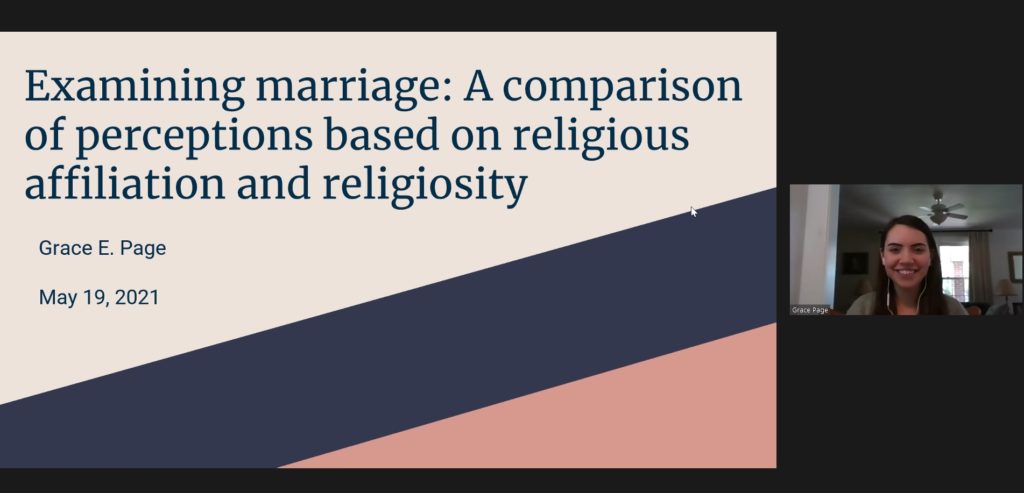
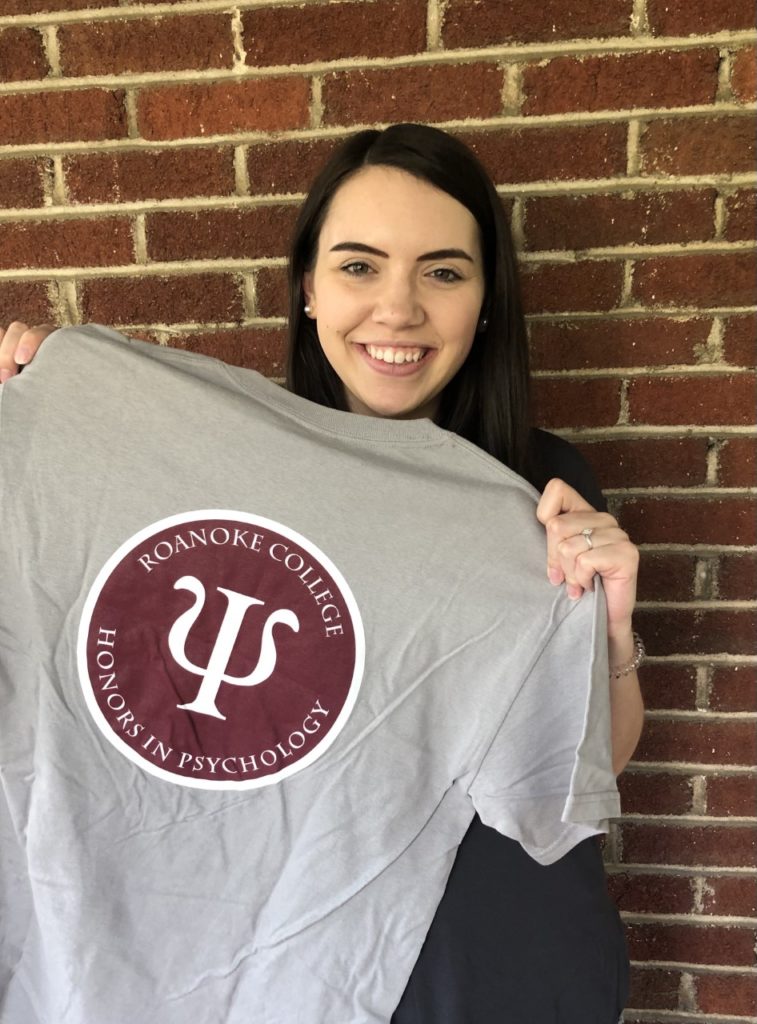
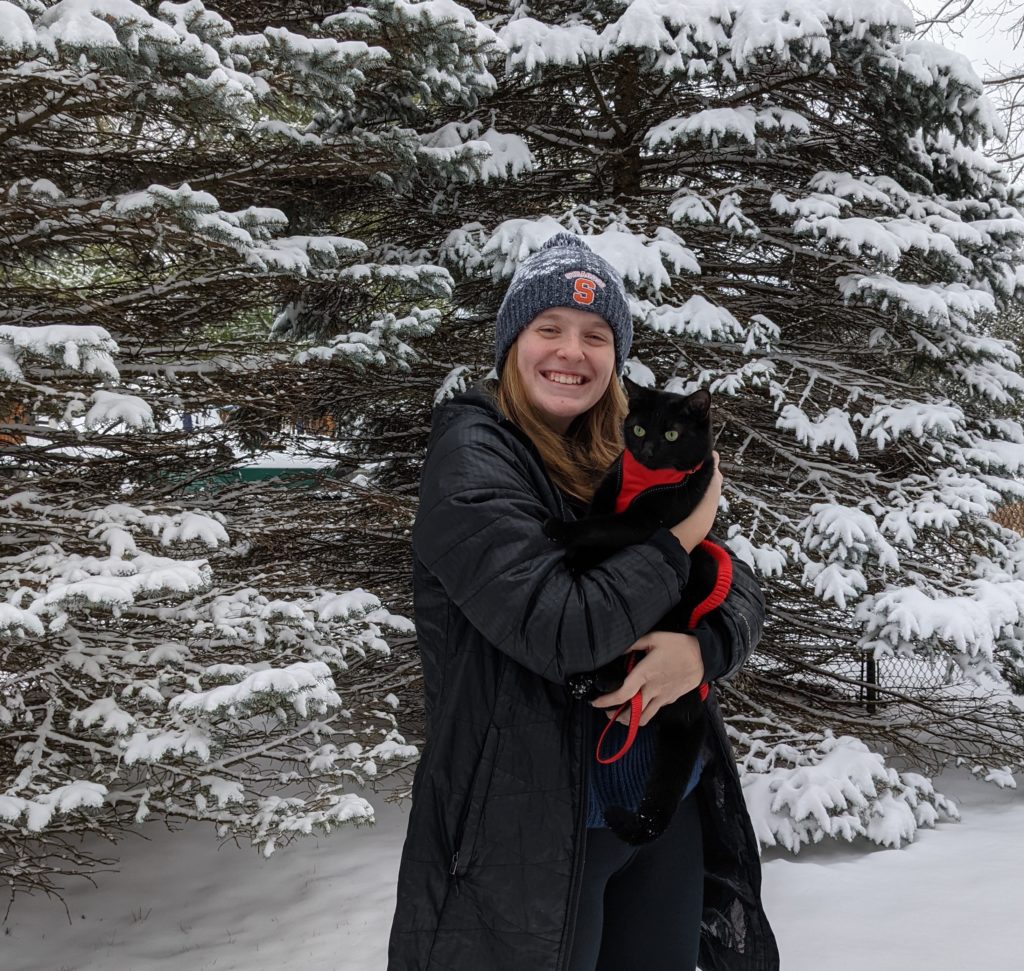
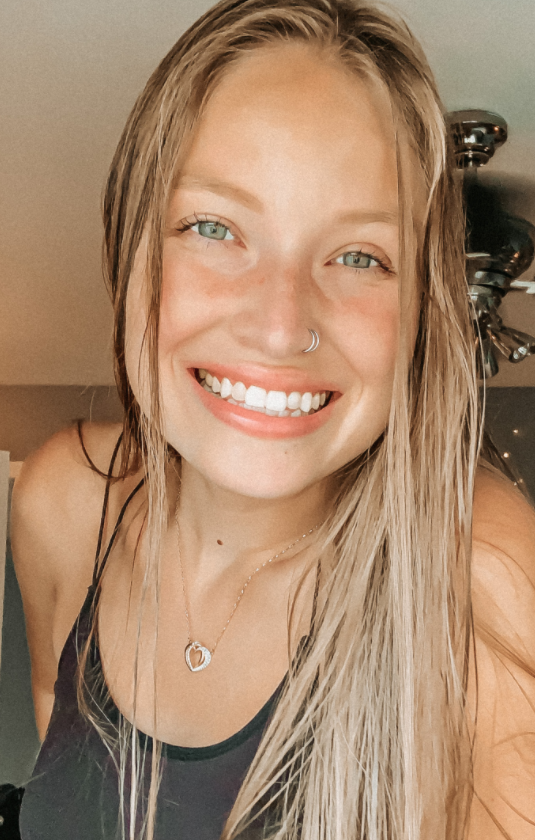
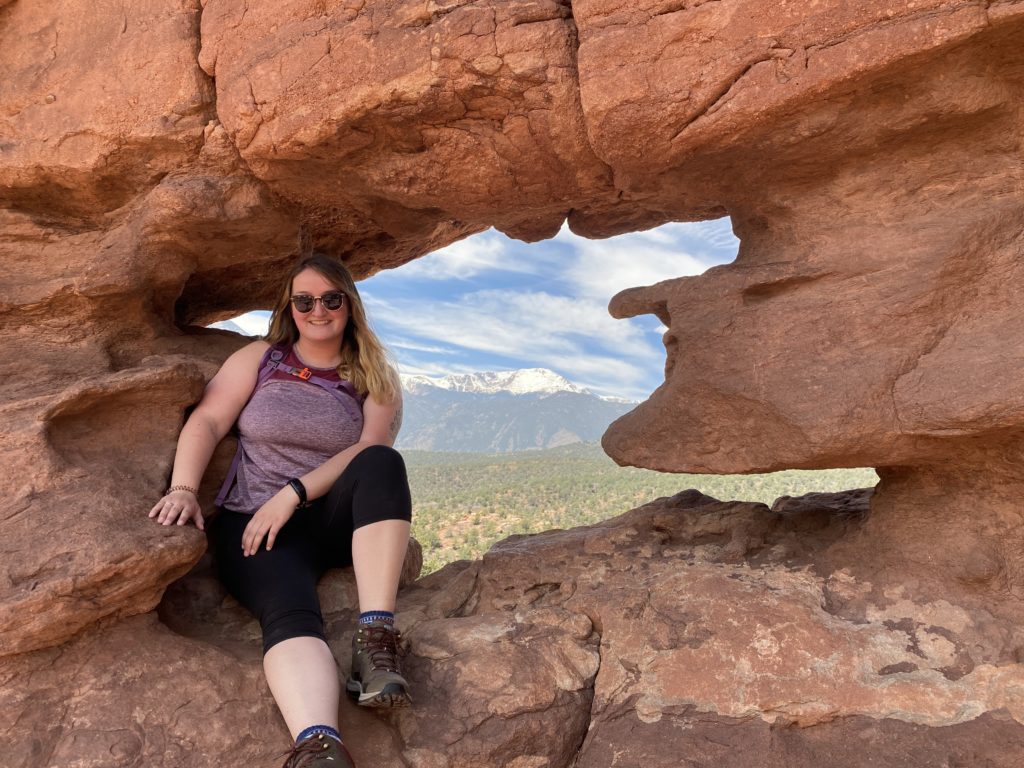
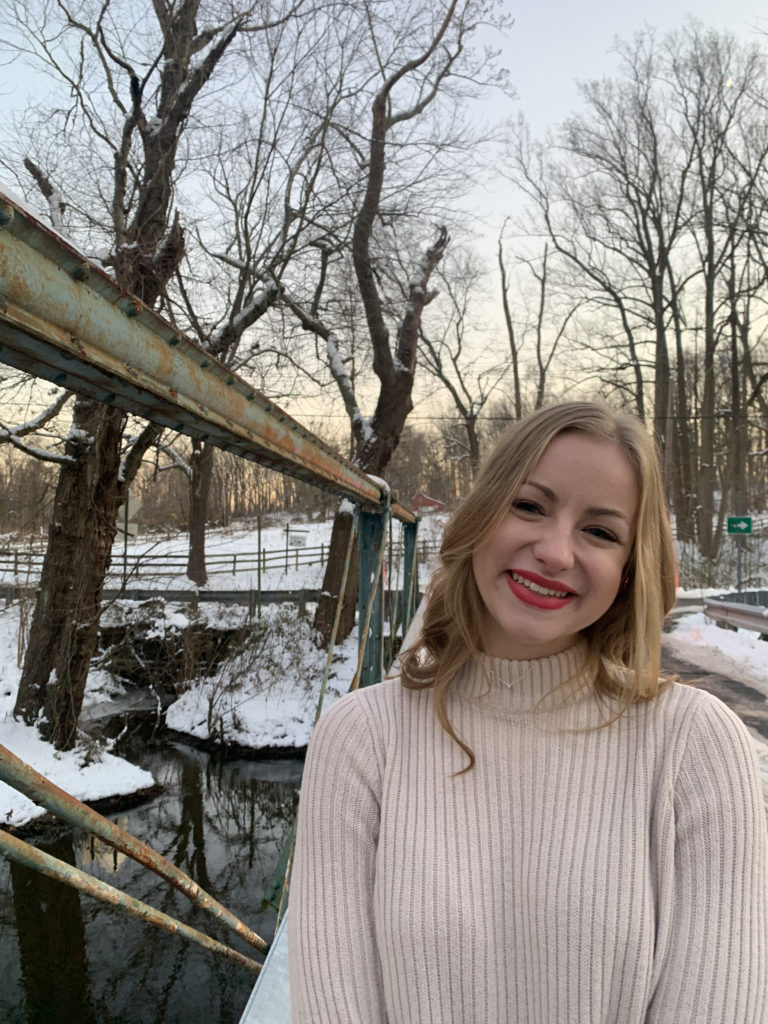

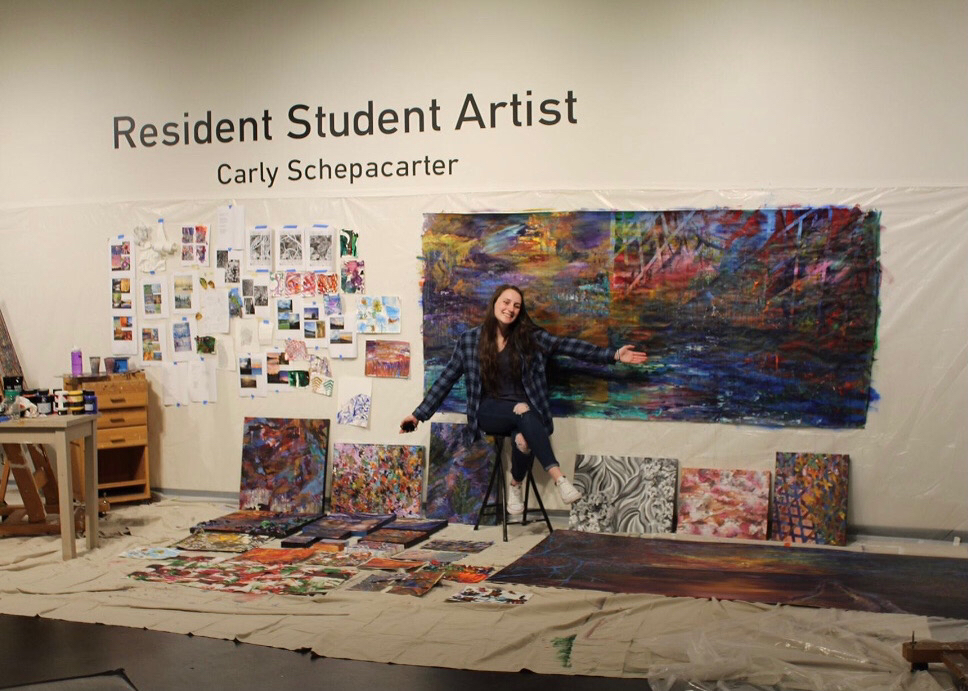
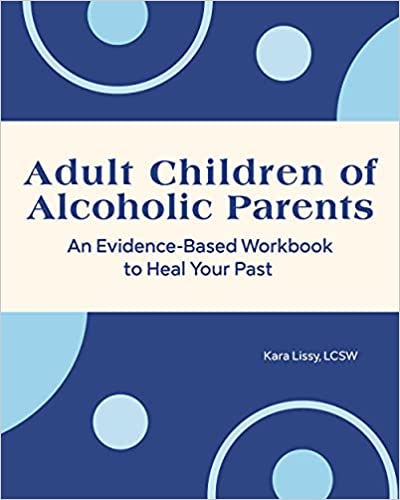

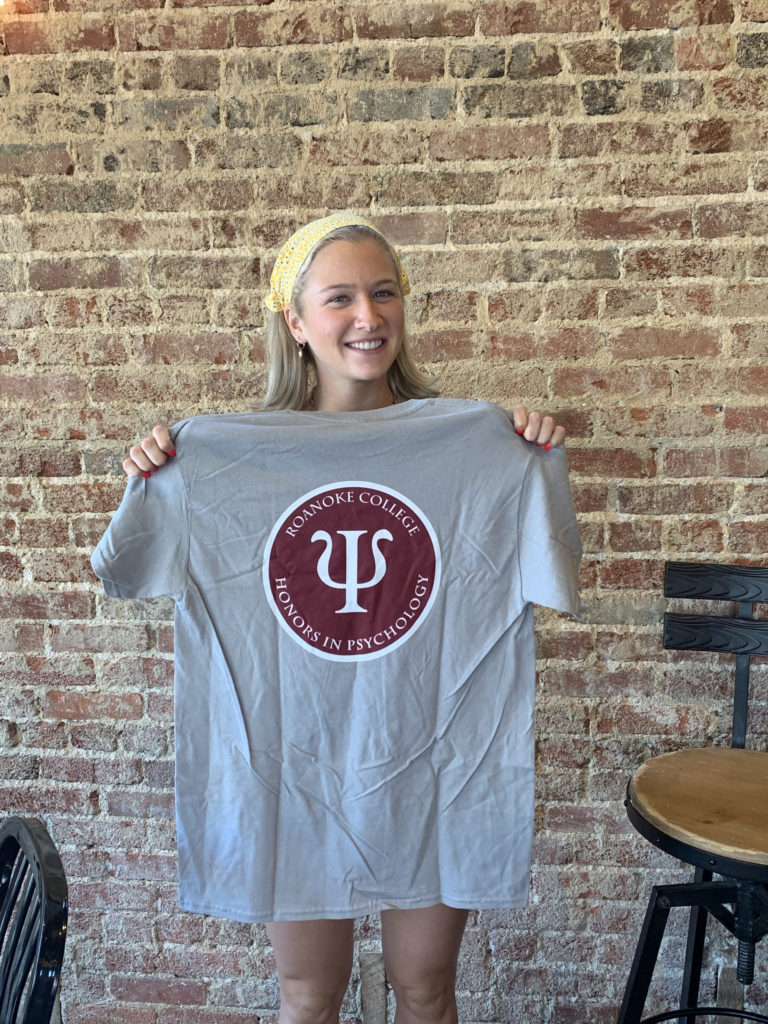
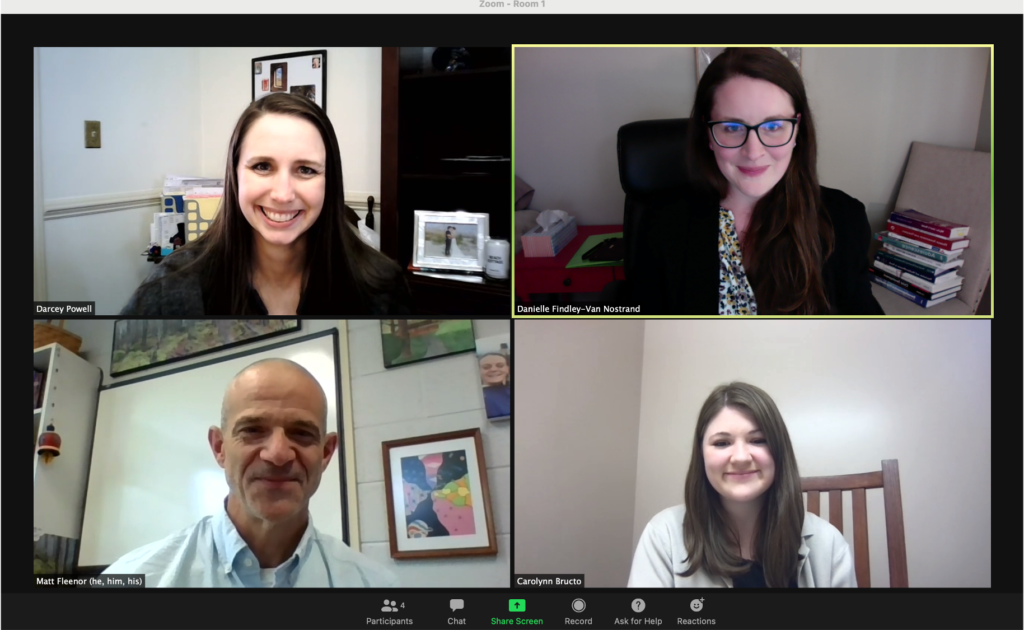
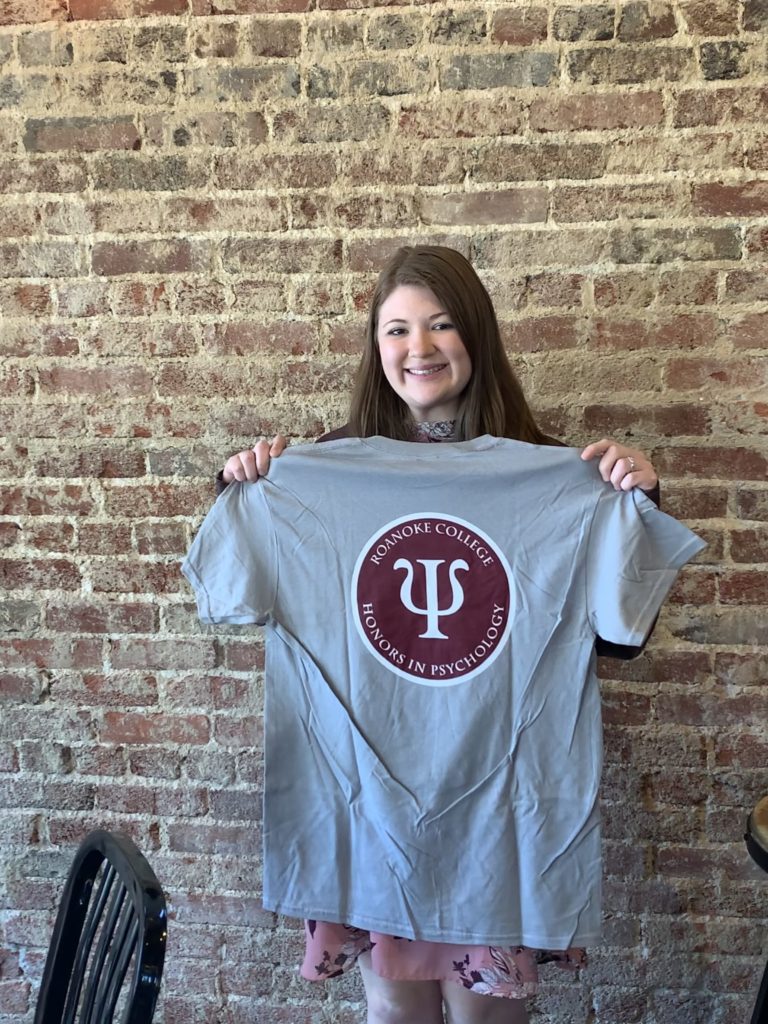
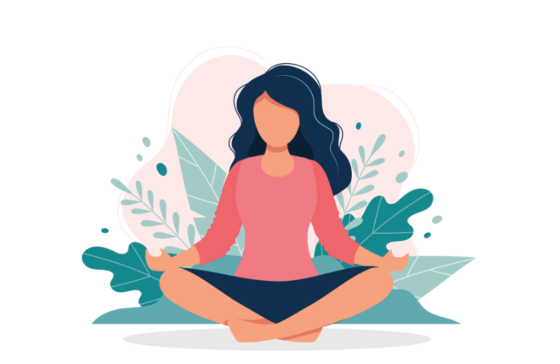
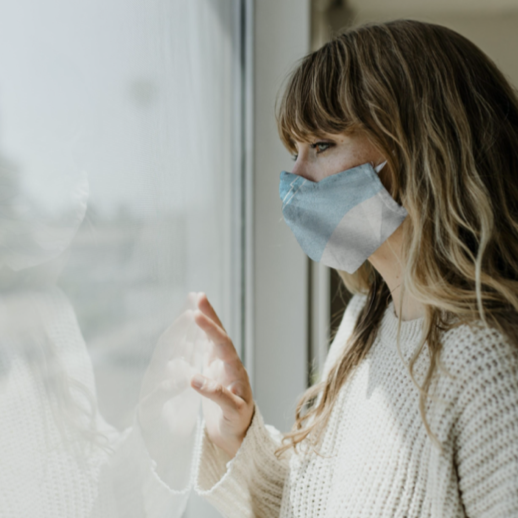

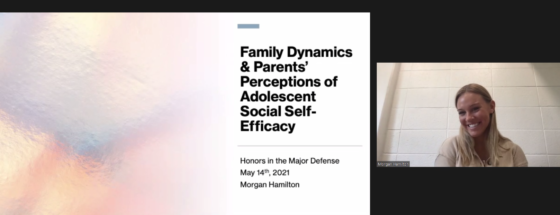
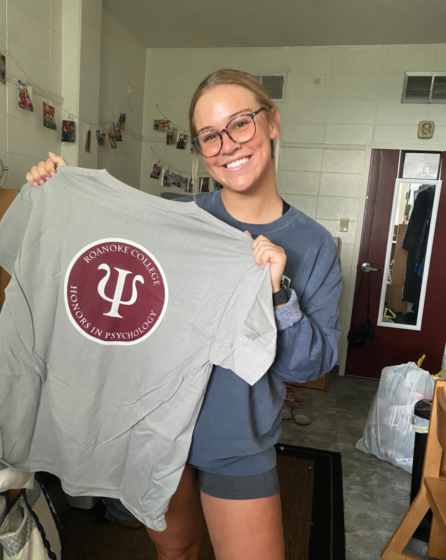
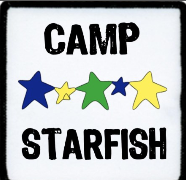
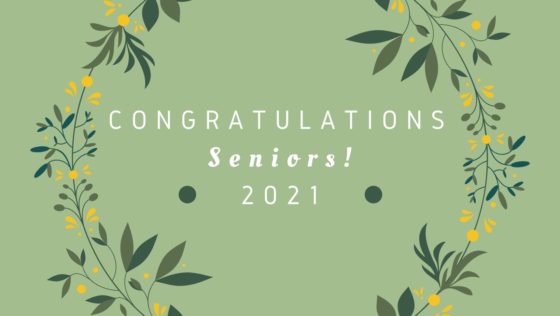 Over the next few days, we will be highlighting the Psychology Department graduating seniors! This post will highlight 4 seniors: Kira Hunt, Abbie Joseph, David Casson, and Carly Schepacarter!
Over the next few days, we will be highlighting the Psychology Department graduating seniors! This post will highlight 4 seniors: Kira Hunt, Abbie Joseph, David Casson, and Carly Schepacarter!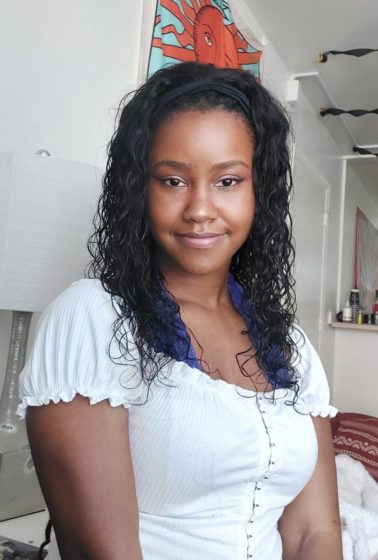 Congratulations to Kira! After graduation, she plans to take a gap year working as a teacher’s assistant while home. Then, she plans on applying to graduate programs in preparation to become a Certified Child Life Specialist. Kira’s favorite memory of the Psychology department was attending the psychology reception for alumni weekend. “It was interesting to hear stories from alumni who had the teachers that I had. It’s also really fun to watch the psychology faculty interact with each other.”
Congratulations to Kira! After graduation, she plans to take a gap year working as a teacher’s assistant while home. Then, she plans on applying to graduate programs in preparation to become a Certified Child Life Specialist. Kira’s favorite memory of the Psychology department was attending the psychology reception for alumni weekend. “It was interesting to hear stories from alumni who had the teachers that I had. It’s also really fun to watch the psychology faculty interact with each other.”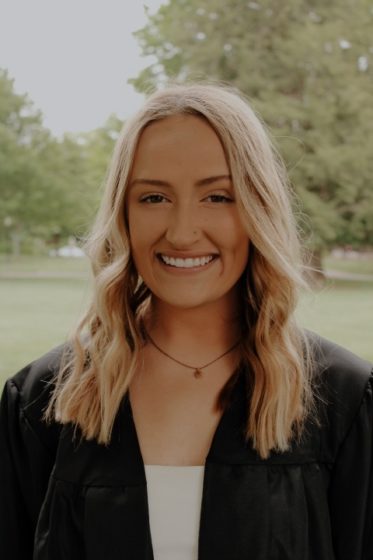 Congrats Abbie! After graduation, she will be attending the University of North Carolina at Charlotte for her master’s in Clinical Mental Health Counseling. Abbie’s favorite psych-related memory has been the opportunities to gain research experience and being able to carry out her own research study. She is “very thankful for Dr. Powell and all her patience and guidance!”
Congrats Abbie! After graduation, she will be attending the University of North Carolina at Charlotte for her master’s in Clinical Mental Health Counseling. Abbie’s favorite psych-related memory has been the opportunities to gain research experience and being able to carry out her own research study. She is “very thankful for Dr. Powell and all her patience and guidance!”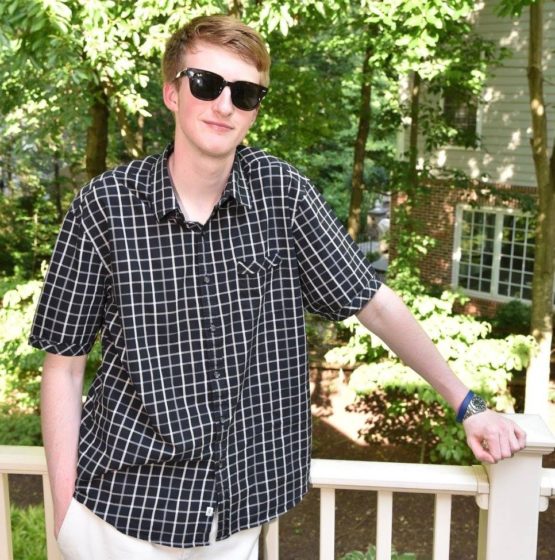 Congratulations to David! His post graduate plans are to move to Easton, MD for the summer, since his folks have purchased a new house there recently. He will be working a job there over the summer and hopefully gaining resume experience while he plans what to do for a graduate school transition in the near future. David’s favorite memory of the Psychology department was when he took a Drugs and Behavior class with Dr. Allen. “This class was extremely interesting, thought provoking, engaging, and fun all along the way. Learning how varying forms of substances affect different parts of the brain and behavior in unique ways was something I did not think I would learn at Roanoke.”
Congratulations to David! His post graduate plans are to move to Easton, MD for the summer, since his folks have purchased a new house there recently. He will be working a job there over the summer and hopefully gaining resume experience while he plans what to do for a graduate school transition in the near future. David’s favorite memory of the Psychology department was when he took a Drugs and Behavior class with Dr. Allen. “This class was extremely interesting, thought provoking, engaging, and fun all along the way. Learning how varying forms of substances affect different parts of the brain and behavior in unique ways was something I did not think I would learn at Roanoke.”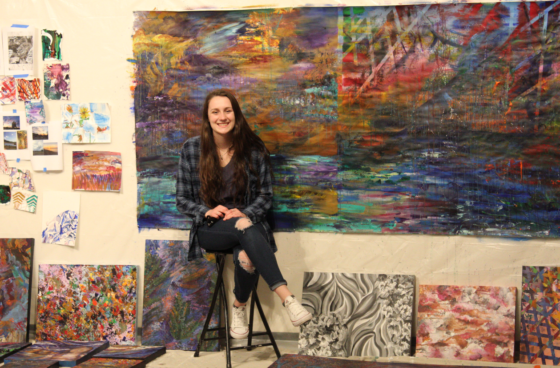 Congrats Carly! In the fall, Carly will be pursuing her Master’s in Art Therapy degree at George Washington University. She hopes to work part-time in a research lab or human services position as she works toward her degree. Carly’s favorite psych-related memory has been working in Dr. Carter’s research lab for the past 3 years! “Our lab meetings have been the highlight of my week each semester and I always appreciated the support I received from my lab partners and Dr. Carter in my time here.”
Congrats Carly! In the fall, Carly will be pursuing her Master’s in Art Therapy degree at George Washington University. She hopes to work part-time in a research lab or human services position as she works toward her degree. Carly’s favorite psych-related memory has been working in Dr. Carter’s research lab for the past 3 years! “Our lab meetings have been the highlight of my week each semester and I always appreciated the support I received from my lab partners and Dr. Carter in my time here.”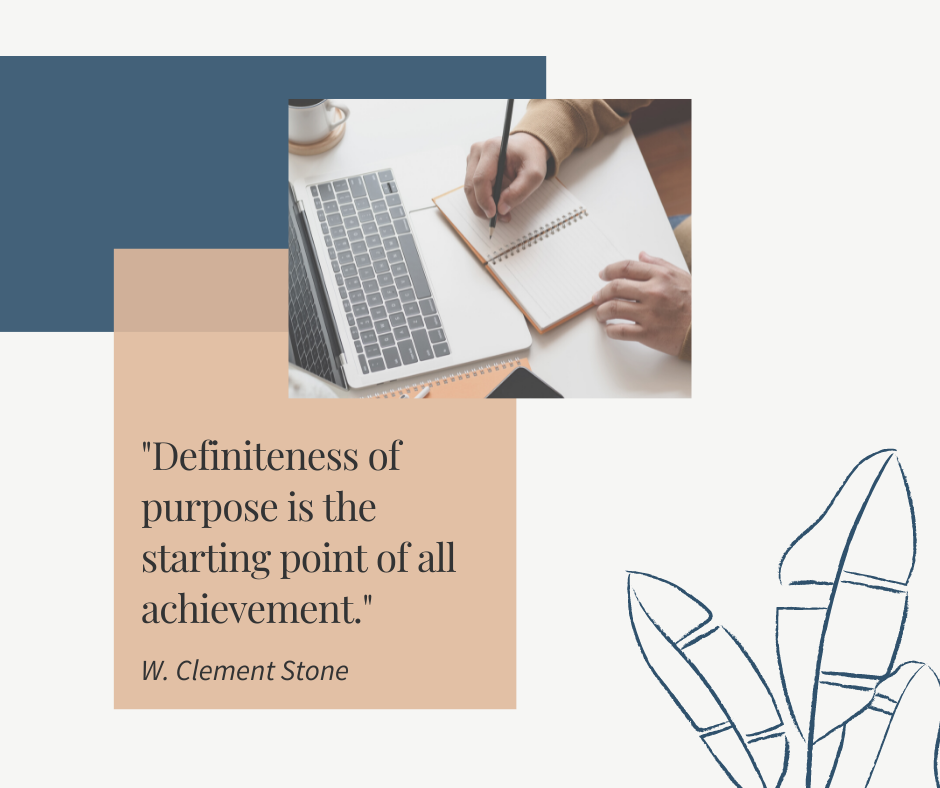

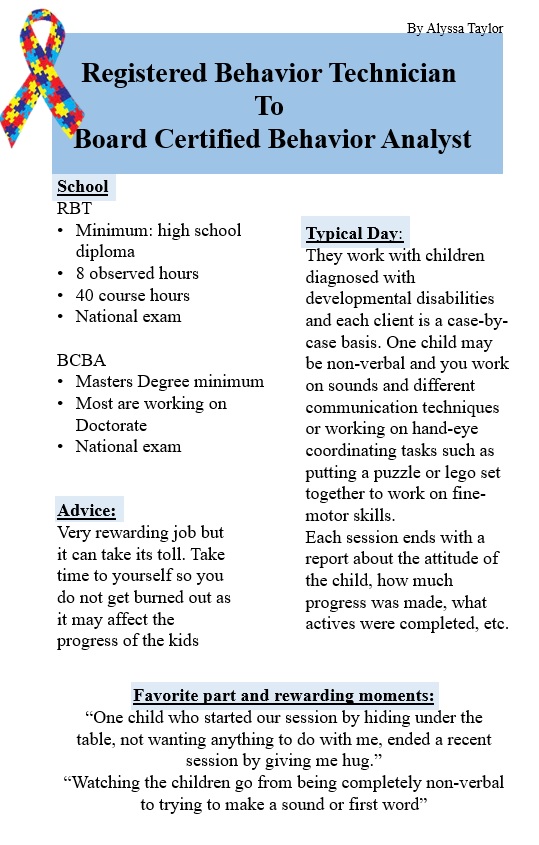
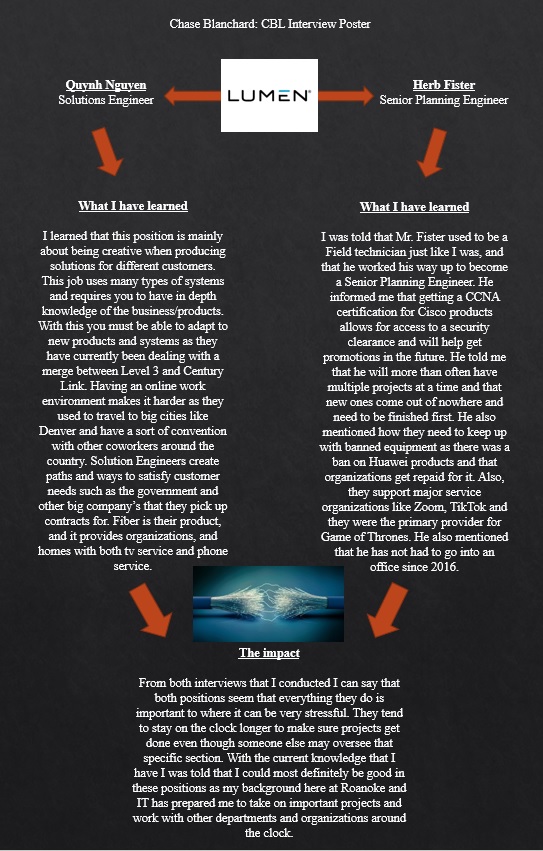
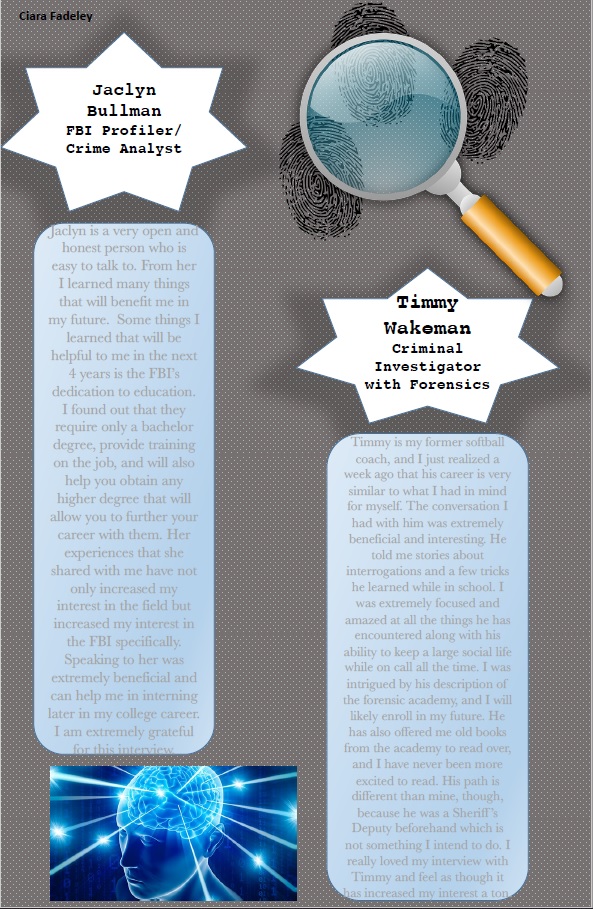
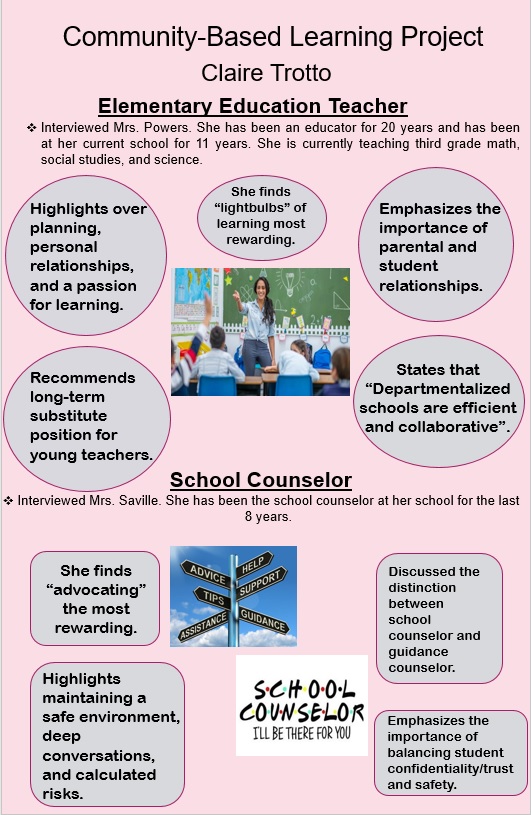
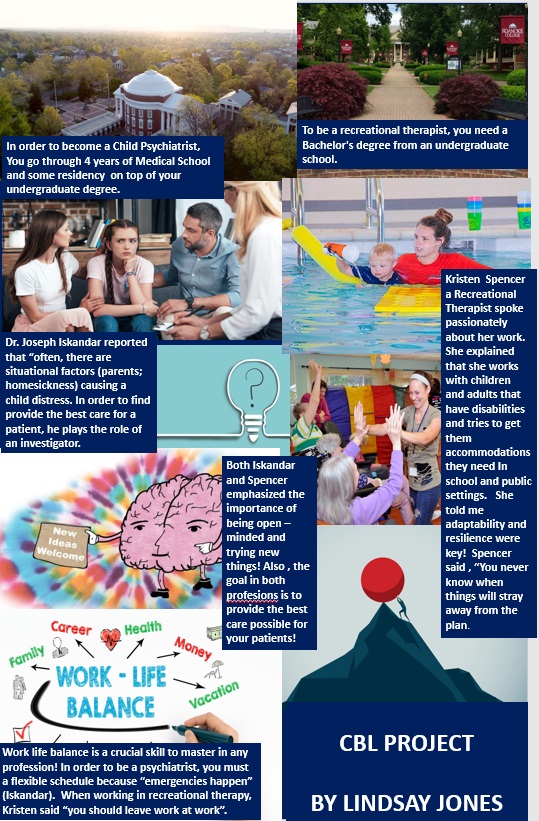
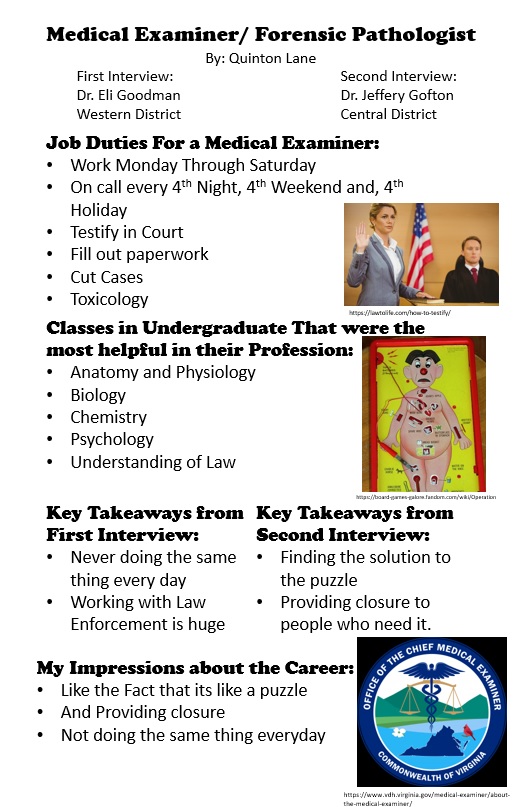
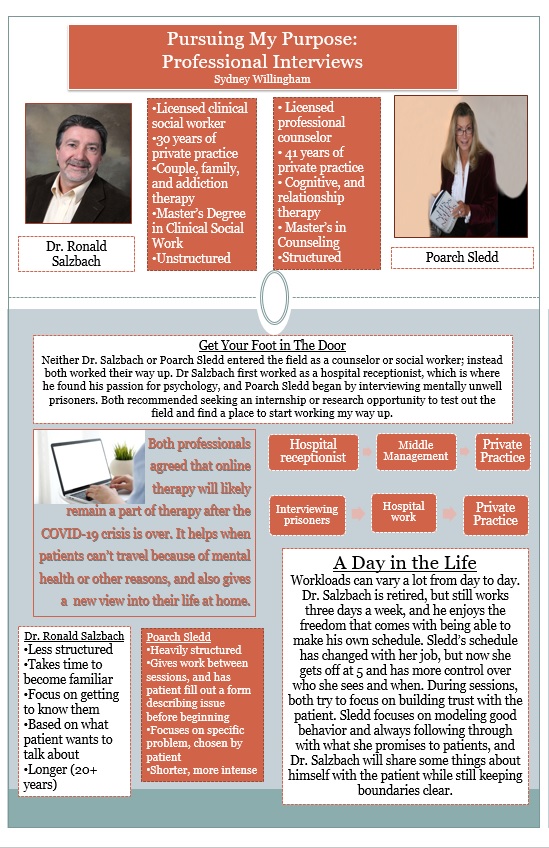
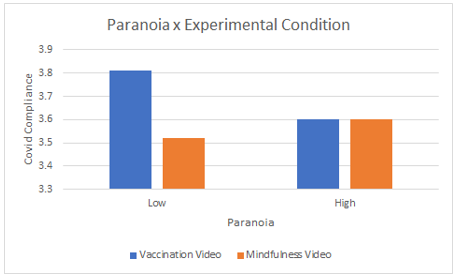

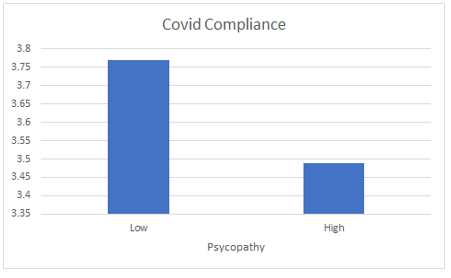







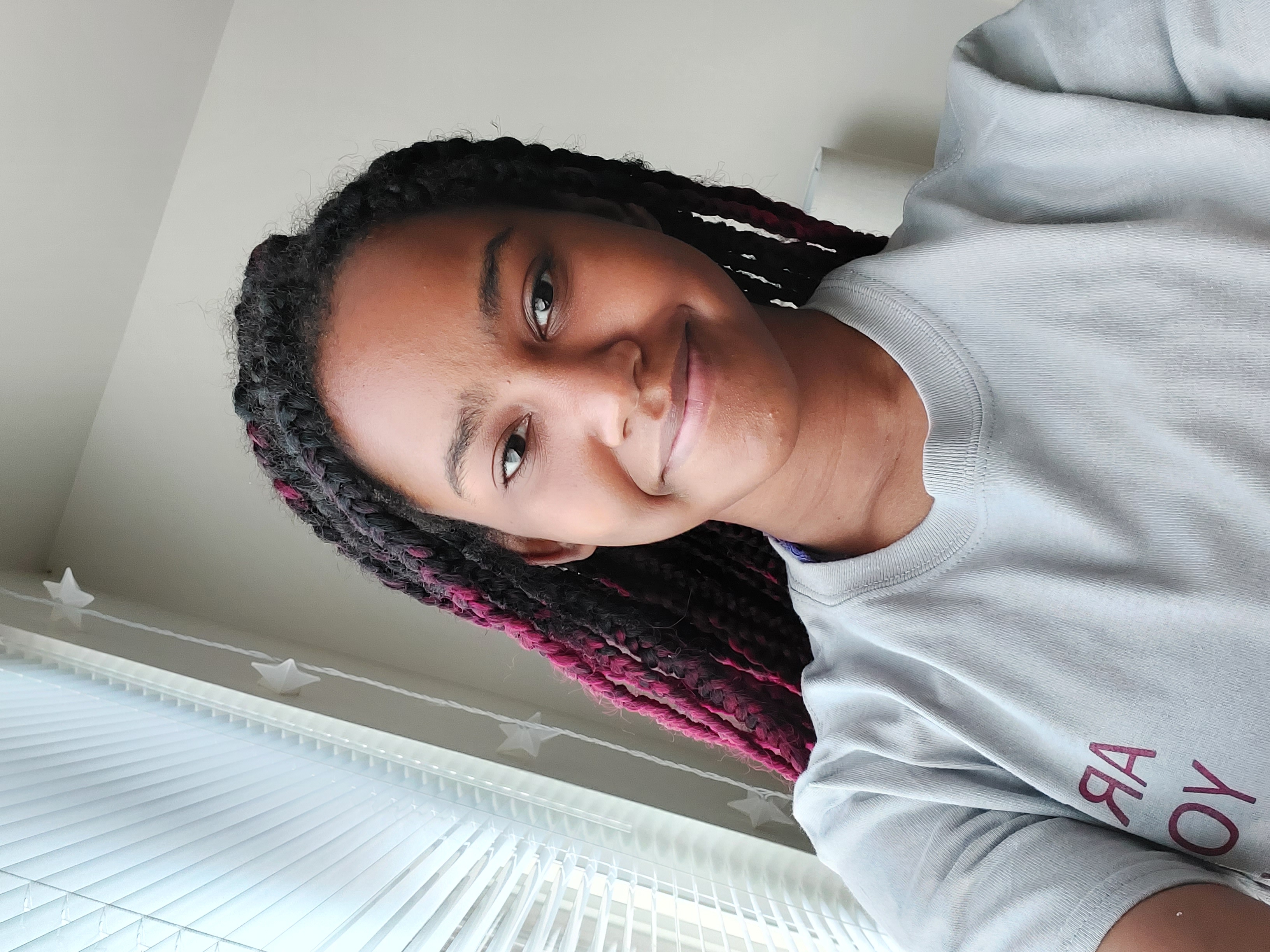
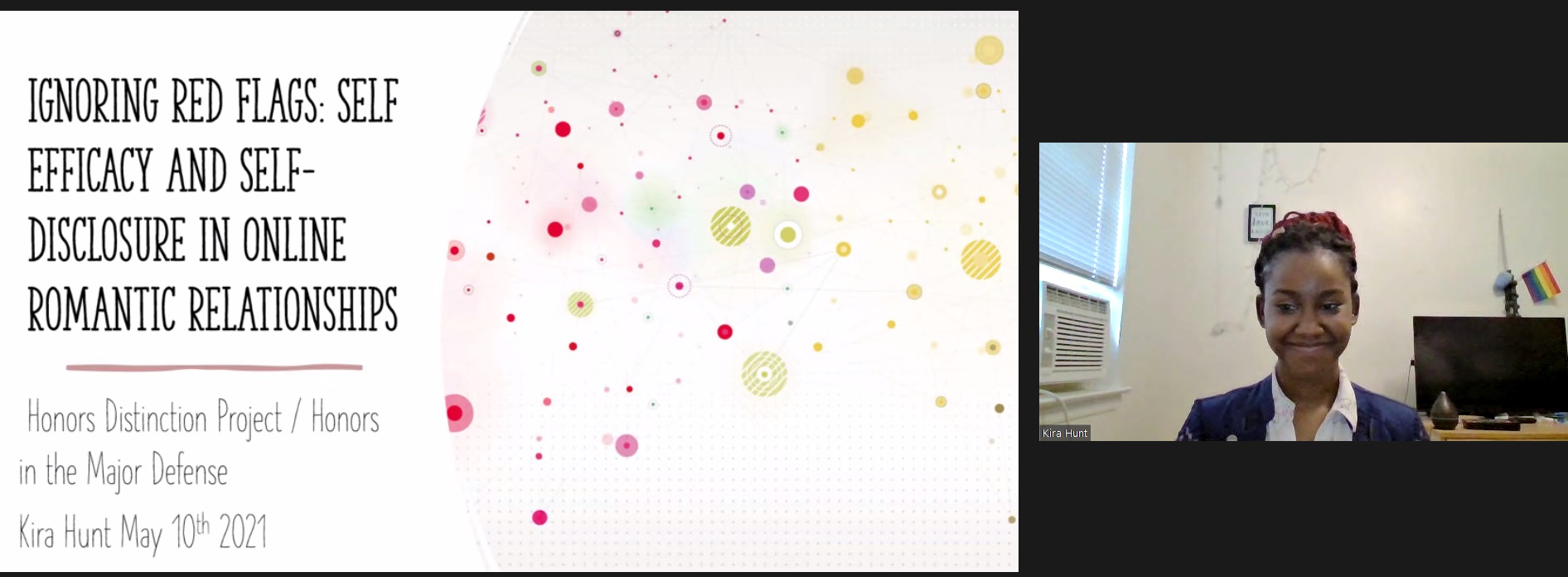

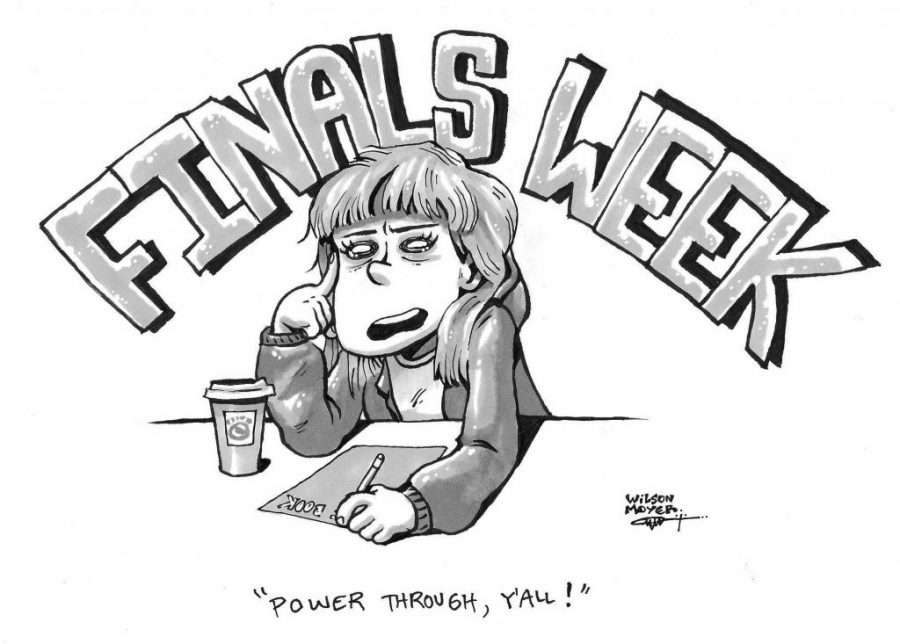


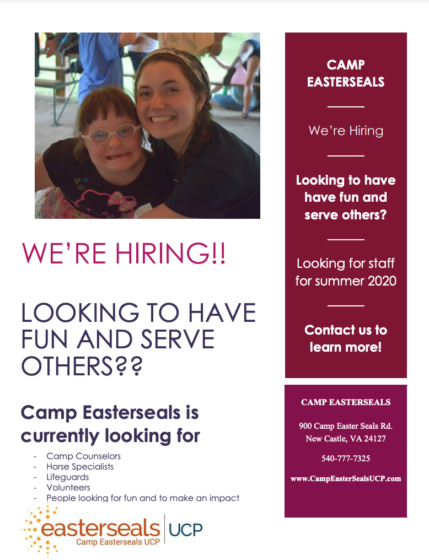 Are you looking for a summer job? How about an internship experience? Well, look no further, because Camp Easterseals is hiring summer staff!
Are you looking for a summer job? How about an internship experience? Well, look no further, because Camp Easterseals is hiring summer staff!
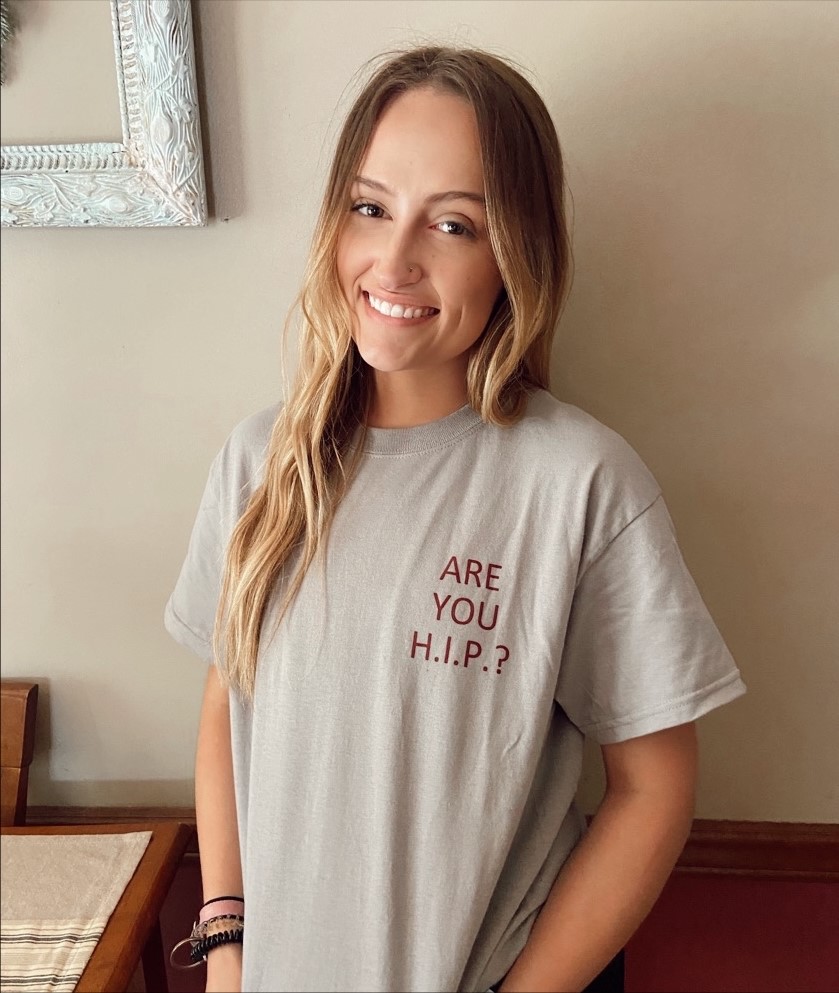
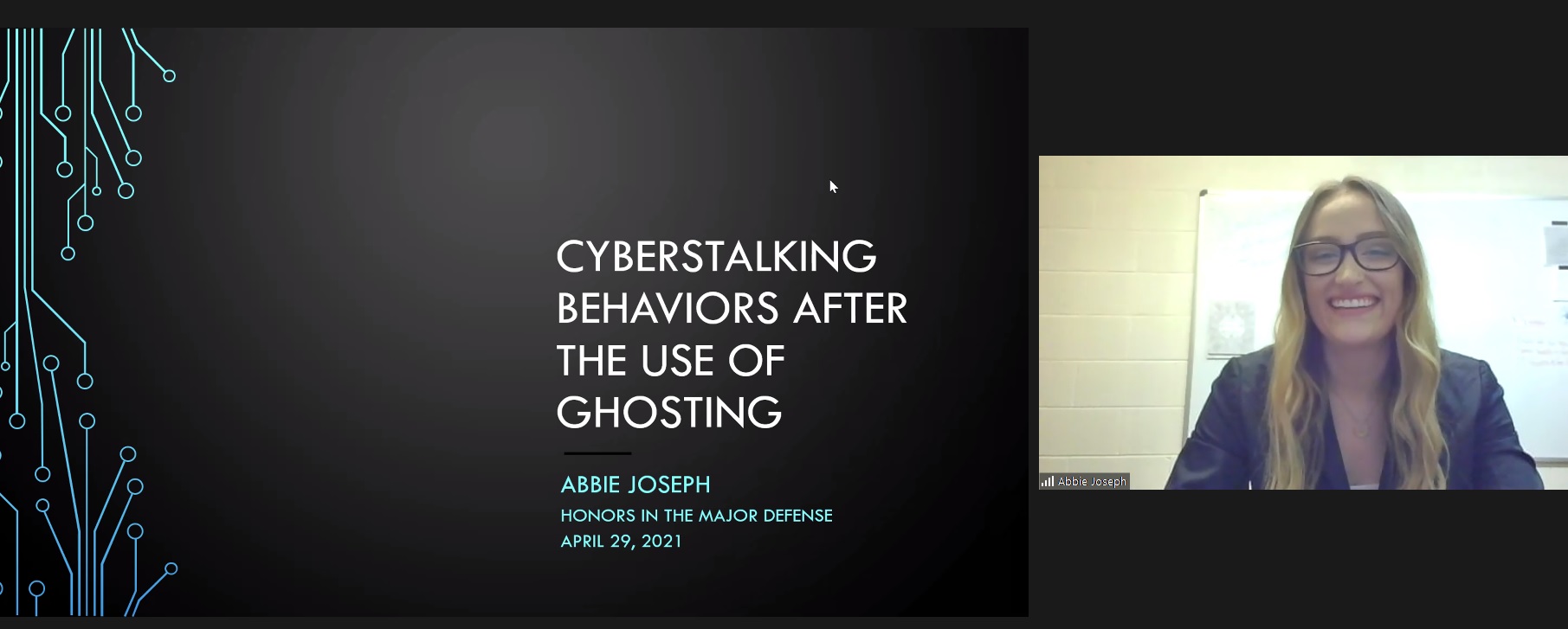
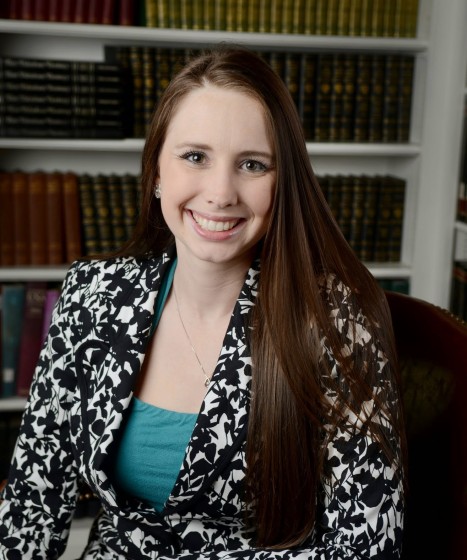

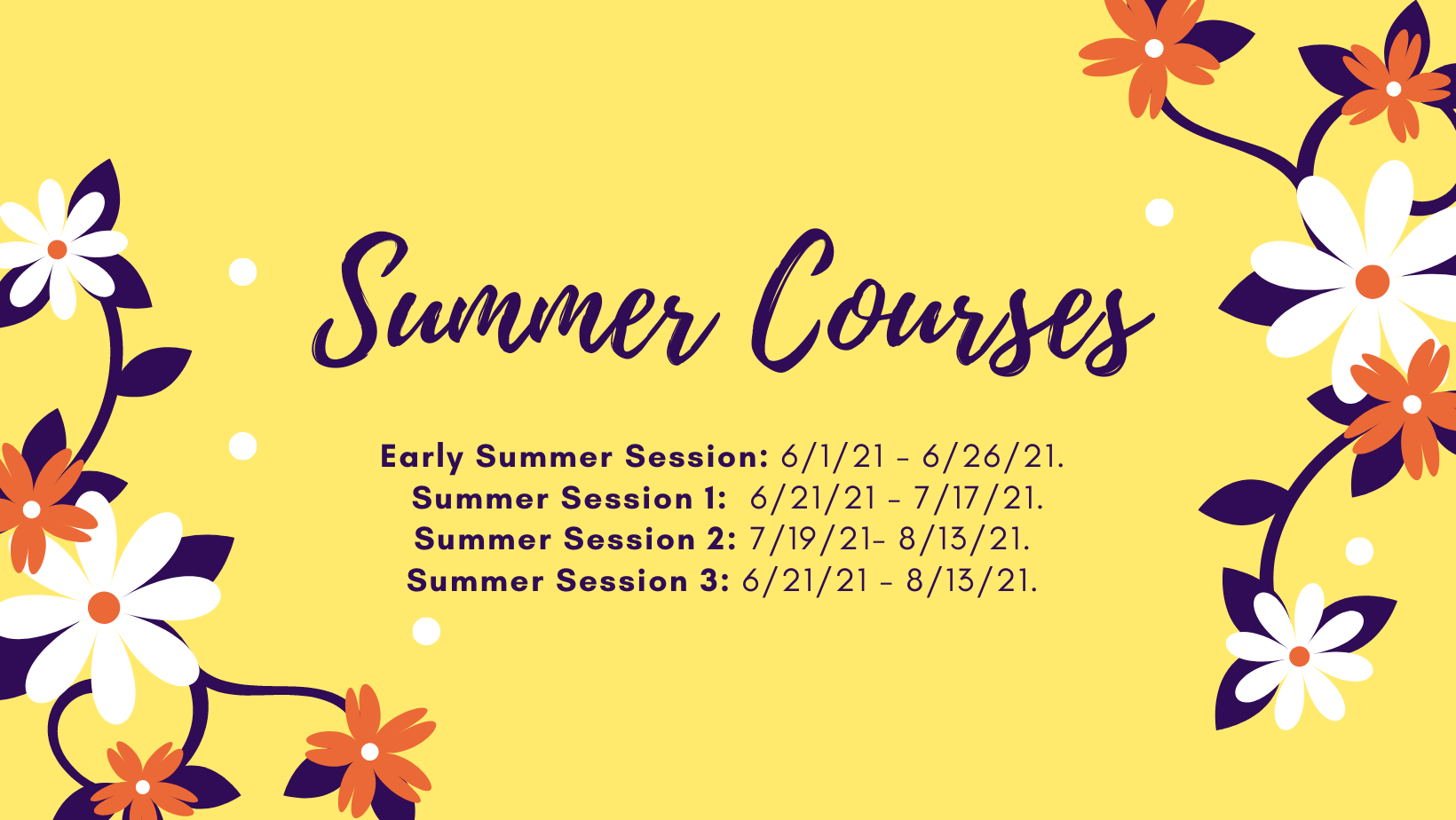

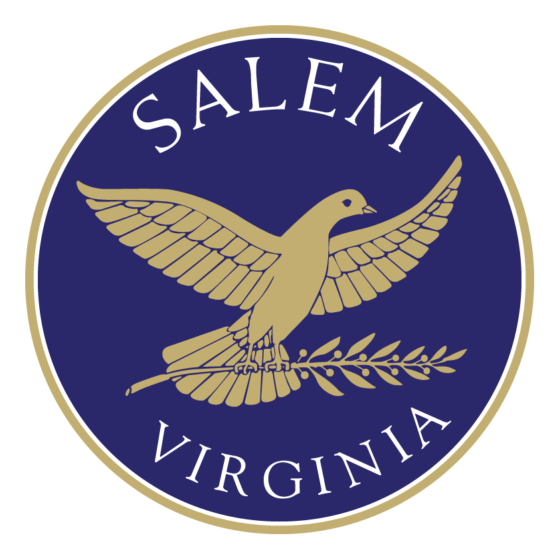 Internships are one of the main forms of experiential learning experiences offered at Roanoke College and within the psychology department. Each semester, our department sends students to work with various different organizations, across a number of fields or professions within psychology, to gain exposure to the field and to share their experiences with the department and other students on campus.
Internships are one of the main forms of experiential learning experiences offered at Roanoke College and within the psychology department. Each semester, our department sends students to work with various different organizations, across a number of fields or professions within psychology, to gain exposure to the field and to share their experiences with the department and other students on campus.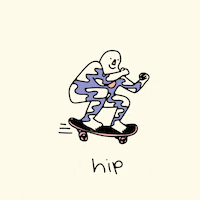
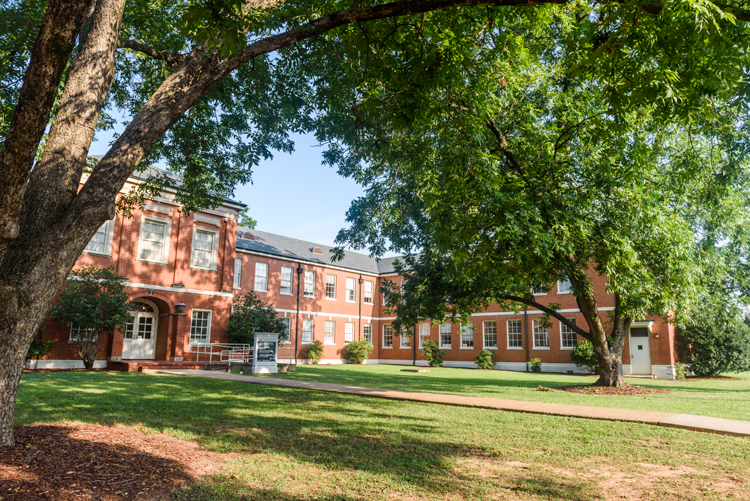


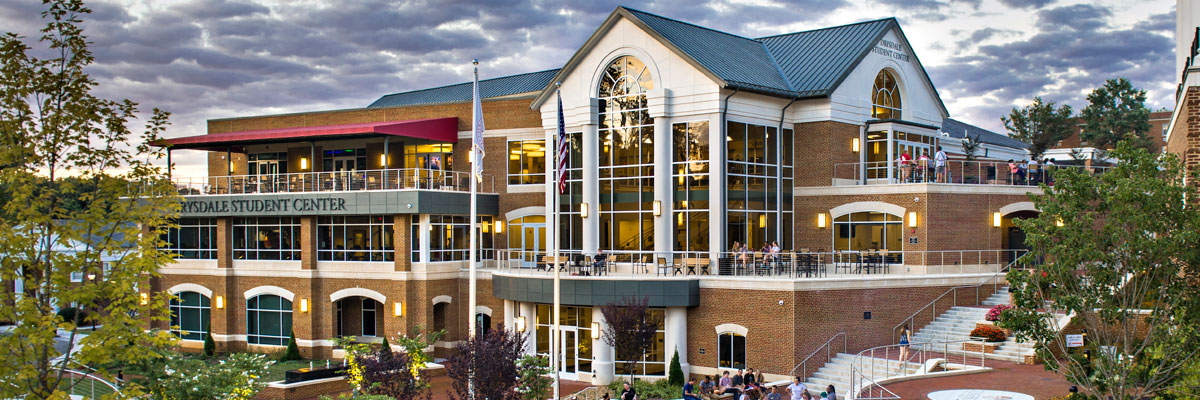
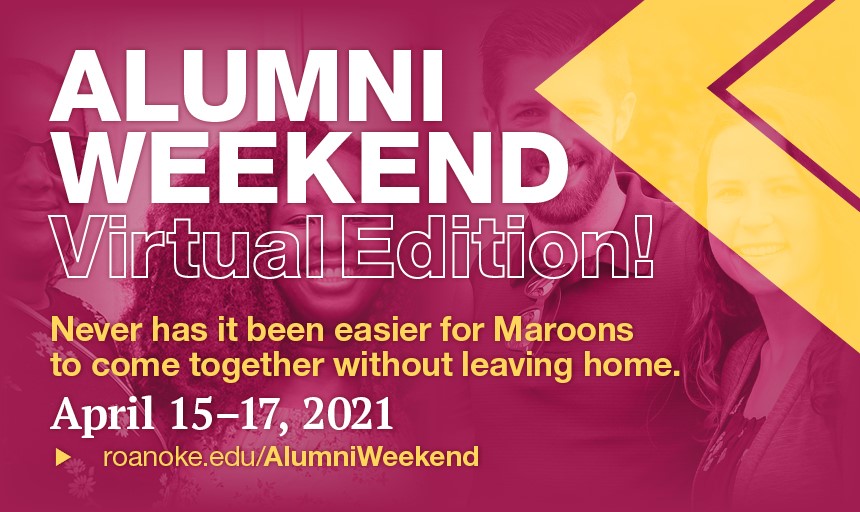
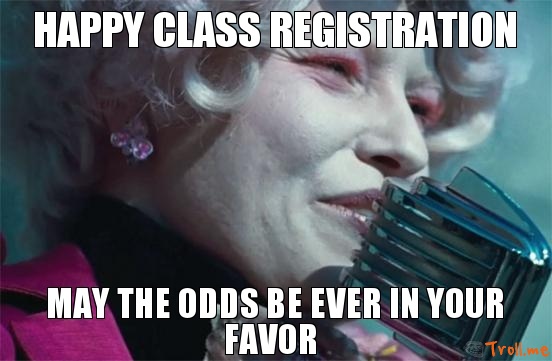
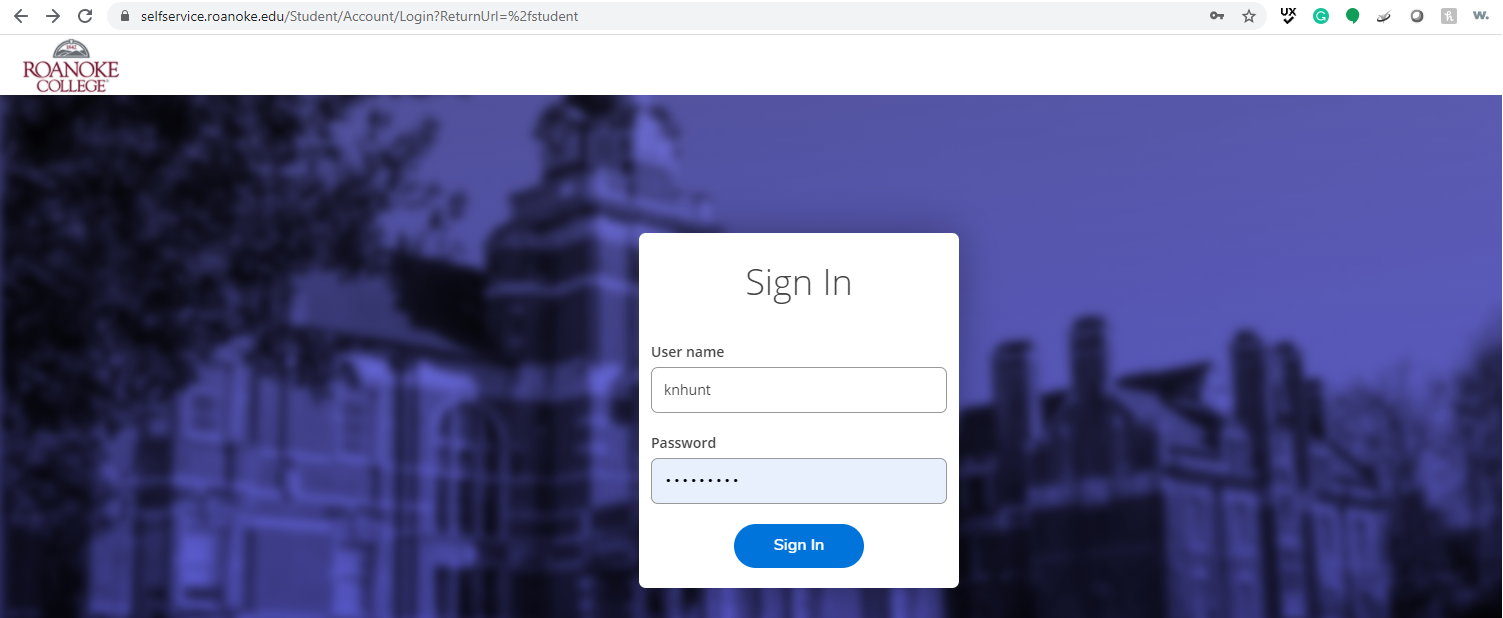
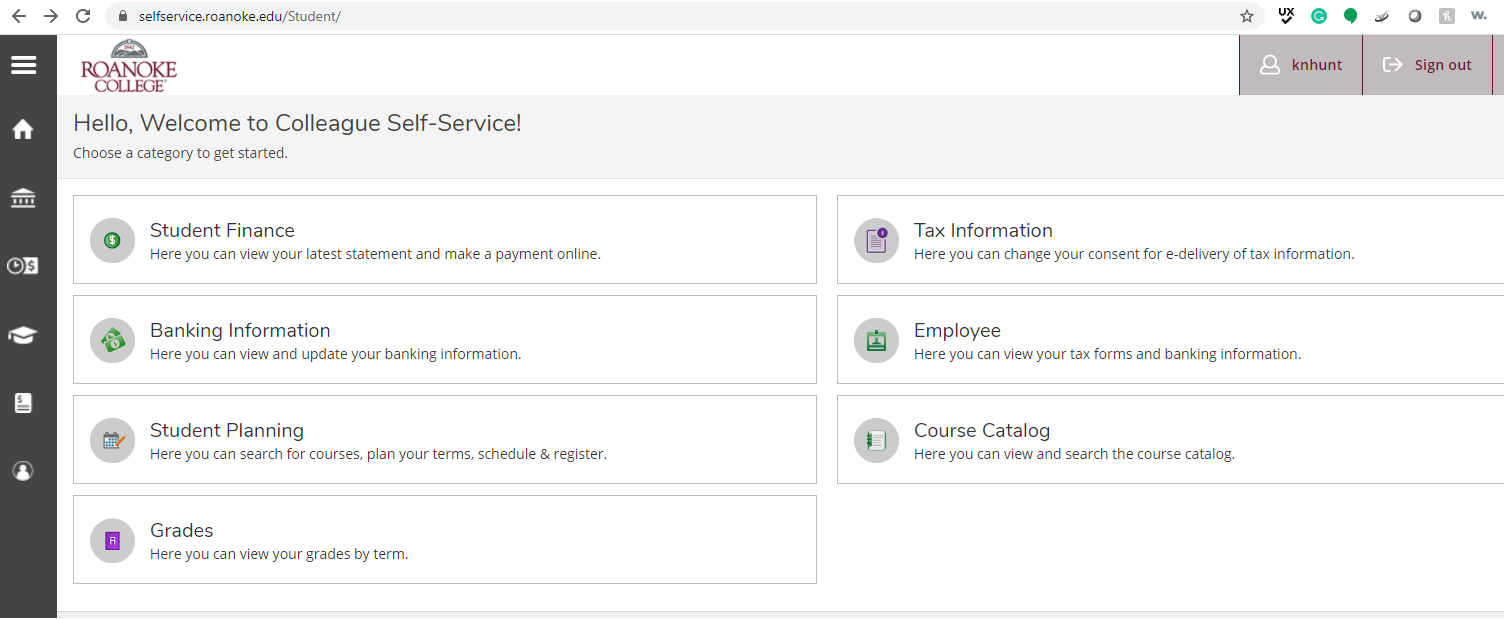

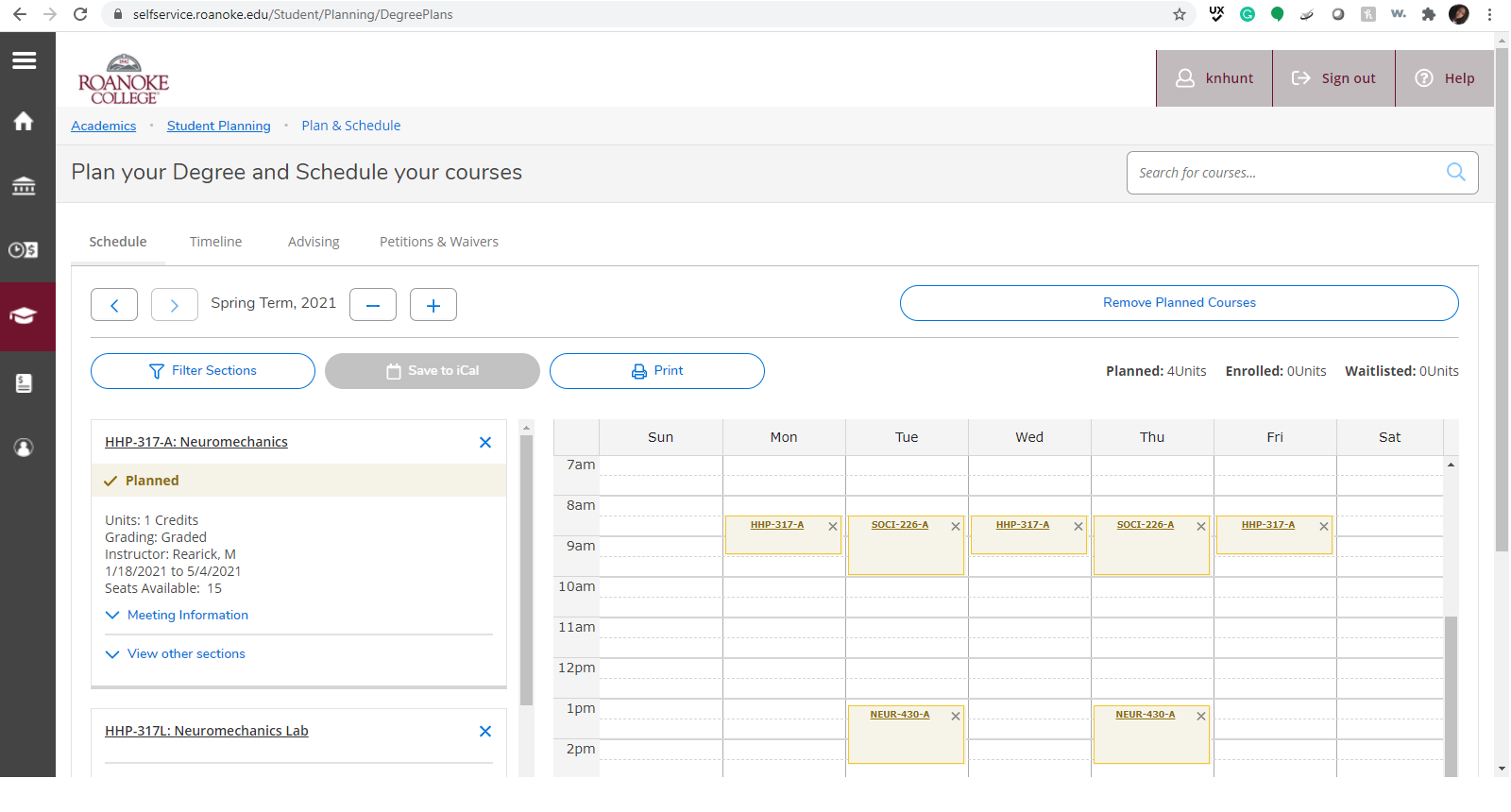
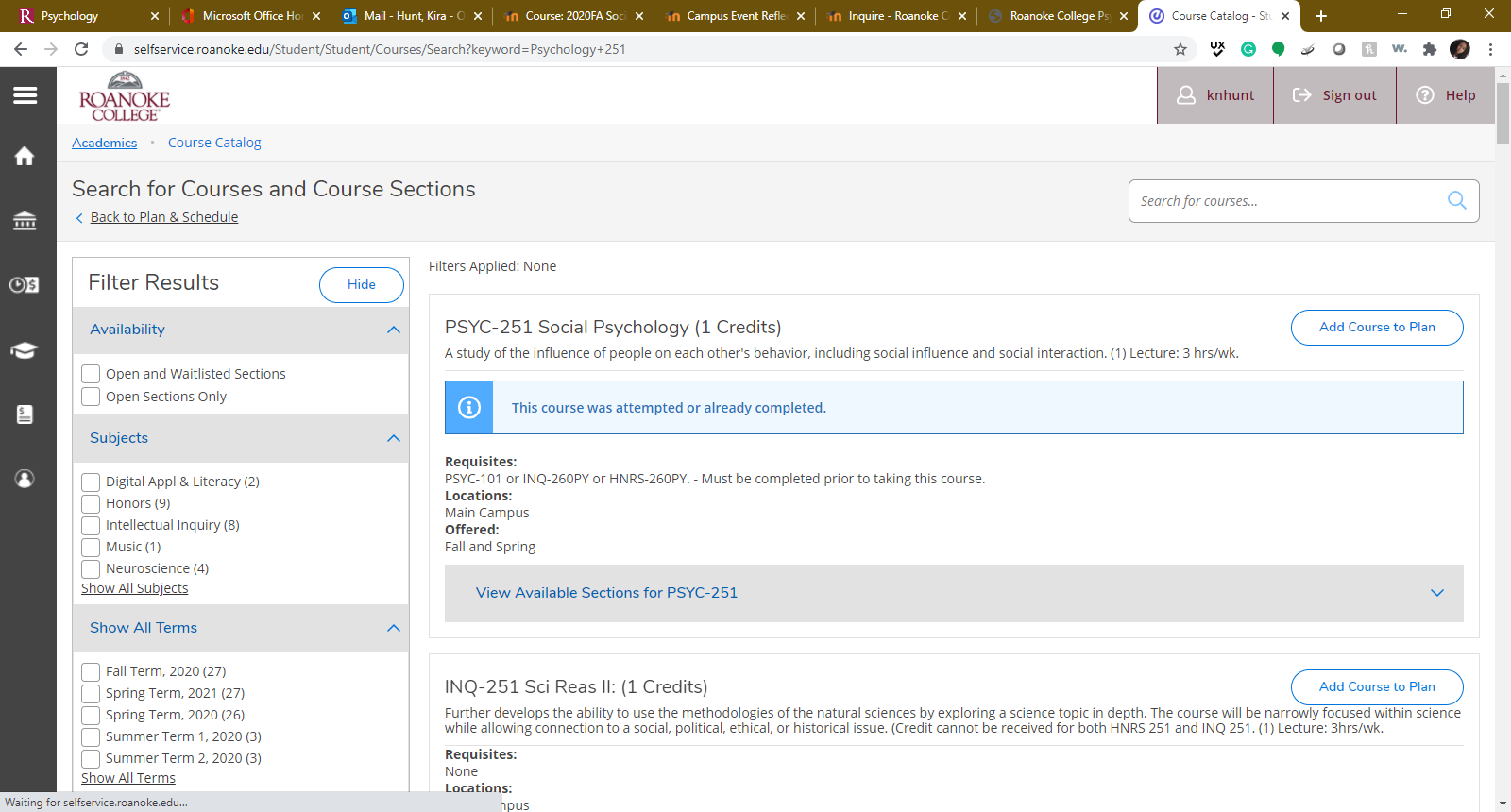
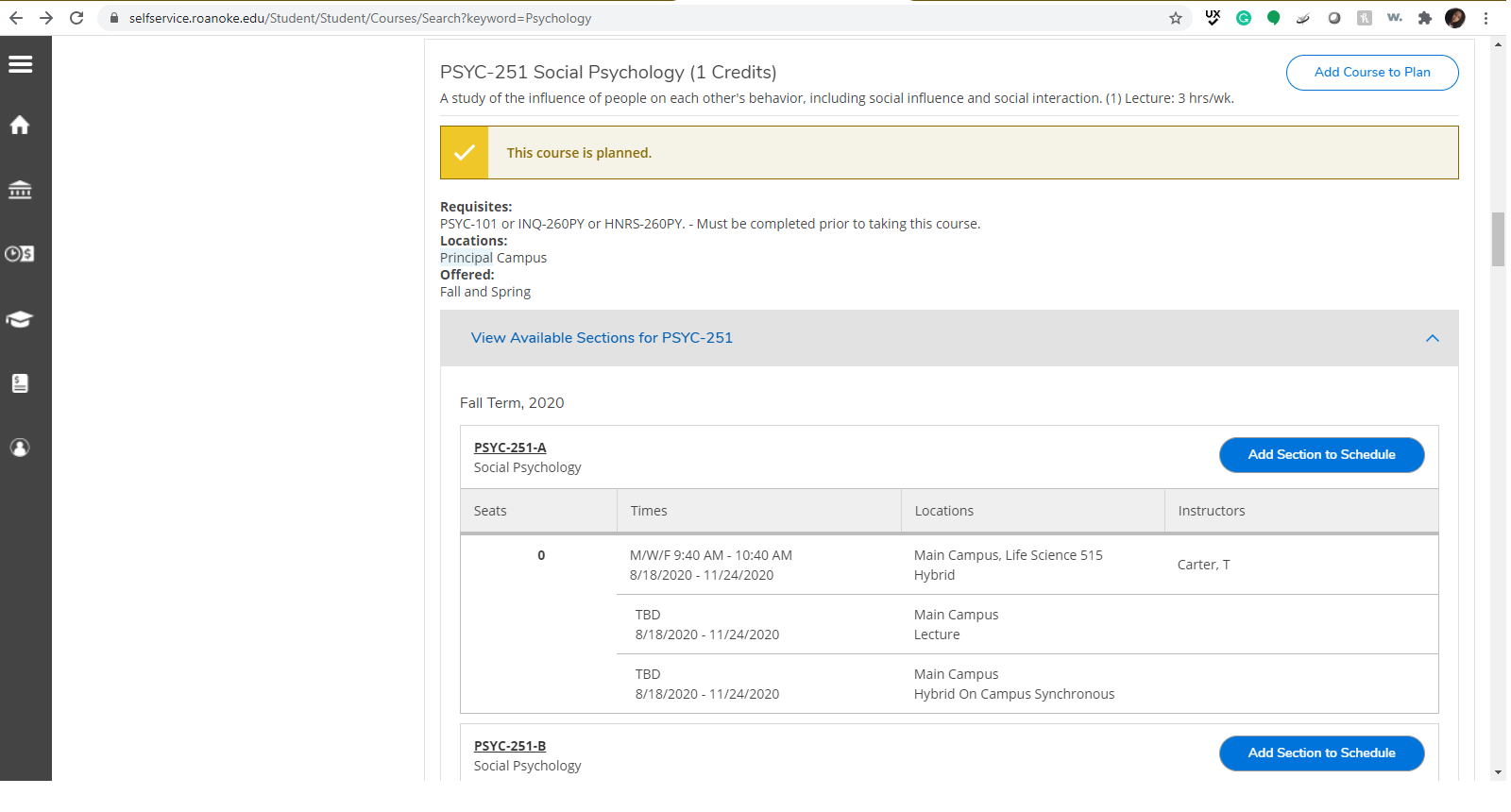
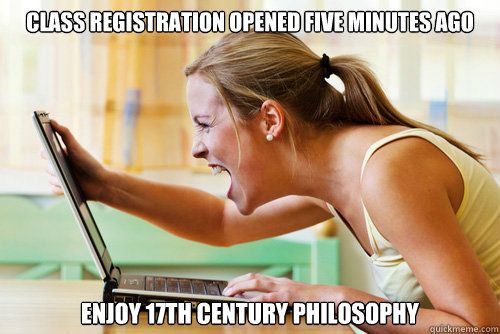
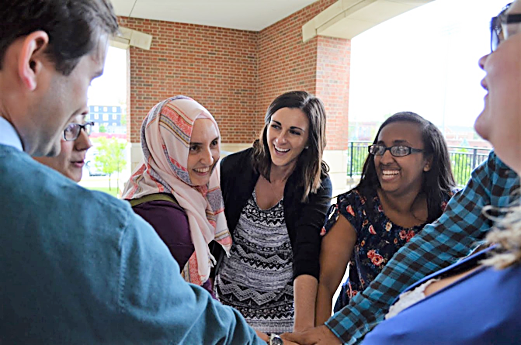
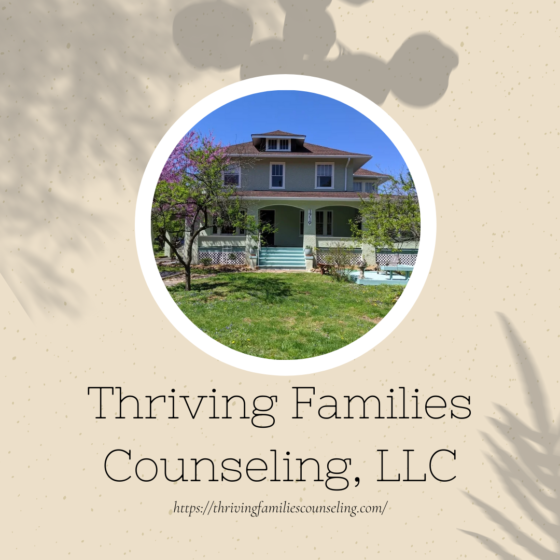
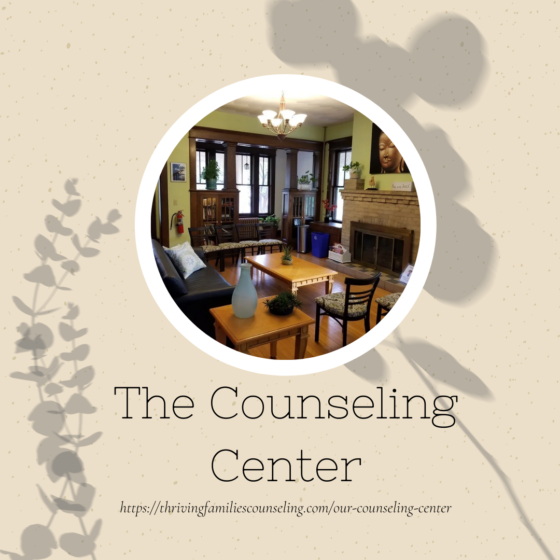
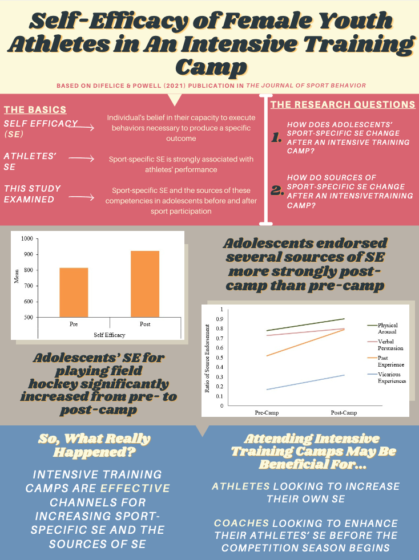
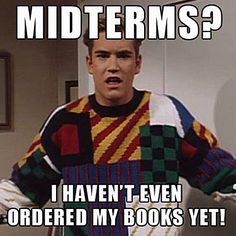

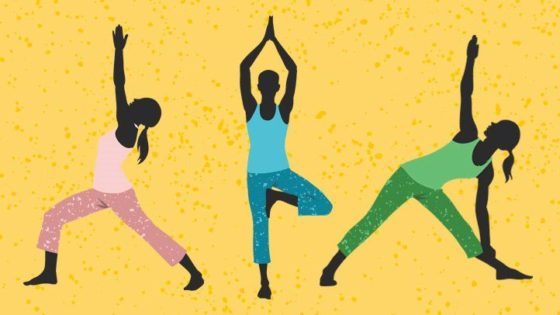


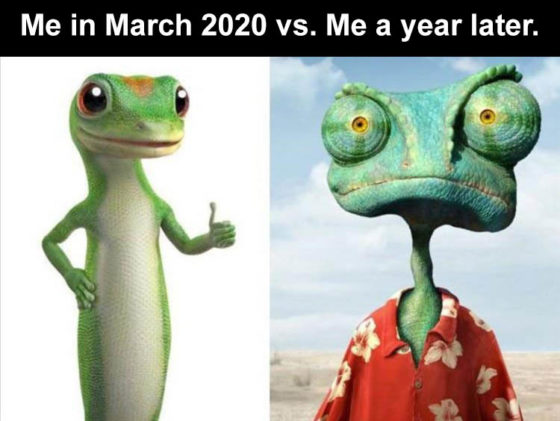
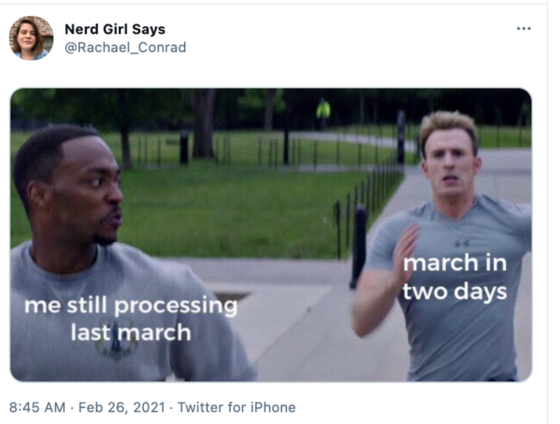
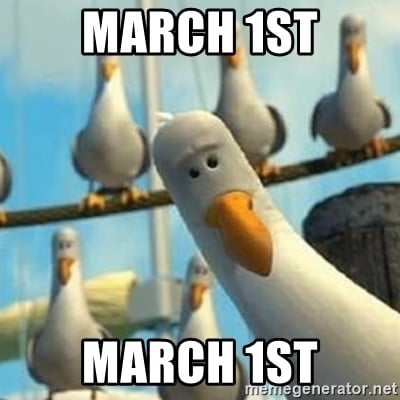

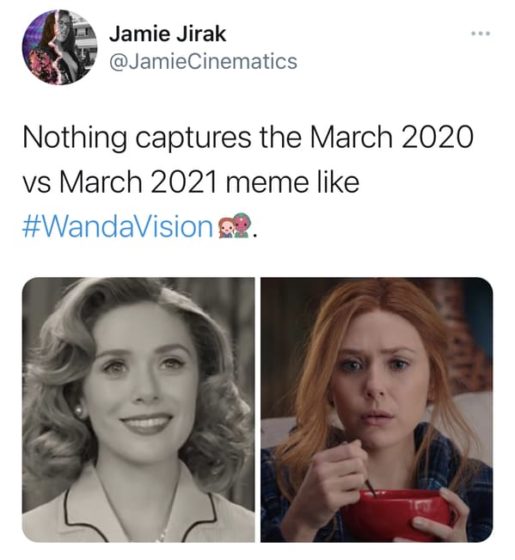


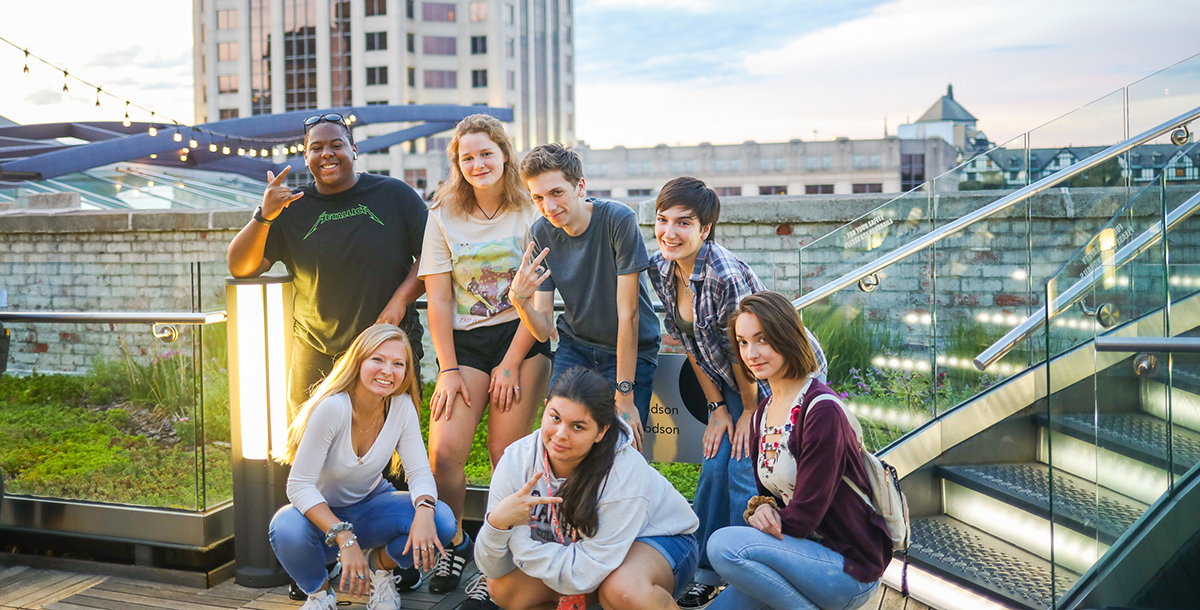
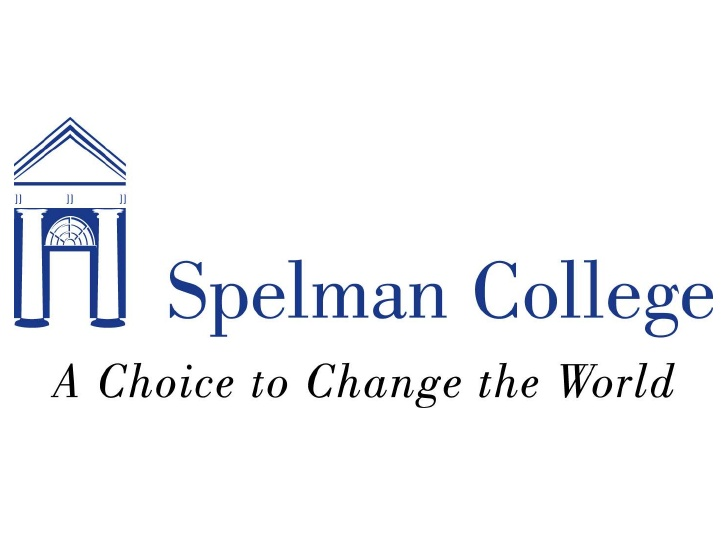 Dr. Dickens’ social psychology research lab at Spelman College is looking to hire an undergraduate research assistant to help with research focused on the experiences of Black women in STEM education.
Dr. Dickens’ social psychology research lab at Spelman College is looking to hire an undergraduate research assistant to help with research focused on the experiences of Black women in STEM education.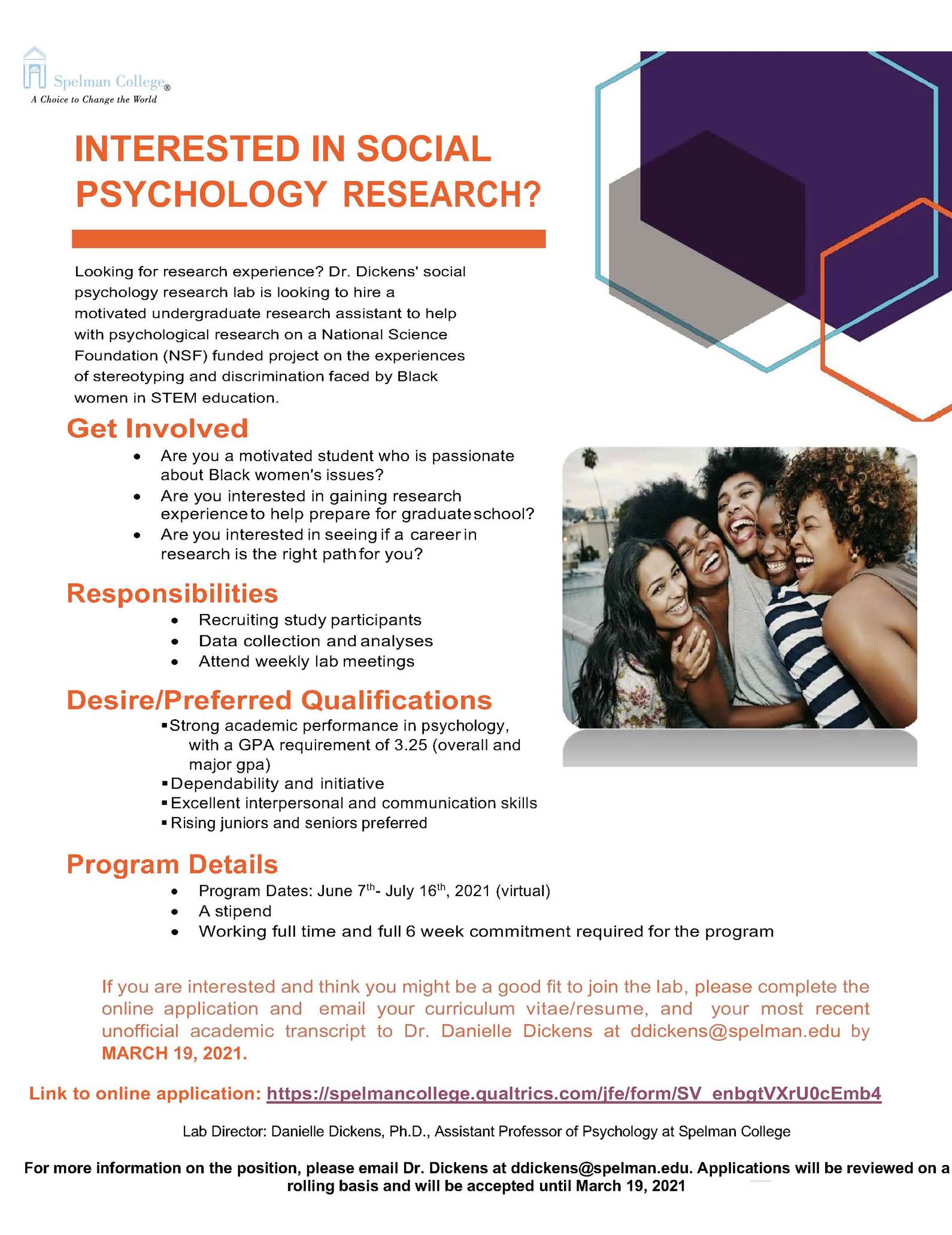
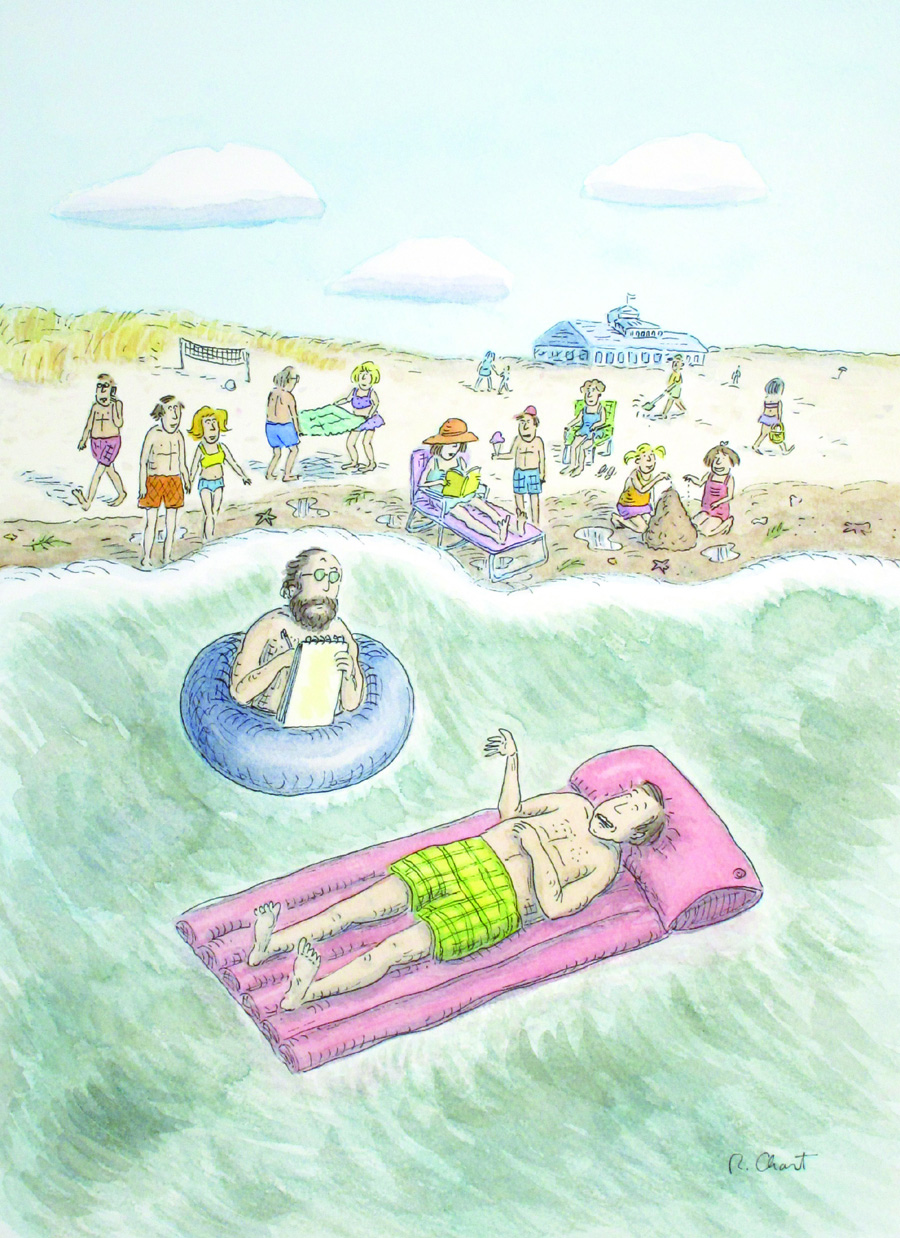
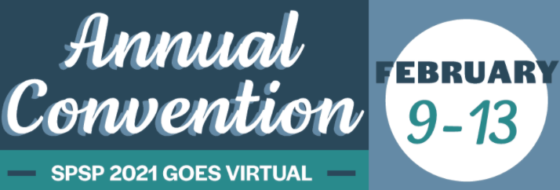
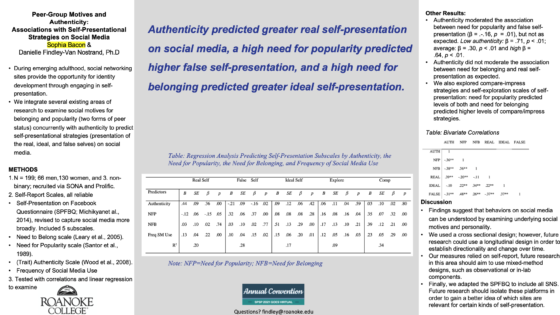 Research has shown that social networking platforms (Instagam, Facebook, Snap Chat, ect) afford the opportunity for identity development, specifically through engaging in different types of self-presentation. In this study, we examined the association between social goals (including, authenticity, the need for popularity, and need for belonging) and presentation of the real, ideal, and false self on social media.
Research has shown that social networking platforms (Instagam, Facebook, Snap Chat, ect) afford the opportunity for identity development, specifically through engaging in different types of self-presentation. In this study, we examined the association between social goals (including, authenticity, the need for popularity, and need for belonging) and presentation of the real, ideal, and false self on social media.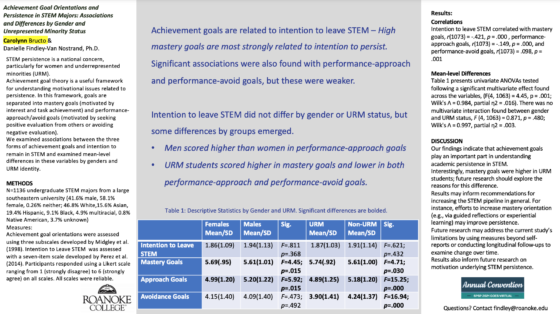 In this study, we examined achievement goal orientations (mastery, performance-approach, and performance-avoidance) in association with intention to remain in STEM majors and differences in these variables and associations by gender and unrepresented minority status in a large sample of undergraduate students. Results suggest achievement goals are meaningfully related to STEM persistence.
In this study, we examined achievement goal orientations (mastery, performance-approach, and performance-avoidance) in association with intention to remain in STEM majors and differences in these variables and associations by gender and unrepresented minority status in a large sample of undergraduate students. Results suggest achievement goals are meaningfully related to STEM persistence.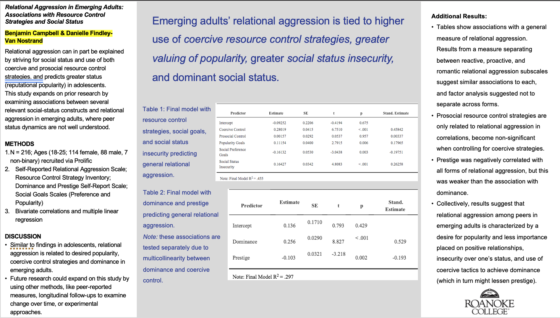
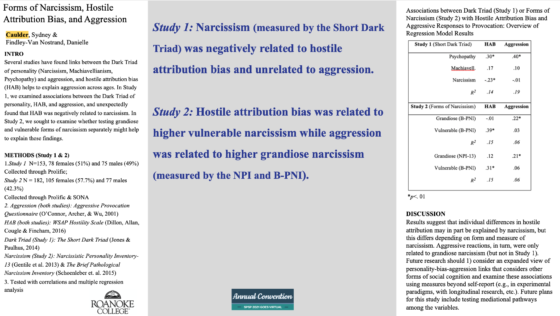 Research has found that narcissism predicts heightened provoked aggression and hostility. However, less understood is the role of hostile attribution bias (HAB) in these associations. In this study, we examined multiple conceptualizations of narcissism (grandiose and pathological) in relation to HAB and aggressive responses to provocation.
Research has found that narcissism predicts heightened provoked aggression and hostility. However, less understood is the role of hostile attribution bias (HAB) in these associations. In this study, we examined multiple conceptualizations of narcissism (grandiose and pathological) in relation to HAB and aggressive responses to provocation.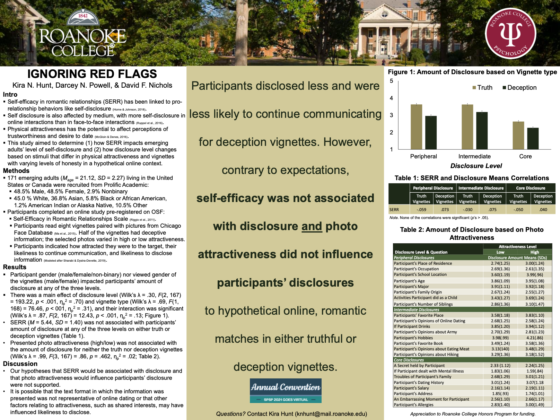
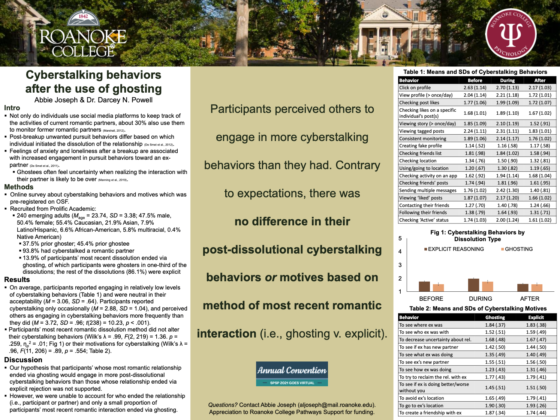
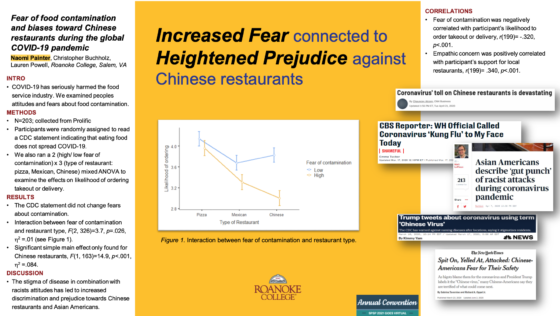
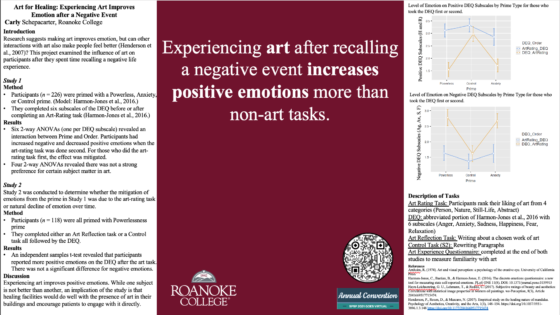
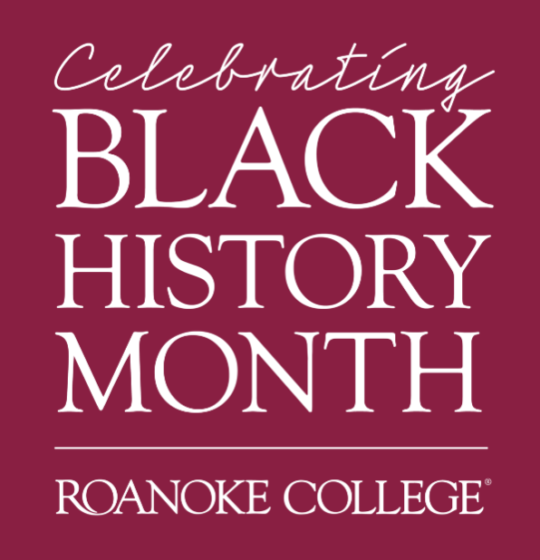 We dedicate every February to Black History Month. A month that celebrates the incredible achievements of African Americans and highlights and recognizes their central role in U.S. history. Roanoke College is celebrating Black History Month through a series of events, of which more information is provided below.
We dedicate every February to Black History Month. A month that celebrates the incredible achievements of African Americans and highlights and recognizes their central role in U.S. history. Roanoke College is celebrating Black History Month through a series of events, of which more information is provided below.



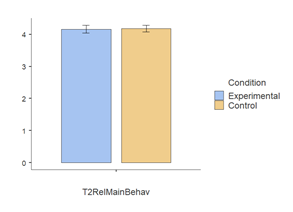
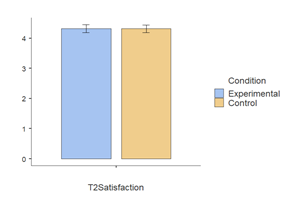
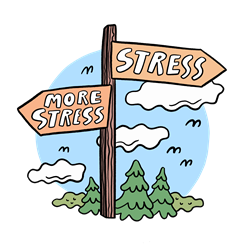
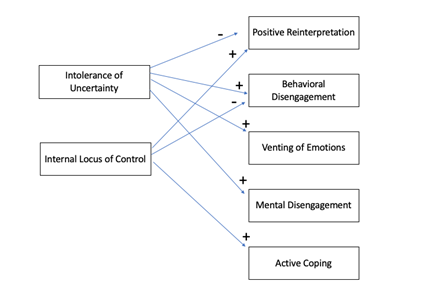
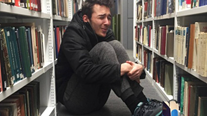
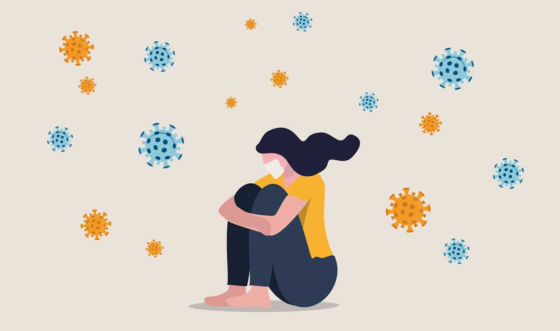
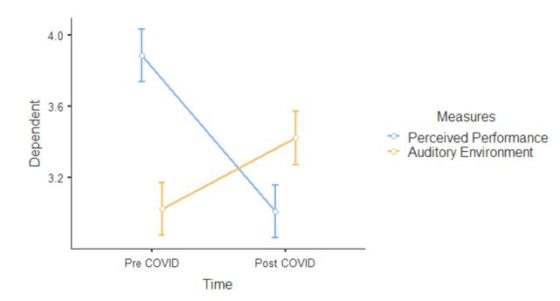 Figure 1. The effect that time period has on auditory environment and perceived performance
Figure 1. The effect that time period has on auditory environment and perceived performance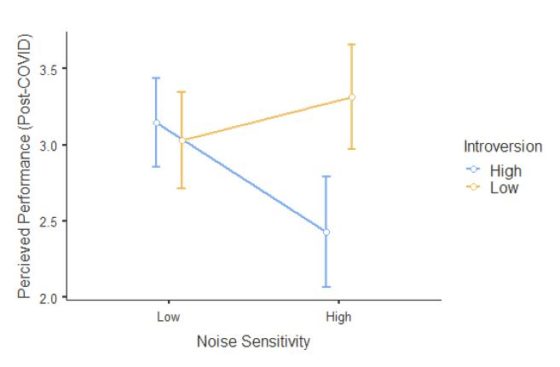 Figure 2. The effect that introversion level has on an individual’s noise sensitivity and perceived performance after COVID-19.
Figure 2. The effect that introversion level has on an individual’s noise sensitivity and perceived performance after COVID-19.
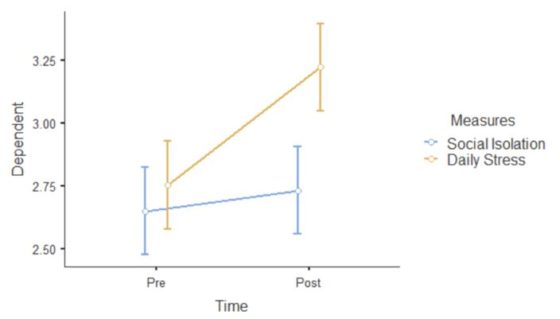 Figure 1. Social Isolation and Daily Stress over time.
Figure 1. Social Isolation and Daily Stress over time.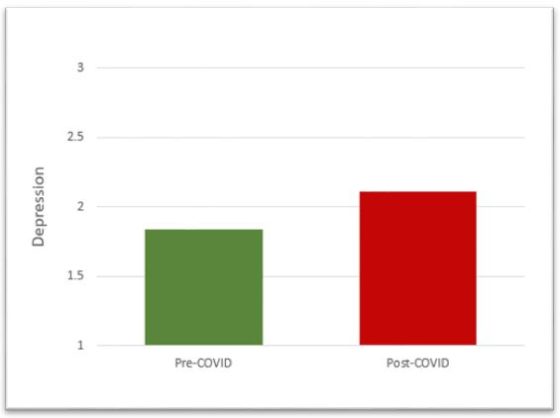
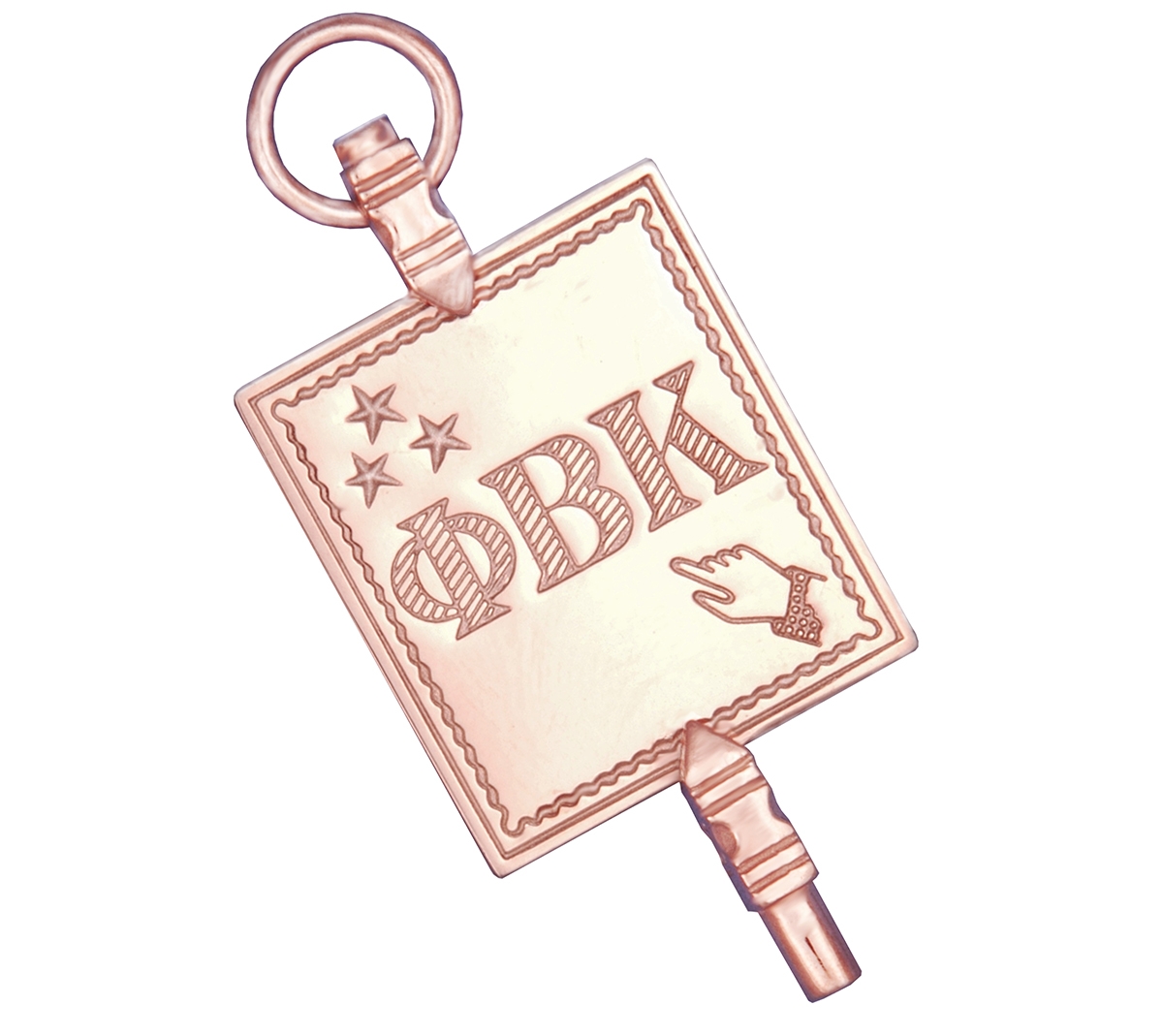
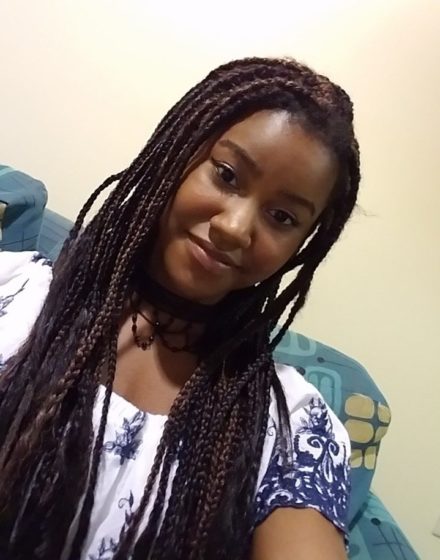 I am a senior psychology major with a concentration in neuroscience and a minor in sociology. I was really ecstatic to hear that I was selected because I had been working towards this since hearing about it in my freshman year. While at Roanoke, I’ve been a student assistant in the psychology department as well as an academic coach in the Center for Learning and Teaching. I am also a member of Alpha Lambda Delta and Psi Chi. In addition, I have also participated in research in Dr. Powell’s lab as well as with Dr. Nichols, which is one of the things I am most proud of. I haven’t finished my Honors Distinction Project yet but I’m really proud of the progress I have made on it. After graduation, I plan on being in Teach for America while I prepare to go to graduate school to become a Certified Child Life Specialist.
I am a senior psychology major with a concentration in neuroscience and a minor in sociology. I was really ecstatic to hear that I was selected because I had been working towards this since hearing about it in my freshman year. While at Roanoke, I’ve been a student assistant in the psychology department as well as an academic coach in the Center for Learning and Teaching. I am also a member of Alpha Lambda Delta and Psi Chi. In addition, I have also participated in research in Dr. Powell’s lab as well as with Dr. Nichols, which is one of the things I am most proud of. I haven’t finished my Honors Distinction Project yet but I’m really proud of the progress I have made on it. After graduation, I plan on being in Teach for America while I prepare to go to graduate school to become a Certified Child Life Specialist.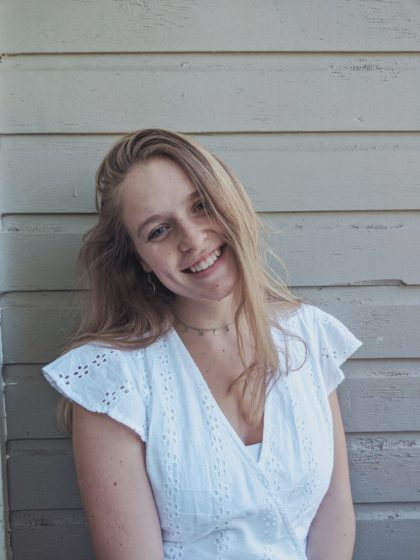 I am a senior psychology and criminal justice double major. I received a voicemail from Dr. Peppers letting me know that I was selected for membership into PBK and I was ecstatic! I have been working towards membership into PBK since freshman year and I was so pleased that my hard work had finally paid off. While at Roanoke I have been involved in many things – from running on the Track and Field team, singing in the Roanotes acapella group, co-hosting a radio show, working as the campus activities director and creating fundraising events for Make-A-Wish in Chi Omega, working as the trip supervisor and guide with Outdoor Adventures, working as a student assistant in the psychology department, conducting research with Dr. Osterman, leading Psi Chi, NSLS, and Alpha Lambda Delta as president, as well as also being a member in Alpha Phi Sigma, Xi Theta Chi, Order of Omega, and Omicron Delta Kappa. It’s safe to say my time at Roanoke College has been far from boring. That all being said, my biggest accomplishments, besides being selected into PBK, are definitely presenting at the SPSP conference in New Orleans last spring, having the opportunity to ask Justice Sotomayor a question during her Zoom visit with Roanoke College, and working towards completing my honor in the major project. Upon graduating from Roanoke, I intend to enter into a Clinical Psychology Ph.D. program and eventually become a forensic psychologist for juveniles.
I am a senior psychology and criminal justice double major. I received a voicemail from Dr. Peppers letting me know that I was selected for membership into PBK and I was ecstatic! I have been working towards membership into PBK since freshman year and I was so pleased that my hard work had finally paid off. While at Roanoke I have been involved in many things – from running on the Track and Field team, singing in the Roanotes acapella group, co-hosting a radio show, working as the campus activities director and creating fundraising events for Make-A-Wish in Chi Omega, working as the trip supervisor and guide with Outdoor Adventures, working as a student assistant in the psychology department, conducting research with Dr. Osterman, leading Psi Chi, NSLS, and Alpha Lambda Delta as president, as well as also being a member in Alpha Phi Sigma, Xi Theta Chi, Order of Omega, and Omicron Delta Kappa. It’s safe to say my time at Roanoke College has been far from boring. That all being said, my biggest accomplishments, besides being selected into PBK, are definitely presenting at the SPSP conference in New Orleans last spring, having the opportunity to ask Justice Sotomayor a question during her Zoom visit with Roanoke College, and working towards completing my honor in the major project. Upon graduating from Roanoke, I intend to enter into a Clinical Psychology Ph.D. program and eventually become a forensic psychologist for juveniles.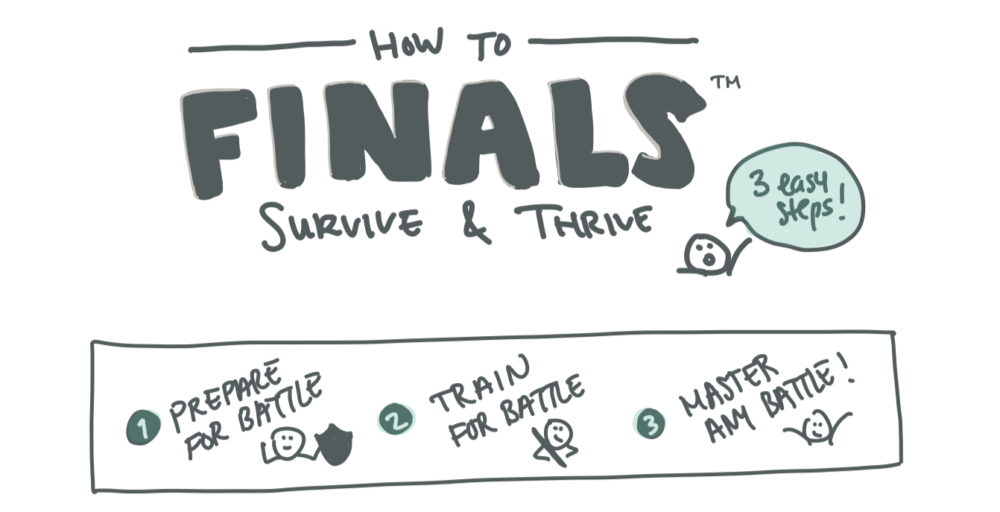
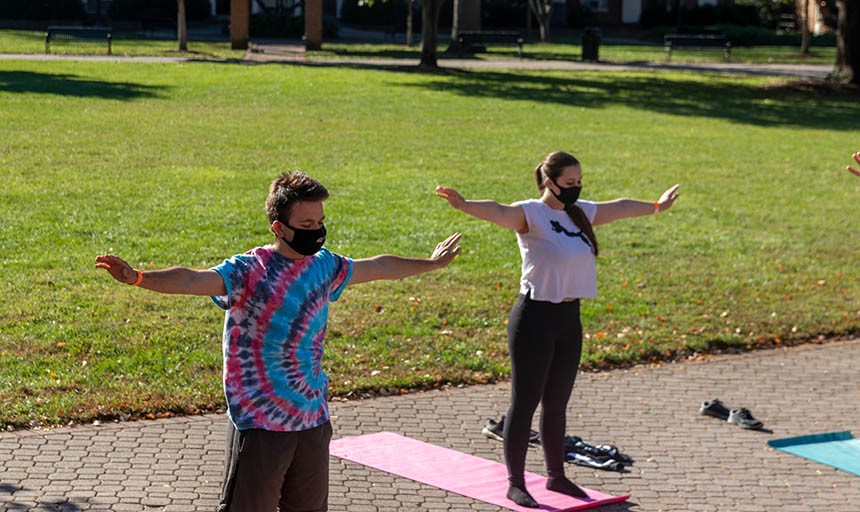
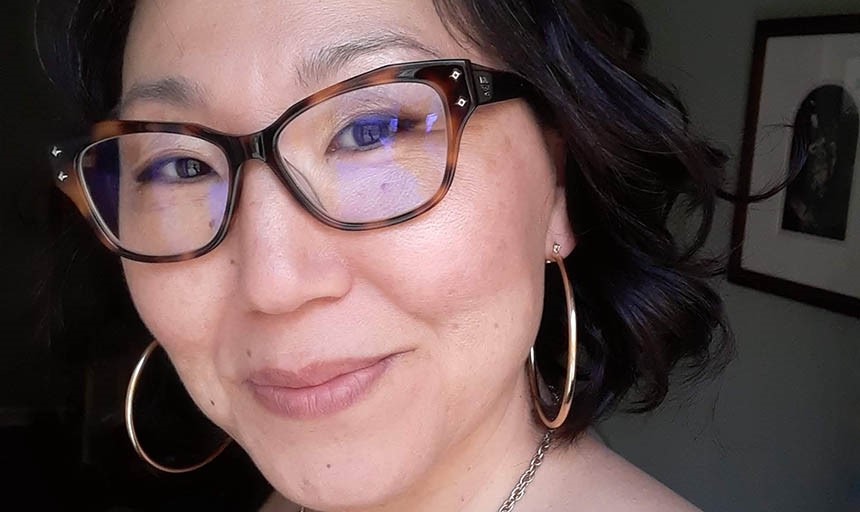
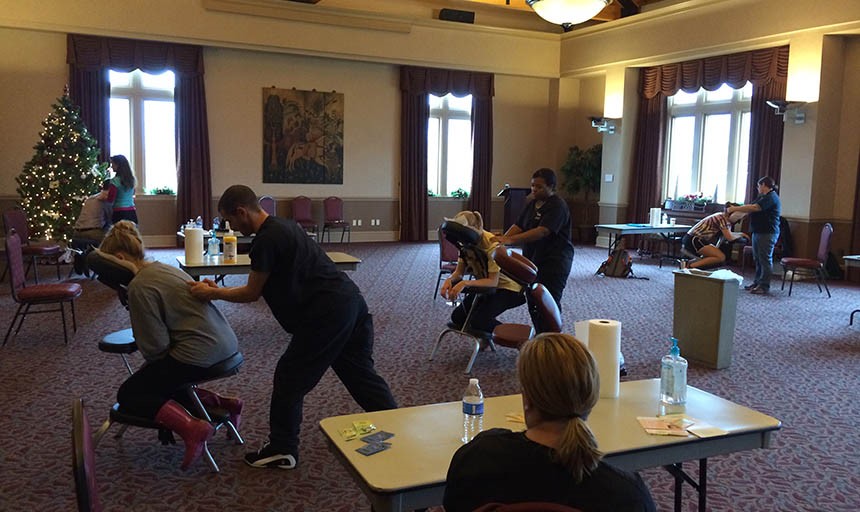
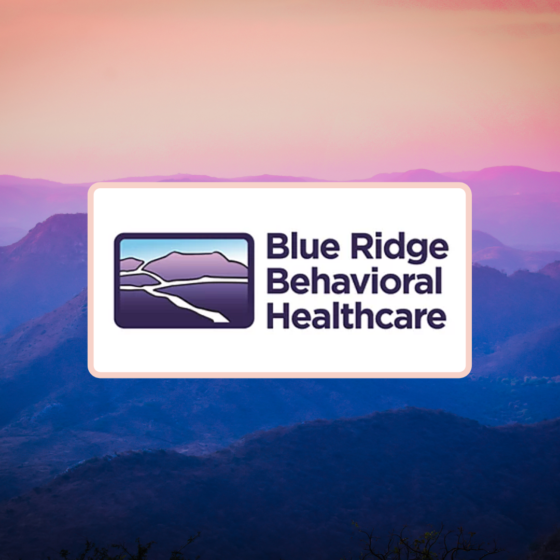
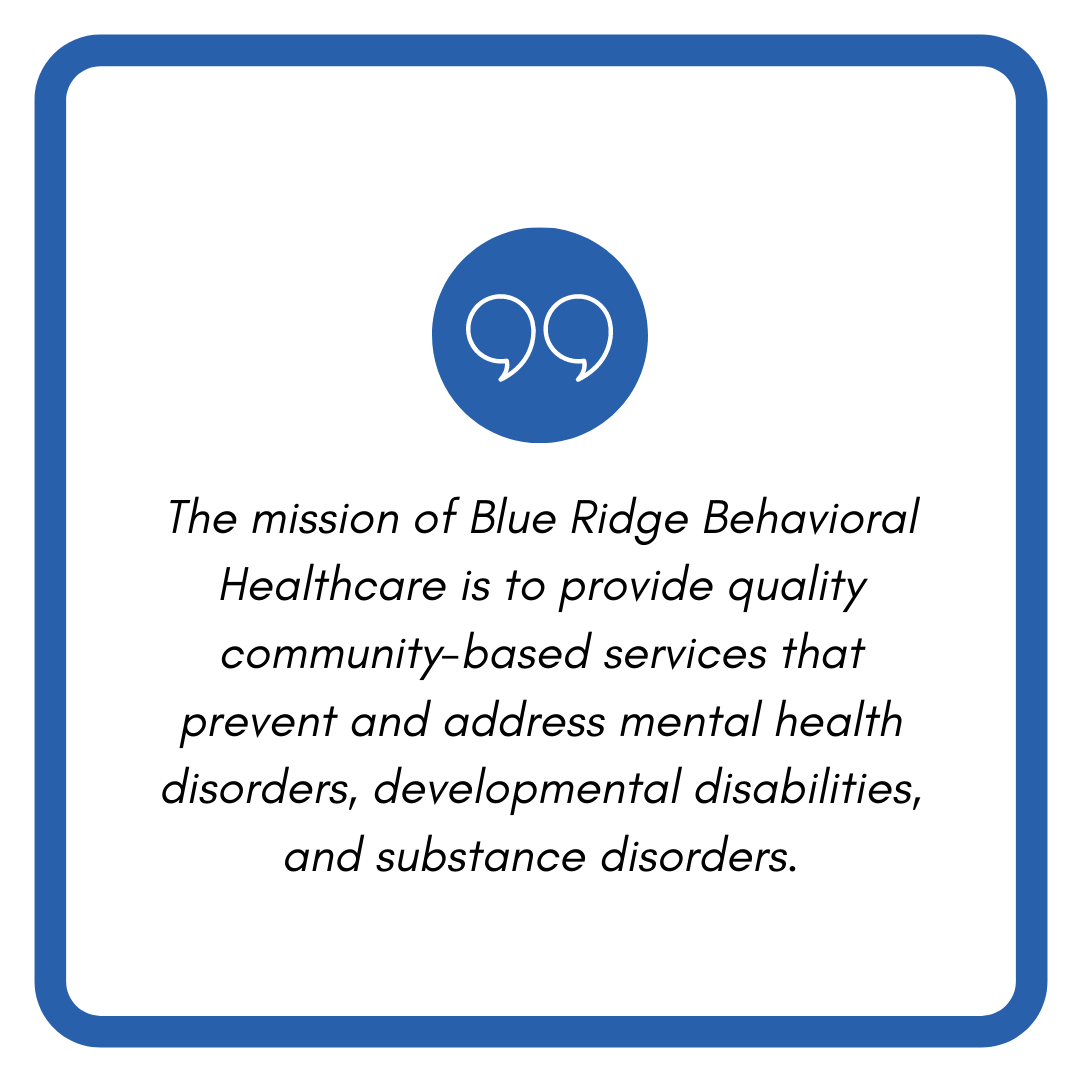
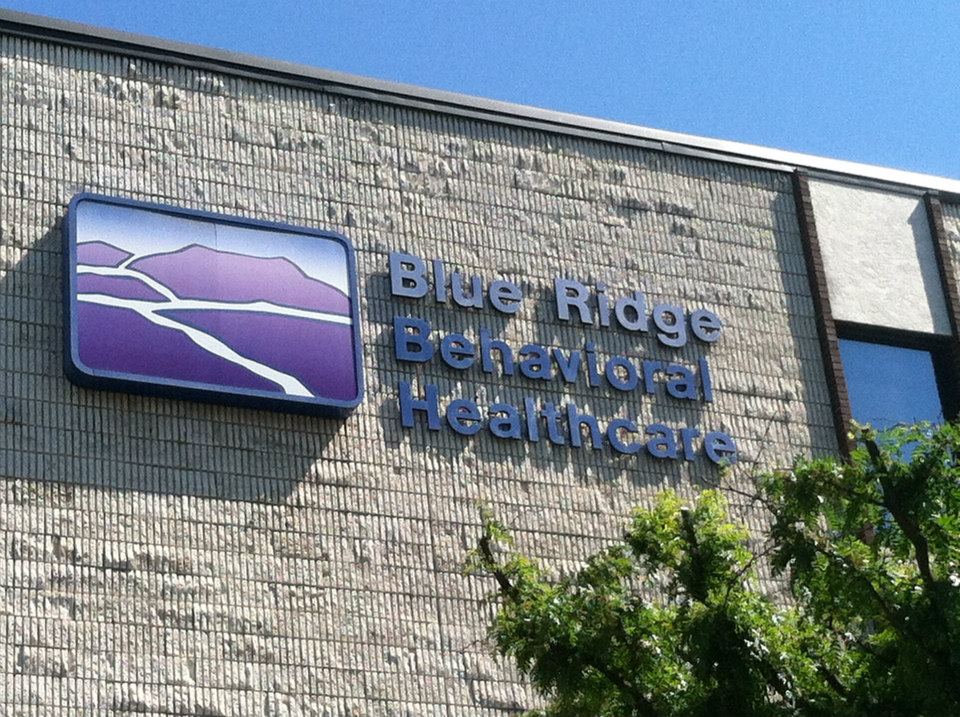


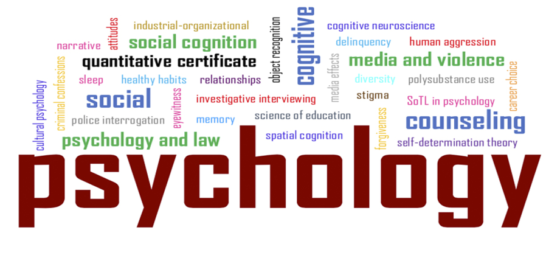

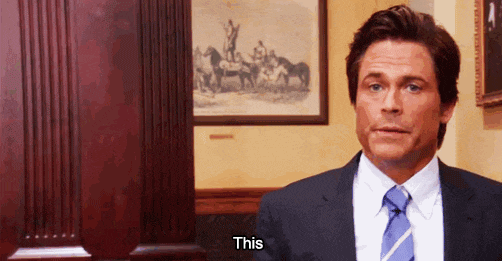

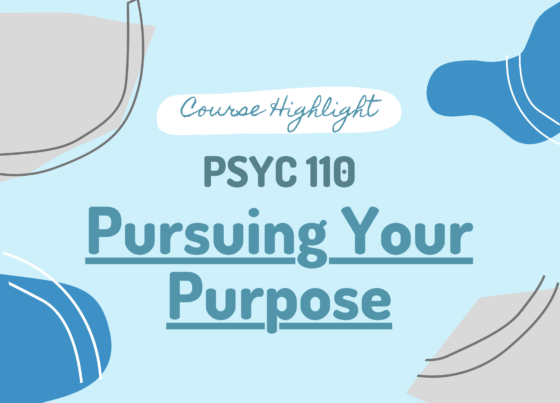

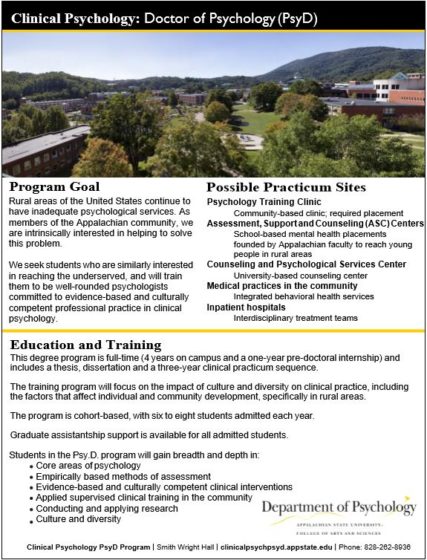
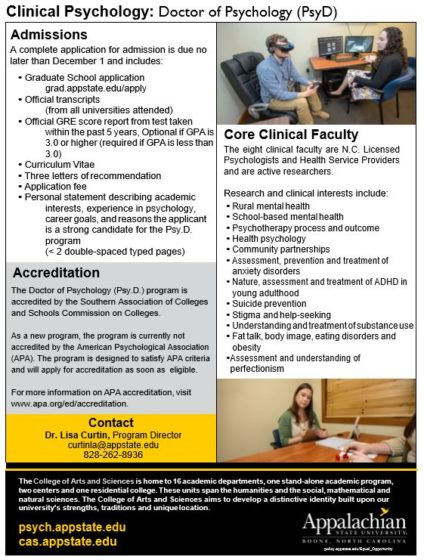

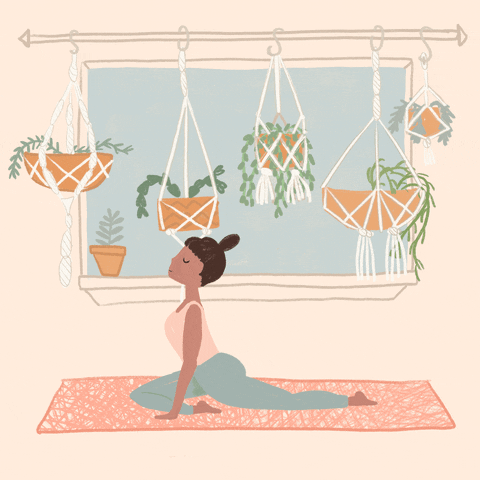
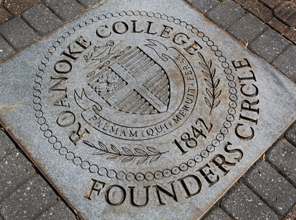
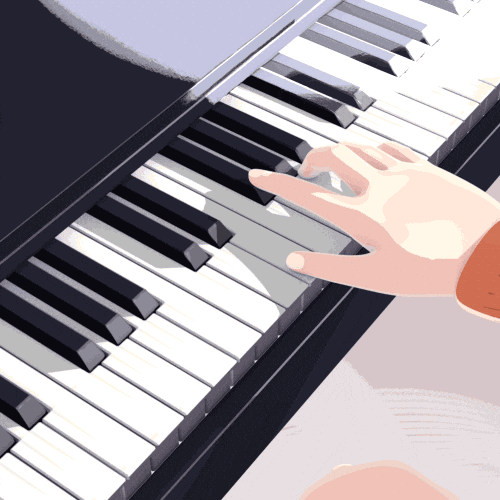
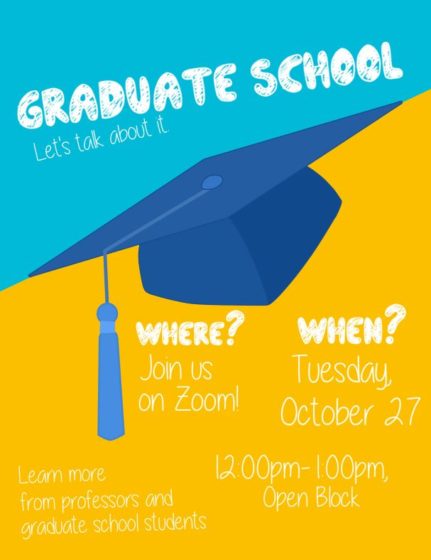
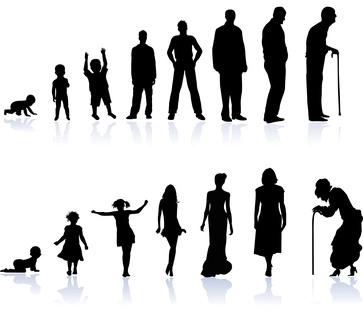
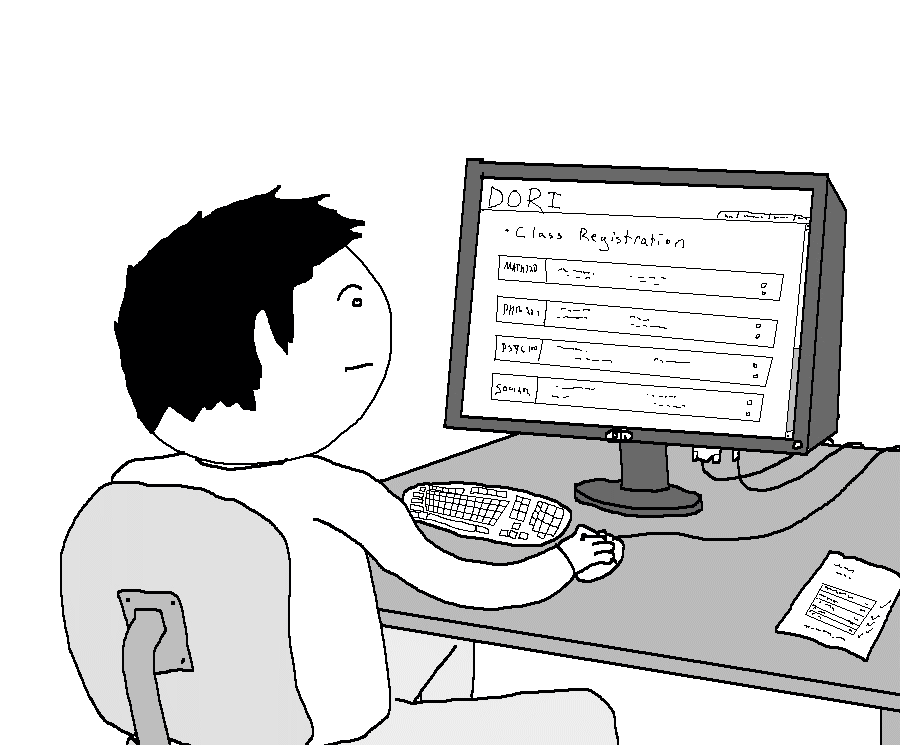
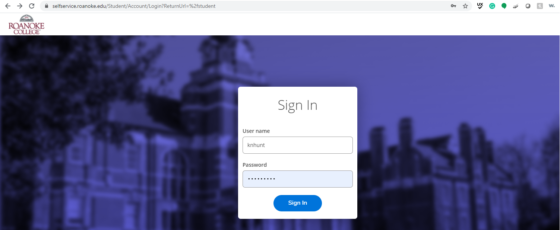
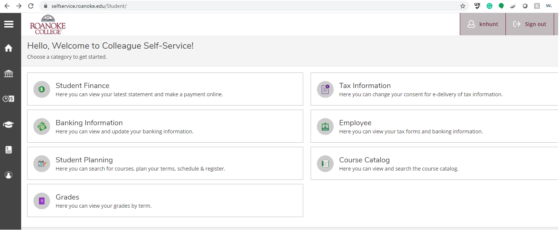

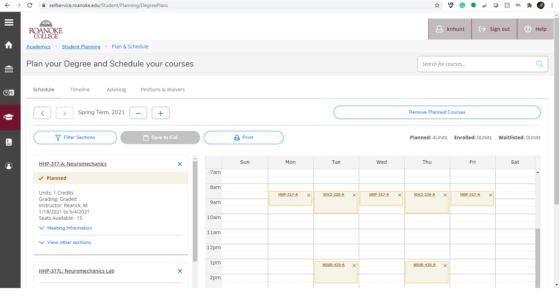
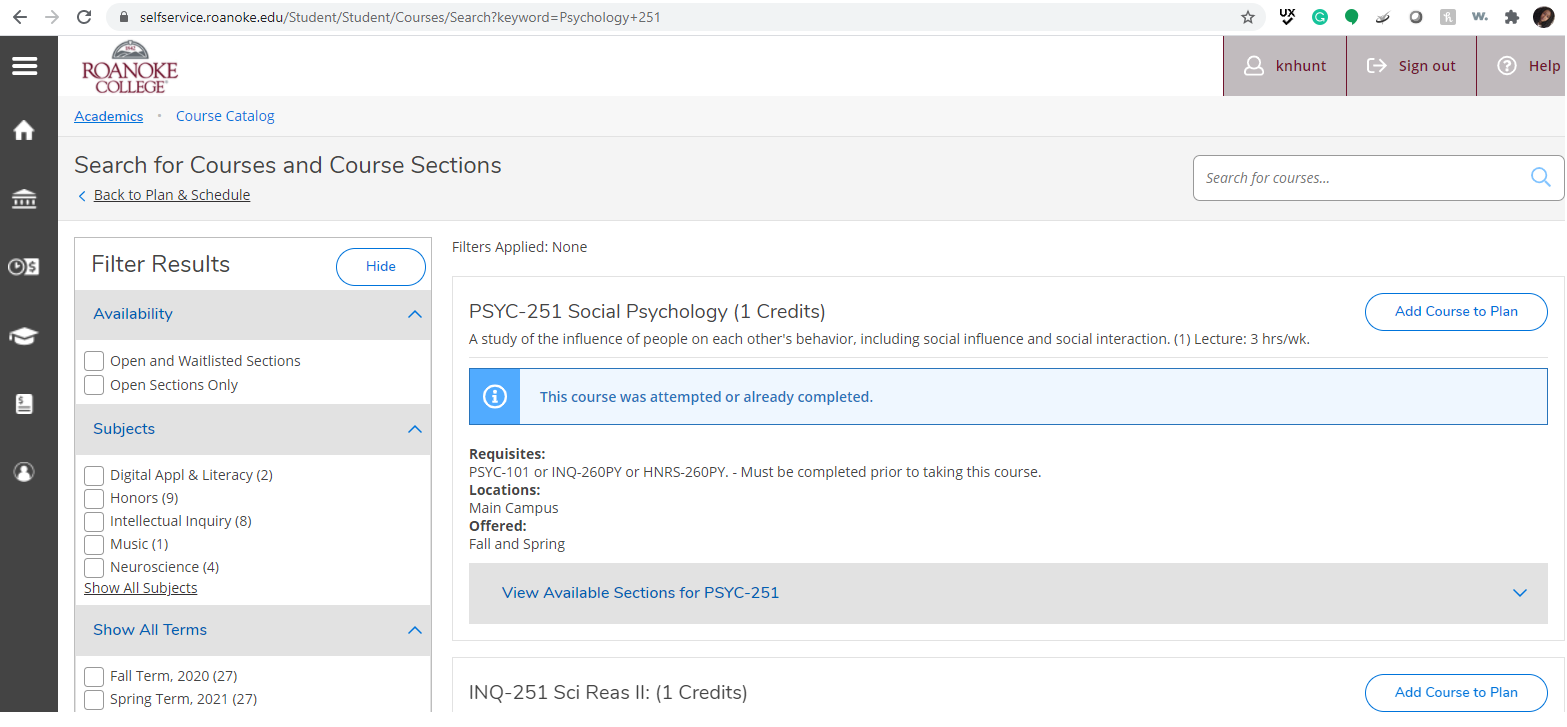
 You do not need to have your future plans set in stone at any point during your college career, but it may be good to start considering different options and creating plans around those options. That is, look at what courses you will need to take to complete your major/minor/concentration and roughly layout when you will take them. Moreover, consider what you do and do not want to do while in college (e.g., internships, research, study abroad, etc.). This initial planning stage will help you in the long run but is not limited to those in their freshman year.
You do not need to have your future plans set in stone at any point during your college career, but it may be good to start considering different options and creating plans around those options. That is, look at what courses you will need to take to complete your major/minor/concentration and roughly layout when you will take them. Moreover, consider what you do and do not want to do while in college (e.g., internships, research, study abroad, etc.). This initial planning stage will help you in the long run but is not limited to those in their freshman year.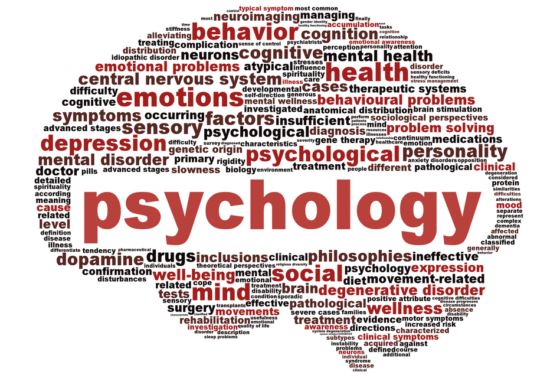
 If you are looking to enter into a graduate program or a specific job, look at the application requirements and deadlines early on. Even if you have no idea where you want to go or what you want to do, looking into different programs and seeing what they require of applicants is a good start. In doing so, you may find that multiple programs are expecting similar requirements such as research experience or a GRE score. In noticing these commonalities, you can adjust what you are doing to ensure you complete these items on time.
If you are looking to enter into a graduate program or a specific job, look at the application requirements and deadlines early on. Even if you have no idea where you want to go or what you want to do, looking into different programs and seeing what they require of applicants is a good start. In doing so, you may find that multiple programs are expecting similar requirements such as research experience or a GRE score. In noticing these commonalities, you can adjust what you are doing to ensure you complete these items on time.


 While studying abroad is not for everyone, it is a great experience that not only enhances cultural knowledge but leads to self-development. Studying abroad offers a lot of self-development that can be beneficial and will look notable when applying to jobs or graduate programs. There are a variety of study abroad options available, and if you plan ahead early, you can ensure that courses you take while abroad can fill requirements you may need, as well as find a semester where studying abroad works best for you.
While studying abroad is not for everyone, it is a great experience that not only enhances cultural knowledge but leads to self-development. Studying abroad offers a lot of self-development that can be beneficial and will look notable when applying to jobs or graduate programs. There are a variety of study abroad options available, and if you plan ahead early, you can ensure that courses you take while abroad can fill requirements you may need, as well as find a semester where studying abroad works best for you.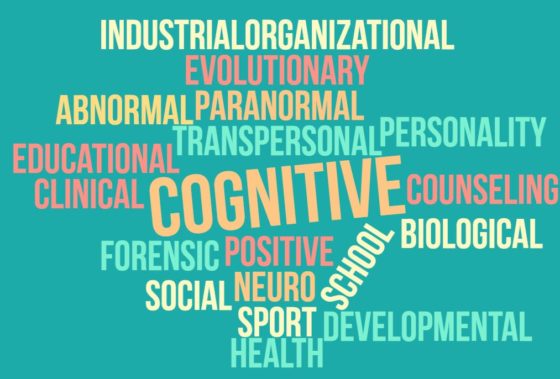
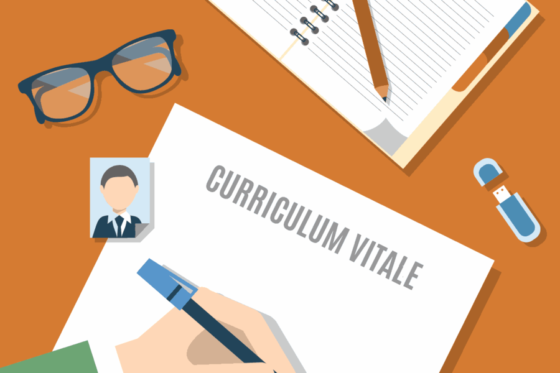


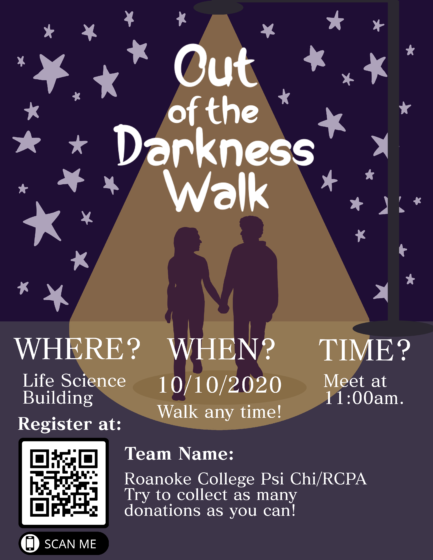 Each year, Roanoke College is proud to host the Out of the Darkness Walk for suicide prevention and mental health awareness. While much of this year looks different, Psi Chi and RCPA are proud to continue to host this event.
Each year, Roanoke College is proud to host the Out of the Darkness Walk for suicide prevention and mental health awareness. While much of this year looks different, Psi Chi and RCPA are proud to continue to host this event.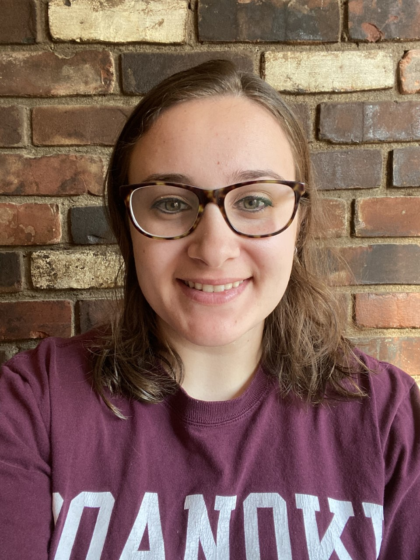


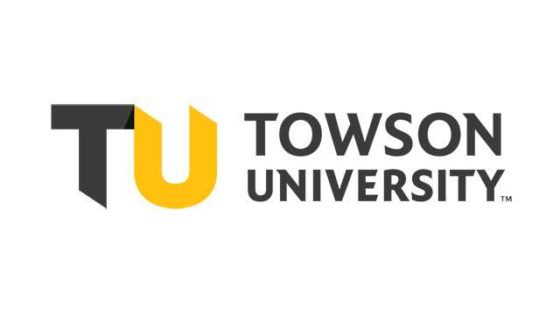
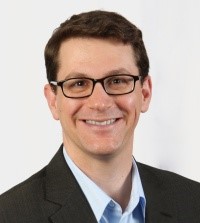
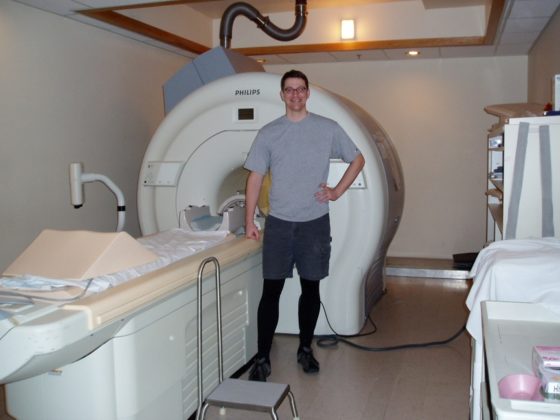
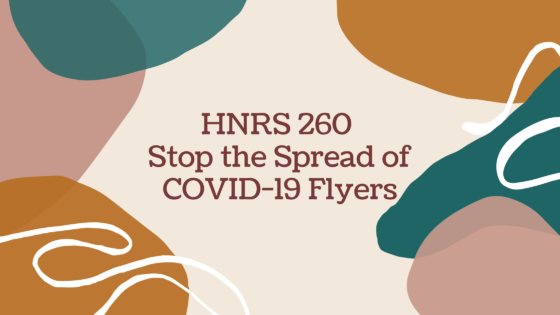
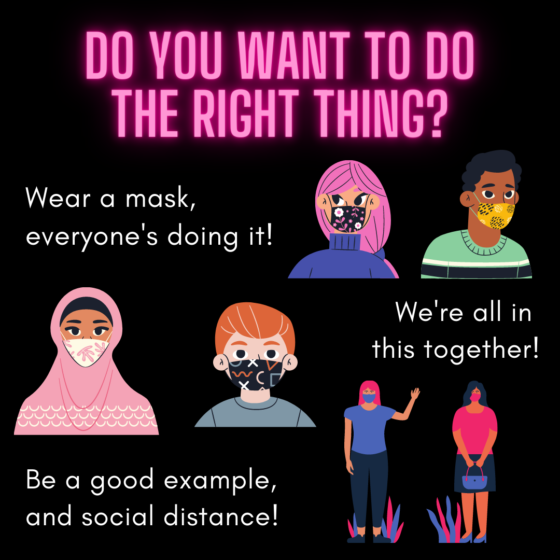
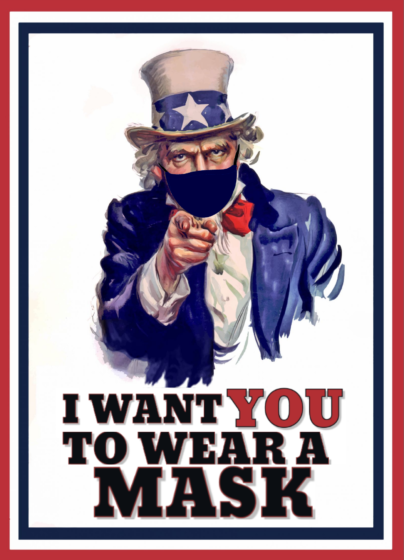
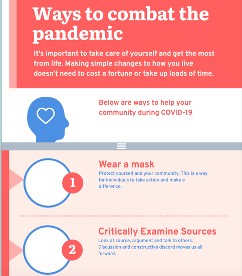
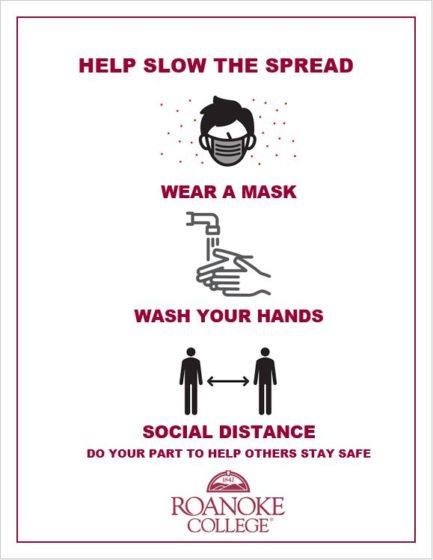

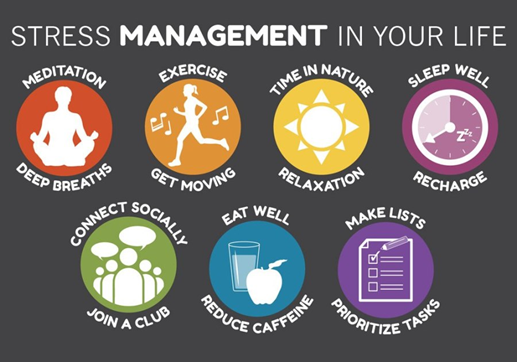
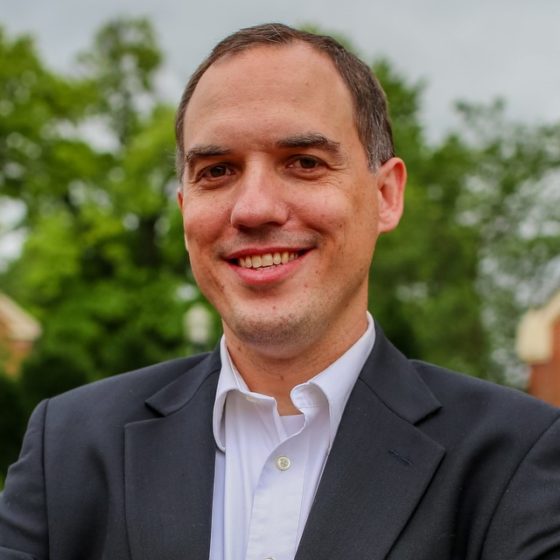

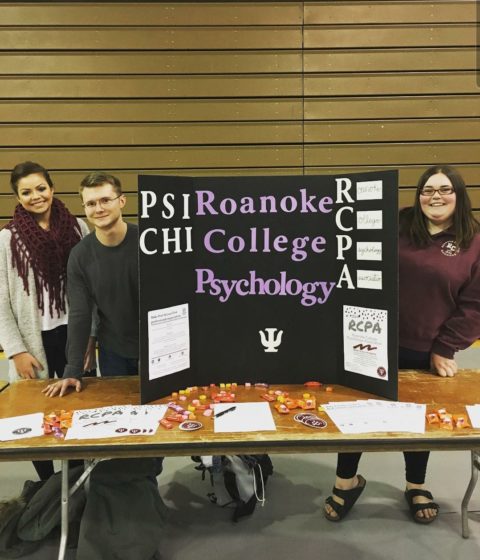

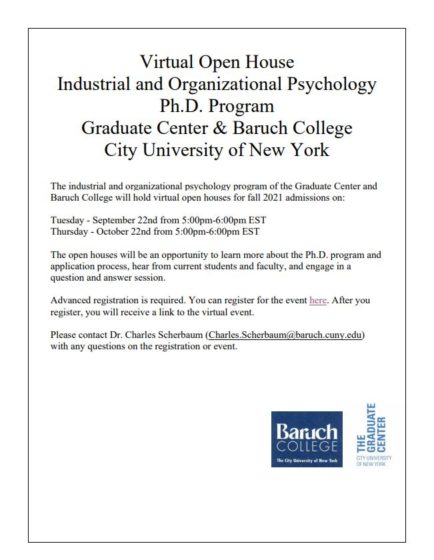
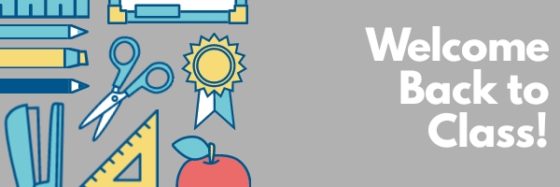
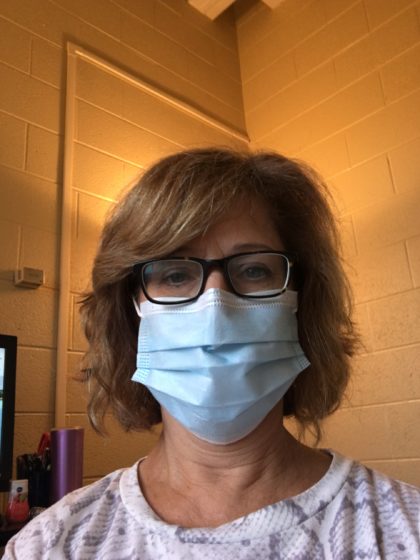
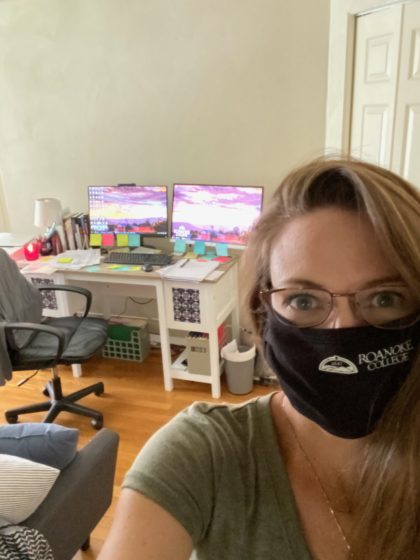
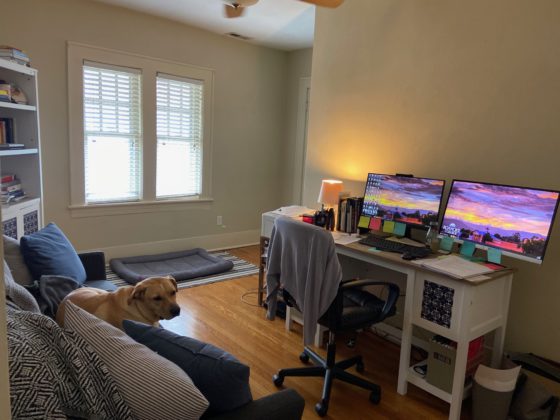
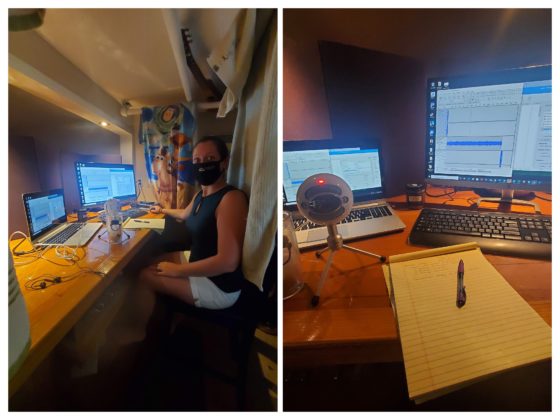
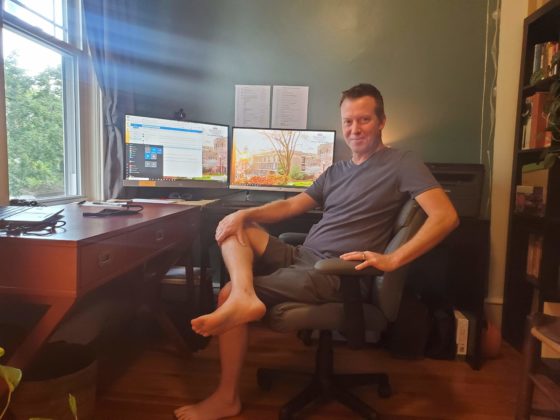
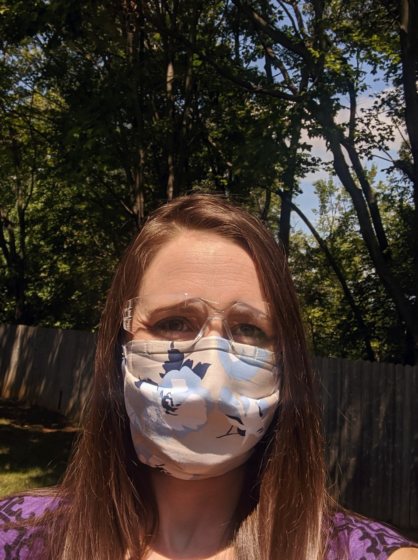
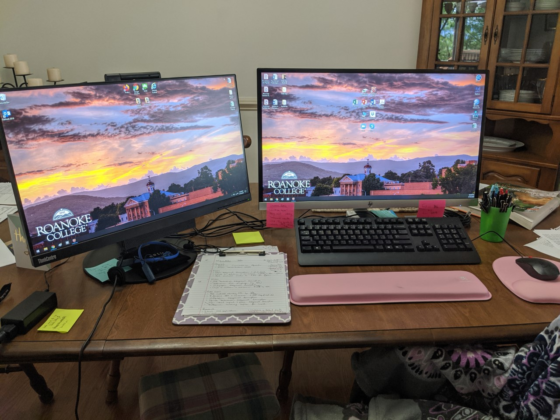
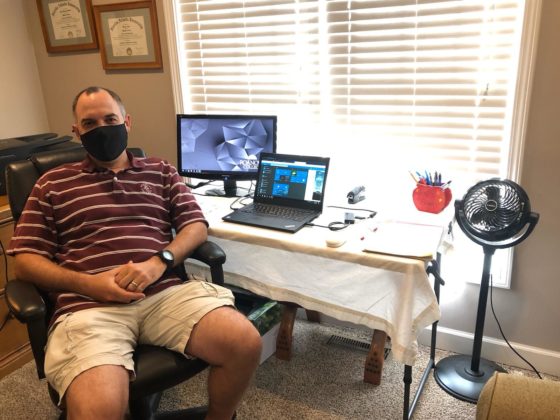
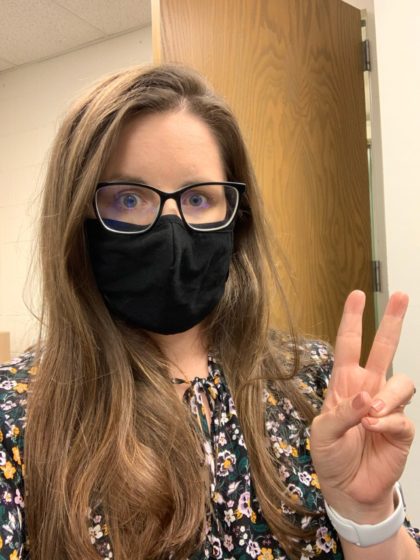
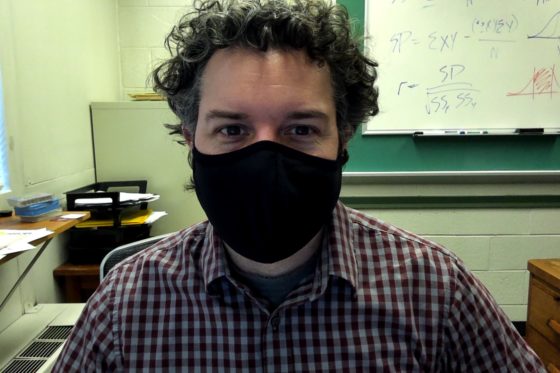
 We would like to invite you to be in a research study focused on sharing information in online dating that would take no more than fifteen minutes of your time. We ask participants are between eighteen and twenty-five. Participants who provide contact information are eligible to enter a raffle for a ten dollar gift card. Click on the link below to get started!
We would like to invite you to be in a research study focused on sharing information in online dating that would take no more than fifteen minutes of your time. We ask participants are between eighteen and twenty-five. Participants who provide contact information are eligible to enter a raffle for a ten dollar gift card. Click on the link below to get started! On February 27-29
On February 27-29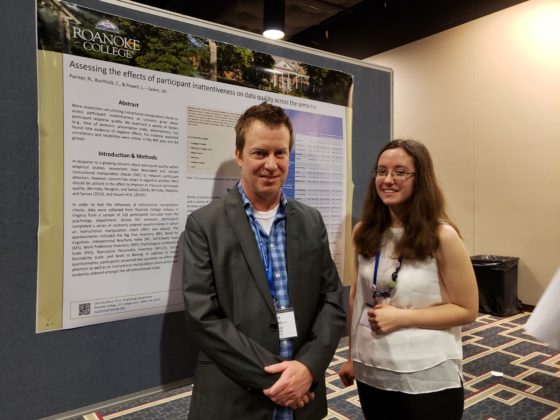
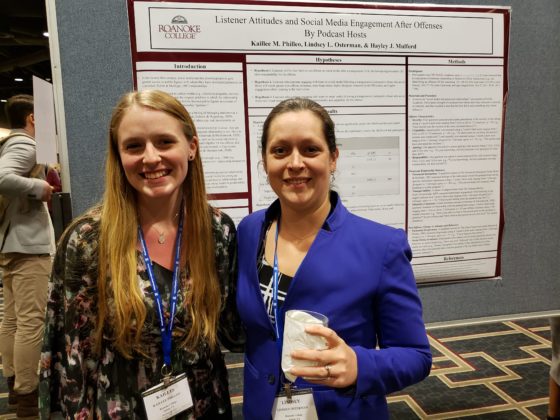
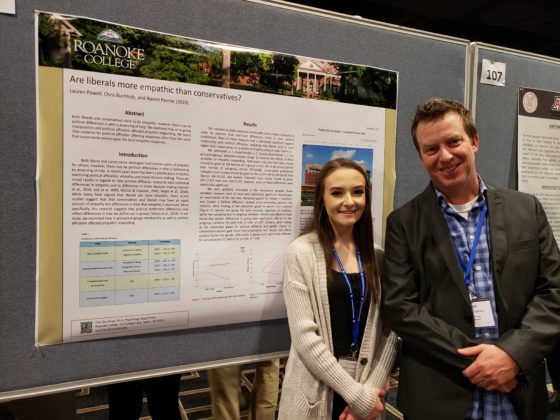

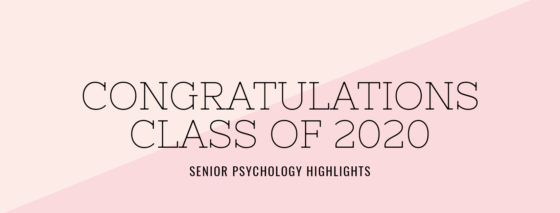 Over the next few days, we will be highlighting the Psychology Department graduating seniors! This post will highlight 4 seniors: Ryen Beach, Sophia Bacon, Athey Crump, and Emily Deeds!
Over the next few days, we will be highlighting the Psychology Department graduating seniors! This post will highlight 4 seniors: Ryen Beach, Sophia Bacon, Athey Crump, and Emily Deeds!